You must turn on JavaScript in order to use this website.
You are using an outdated browser and some features of this website may not work correctly. Please upgrade your browser to improve your experience.
- (888) 777-9102
- Learning Center

- How It Works
- All Packages & Pricing
- I-90 Application to Replace Permanent Resident Card
- I-129F Petition for Alien Fiancé
- I-130 Petition for Alien Relative
- I-131 Application for Travel Document
- I-485 Adjustment of Status Application
- I-751 Remove Conditions on Residence
- I-765 Application for Employment Authorization
- I-821D DACA Application Package
- I-864 Affidavit of Support
- N-400 Application for Naturalization
- N-565 Application to Replace Citizenship Document
- Citizenship Through Naturalization
- Citizenship Through Parents
- Apply For Citizenship (N-400)
- Apply for Certificate of Citizenship (N-600)
- Replace Citizenship Document (N-565)
- Apply for a Green Card
- Green Card Renewal
- Green Card Replacement
- Renew or Replace Green Card (I-90)
- Remove Conditions on Green Card (I-751)
- Green Card through Adjustment of Status
- Adjustment of Status Application (I-485)
- Affidavit of Support (I-864)
- Employment Authorization (I-765)
- Advance Parole Application (I-131)
- Adjustment of Status Fee
- Family-Based Immigration Explained
- Search the Learning Center
- Request Support
- Find an Immigration Attorney

Home » Guide to Form I-94, Arrival/Departure Record

Form I-94, Arrival/Departure Record
Form i-94 explained, what is form i-94, arrival/departure record.
U.S. Customs and Border Protection (CBP) issues Form I-94, Arrival/Departure Record , to certain foreign nationals at the time of entry. They do not issue an I-94 arrival/departure record to U.S. citizens, permanent residents (green card holders), returning resident aliens (SB-1 visa holders), or most Canadian citizens visiting or in transit. USCIS may also issue a Form I-94 as part of granting a foreign national an extension of stay or change of status. All other foreign nationals should be aware of their I-94 when:
- Admitted to the U.S.;
- Adjusting status while in the U.S.; or
- Extending their stay.
The purpose of Form I-94 is to communicate the terms of a foreign national's visit to the United States. It indicates information such as admission category and the expected departure date. But it also serves as proof of a non-citizen's lawful entry to the U.S. It's an essential document when applying for many other immigration statuses.
Foreign nationals who visit the United States through the Visa Waiver Program do not get Form I-94. Instead, they receive Form I-94W (Nonimmigrant Visa Waiver Arrival/Departure Record).
How to Find Your Arrival/Departure Record
Where to get form i-94.
Most people can retrieve their I-94 arrival/departure record online from a U.S. Customs and Border Protection (CBP) website. However, CBP continues to issue paper-based arrival/departure records for some situations.
There’s no need to request an I-94. CBP automatically issues the electronic I-94 at entry through an airport or seaport. If you entered through a border crossing, CBP generally issues a paper Form I-94 with some exceptions as described below.
Electronic I-94 Record
Since May 2013, U.S. Customs and Border Protection has automatically issued an electronic Form I-94 to travelers entering at air and sea ports. However, CBP doesn't issue the electronic I-94 directly to the traveler. Travelers must go to CBP’s I-94 website to obtain the electronic I-94 arrival/departure record. From here, you can print a document for your records.
The website also includes travel history from the previous 10 years of arrivals and departures. The travel history is an informational tool; it is not an official record for legal purposes.
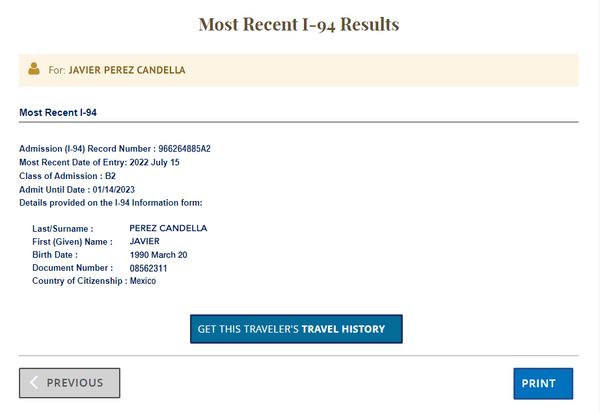
Paper I-94 Record
Prior to May 2013, all foreign visitors received a paper I-94 arrival/departure record much like the sample. However, CBP continues to issue paper I-94 records in certain situations.
Since electronic I-94 arrival/departure records are only issued at air and sea ports of entry, a paper Form I-94 is still issued at the land border ports of entry. CBP also continues to provide a paper Form I-94 to certain classes of aliens, such as refugees, certain asylees and parolees, and whenever CBP determines the issuance of a paper form is appropriate.
Travelers can speed up their entry into the U.S. by providing their biographic and travel information, and paying the $6 fee for their I-94 application online up to seven days prior to their entry. You'll receive a provisional I-94 after submitting your application and payment.
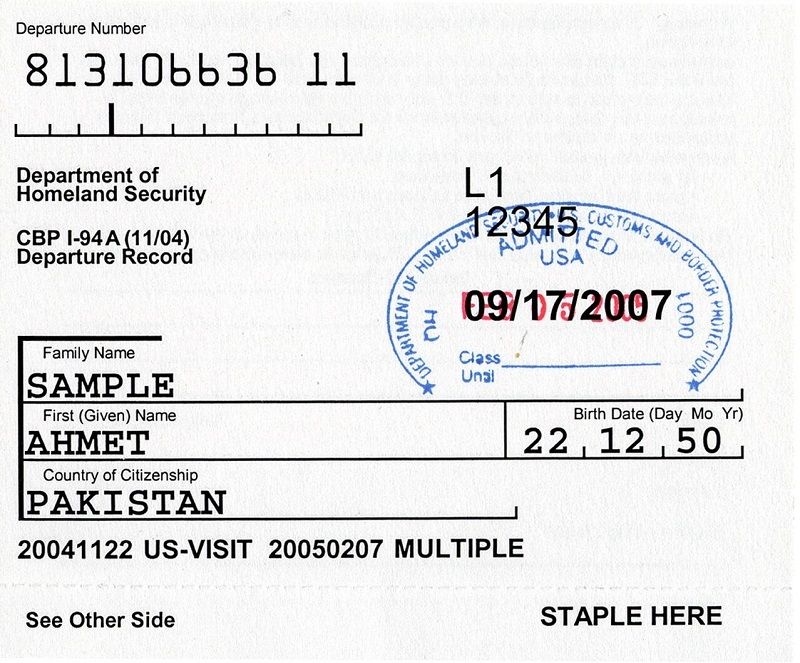
Anatomy of an I-94
What does form i-94 look like.
The arrival/departure record contains important information regarding a foreign national's visit to the United States. The information is critical to knowing the extent of your authorized stay and staying "in status." The highlighted fields below are commonly needed when applying for certain immigration benefits. On the CBP website, you may print a copy like the sample Form I-94 below.
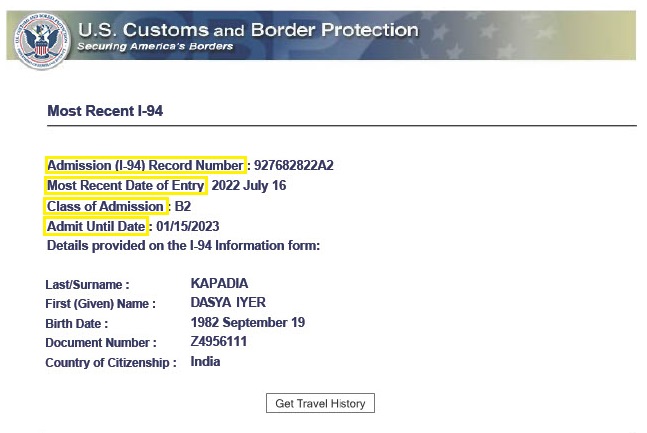
Admission (I-94) Record Number : Also known as the I-94 Number, Departure Number or Admission Record Number, it is an 11-character alphanumeric number. It provides a unique number for reach entry. Most Recent Date of Entry : This date should reflect the exact date that you were admitted to the United States. This can vary slightly from the date you physically entered the country if your inspection was outside the United States. Class of Admission : This code describes your category of nonimmigrant status. For example, it may indicate B-2 for leisure visitor or F-1 for student. Admit Until Date : This is the day your immigration status expires in the U.S. You must exit the U.S. on or before the Admit Until Date. For students and other exchange visitors, this date is “D/S” or Duration of Status. For other visa classifications, this will be a hard end date.
I-94 Troubleshooting Tips
What can i do if the cbp site doesn't find my record.
If you are having difficulty finding your electronic I-94 record using CBP's I-94 website , the American Immigration Lawyers Association recommends using the following troubleshooting tips:
- Enter the name as stated on your travel document (i.e. passport). If you are not successful using the passport, try using your visa or the submitted Form DS-160 (if available) for name variations. Try entering the name as stated on each document.
- Enter the first and middle name in the First Name field. In the first name field, type the first and the middle name (if any) with a space in between. Do this even if the middle name is not stated on the passport or visa.
- If this is not successful, try to switch the order of the names. Switch the last and first name when entering the information on the website. Some countries state the name in the passport as first name, last name, rather than the more standard order of last name, first name. This may cause the name to be recorded incorrectly in the CBP system.
- Enter multiple first names or multiple last names without spaces. If a person has two first names or two last names, type the first names without a space between them or the last names without a space between them. Example: type the first names “Mary Jane” as “Maryjane.”
- Check for multiple passport numbers. Check the Form DS-160 (if available) for the passport number stated. If the passport number on the Form DS-160 is different than the passport number on which the person was admitted, type the passport number as stated on the submitted Form DS-160. Also, check the passport number stated on the visa. If the passport number is different than the current passport, enter the passport number stated on the visa.
- Do not enter the year if included in the passport number. Some passport numbers may begin with the year in which the passport was issued, causing the number to be too long for the relevant field in CBP’s automation system. If relevant, try entering the passport number without the year. For example, a Mexican passport that was issued in 2008 may have a passport number that starts with “08” followed by nine digits. Try entering the passport number without the “08.” This problem should not arise for newer Mexican passports, as those passports do not begin with the year.
- Check the classification designated on the visa and compare it to the classification stated on the admission stamp in the passport, as there may be a slight variation. Be sure to try both designations. For example, the visa may state “E-3D” for an E-3 dependent, but the admission stamp may state only “E-3.” The automated I-94 could state the classification either way.
If none of the above efforts resolve the issue in locating your electronic I-94 record, telephone or visit a CBP Deferred Inspection Office and explain the problem. Over the years, we've seen several cases with visitors who were never issued a record. Contact the CBP with your flight information. Some of the Deferred Inspection Offices have been able to resolve the problem over the phone without an in person visit; however, other offices may require an in-person visit with the non-citizen.
Fixing an Incorrect Form I-94
What do i do if my arrival/departure record has incorrect information.
If you have an incorrect I-94 record, there is generally a way to fix it. A misspelled name or incorrect entry date may lead to confusion on other applications. Both Customs and Border Protection and U.S. Citizenship and Immigration Services (USCIS) may issue a Form I-94, Arrival/Departure Record. If a mistake was made by you or the government, you’ll need to correct it.
Correct an Arrival/Departure Record Issued by CBP
If Customs and Border Protection (CBP) issued your I-94 record, you'll need to visit the CBP Deferred Inspection Office closest to your location. Most foreign nationals receive an I-94 from CBP at the time of entry in one of the following ways.
- Electronic I-94 : Issued to the vast majority of foreign national visitors at air and sea ports of entry.
- Paper I-94 : Issued at land border ports of entry and to certain classes of aliens, such as refugees, certain asylees and parolees, and whenever CBP determines that issuance of a paper form is appropriate.
Sometimes CBP may issue an incorrect I-94. Common errors include incorrect entry dates or misspelled names. In many cases, these errors can easily be corrected. If you arrived at an airport, you can generally contact the CBP office inside the airport and request a correction.
When the airport does not have a CBP office, contact the closest CBP Deferred Inspection Site or call CBP at 1-877-CBP-5511 (1-877-227-5511). You may be required to visit the office with documentation (passport and visa) and your incorrect I-94 record.
Correct an Arrival/Departure Record Issued by USCIS
In some cases, USCIS issues a Form I-94 as part of granting a foreign national an extension of stay or change of status. If USCIS issued your Form I-94, you will need to file a Form I-102, Application for Replacement/Initial Nonimmigrant Arrival-Departure Document .
When filing Form I-102 due to an incorrect I-94 record, you will need to submit a filing fee and supporting documentation that provides proof of the correct information. Attach a statement dated and signed by you, explaining specifically what information on your I-94 record is incorrect. You must also attach evidence verifying the validity of the information submitted for correction purposes. Finally, you must submit your original, incorrect I-94 with the I-102 application.
If the mistake on your Form I-94 record is due to a USCIS error, you'll need to request a correct I-94 through an Infopass appointment at your local USCIS office. Schedule an appointment by calling 1-800-375-5283. Take your original, incorrect I-94 record and evidence of the error to your appointment. USCIS will correct the I-94 at no cost. If you are unable to prove that the mistake was made by USCIS, you will be advised to file Form I-102 with a fee.
Replacing an I-94 Arrival/Departure Record
What do i do about a lost i-94.
If you have a lost, stolen, mutilated, or destroyed Form I-94, Arrival/Departure Record, it is possible to replace it. Before you start, it’s helpful to know if you have an electronic or paper I-94. Knowing this will help determine how to replace the Arrival/Departure Record. Replacing an electronic version is a simple matter. However, replacing paper I-94 records can take several months and generally require a filing fee.
Replace an Electronic Travel Record
Modern I-94 Arrival/Departure Records are available electronically if the foreign national traveled by air or sea. An electronic I-94 can be obtained by going to the CBP I-94 website .
"Replacing" an electronic I-94 form is easy and free. Simply return to the CBP I-94 website and enter the necessary information to lookup your Arrival/Departure Record. You may print the electronic I-94 for when submitting with USCIS applications.
Replace a Paper Travel Record
Before CBP issued I-94 records electronically, they provided a paper form to foreign nationals arriving to the United States. In fact, CBP continues to issue paper Form I-94 at land border ports of entry and to certain classes of aliens, such as refugees, certain asylees and parolees, and whenever CBP determines that issuance of a paper form is appropriate. A paper-based version of the arrival/departure record is labeled "Form I-94A."
Replacing a paper I-94A form is a little more complicated. You will need to file a Form I-102, Application for Replacement/Initial Nonimmigrant Arrival-Departure Document . File the form with USCIS along with a $445 filing fee (at the time of writing this) and supporting documentation.
Frequently Asked Questions
Do not confuse Form I-94 with a visa. They are closely related, but they are different.
The visa is an entry document. It must be valid when seeking admission into the United States. The I-94 (arrival/departure record) is a status document. It describes the foreign national's visa or parole status once inside the United States, and it also defines the length of stay permitted. Once a foreign national visitor is admitted to the United States, dates on the visa do not define how long the traveler is allowed to stay. Instead, the I-94 is the controlling document. Therefore, it's an extremely important document.
Your I-94 can expire, but make sure you are looking at the correct date. On an electronic document, you may see three dates:
- OMB Expiration Date: The first date in the top right-hand corner is the Office of Management and Budget (OMB) form expiration date. All government forms include OMB dates. The OMB validity date changes periodically and an expired OMB date does not invalidate the I-94 record or form. OMB dates are not related to a non-immigrant’s status in the U.S.
- Most Recent Date of Entry: Like it sounds, this is the most recent date that you entered the U.S.
- Admit Until Date: This is an extremely important date. The Admit Until Date is the date that your status expires. For students and other exchange visitors, this date is “D/S” or Duration of Status. For other visa classifications, this will be a hard end date. You must leave by this date or you will be in violation of your status.
There is no fee for the I-94 form. That’s true whether you’re arriving by land, air, or sea, and regardless of whether you get a paper or electronic record. The government provides the form at no cost.
However, you can optionally apply online for a provisional I-94 one week or less before your arrival date if you’re arriving at a land border port of entry. Applying for a provisional I-94 costs $6, but doing this can streamline the arrival process and minimize the time you spend waiting in line at the border.
How CitizenPath Helps You
Why is immigration so complicated.
CitizenPath's affordable, online service makes it easy to prepare USCIS immigration forms. Designed by immigration lawyers, the award-winning service helps you eliminate the common errors that create delays, rejections and even denials. That's because the service alerts you when your answer to a question may be a problem. You'll also get customized filing instructions based on your situation. It's a powerful, do-it-yourself tool that puts you in control. And we've got your back. CitizenPath provides live customer support and provides a money-back guarantee that USCIS will approve your application.

What Customers Say About CitizenPath
Immigration Form Guides Form I-90 Form I-129F Form I-130 Form I-131 Form I-131A Form I-134 Form I-485 Form I-751 Form I-765 Form I-821D Form I-864 Form N-400 Form N-565 Form N-600
Sign Up to Receive Free Monthly Information for Your Immigration Journey
© Copyright 2013-2024, CitizenPath, LLC. All rights reserved. CitizenPath is a private company that provides self-directed immigration services at your direction. We are not affiliated with USCIS or any government agency. The information provided in this site is not legal advice, but general information on issues commonly encountered in immigration. CitizenPath is not a law firm and is not a substitute for an attorney or law firm. Your access to and use of this site is subject to additional Terms of Use .

Immigration help for your business
- News & Reports
- Guides: Individual immigration
Form I-94, Explained
How the i-94 arrival/departure record keeps track of your travel history — and why it matters, in this guide.
- What is the Form I-94?
- Easy. Online. Immigration.
- Who Needs an I-94 Form?
- How Do I Get an I-94 Card?
- Understanding the I-94 travel history
- I-94 arrival-departure record number
- How Much Does the I-94 Form Cost?
- Form I-94 FAQs
- Related Articles
Form I-94 (Arrival/Departure Record Card) is a crucial document U.S. Customs and Border Protection (CBP) issues to track people entering and exiting the United States. Here’s why it’s important:
- It serves as proof that you entered the country legally as a non-citizen or lawful permanent resident.
- It specifies the date by which you must depart the U.S. This is especially important for non-immigrants, such as students or scholars, whose stay is limited to a specific period.
- The I-94 document also indicates the authorized duration of your stay in the U.S., which can be helpful for employers who are verifying your employment eligibility.
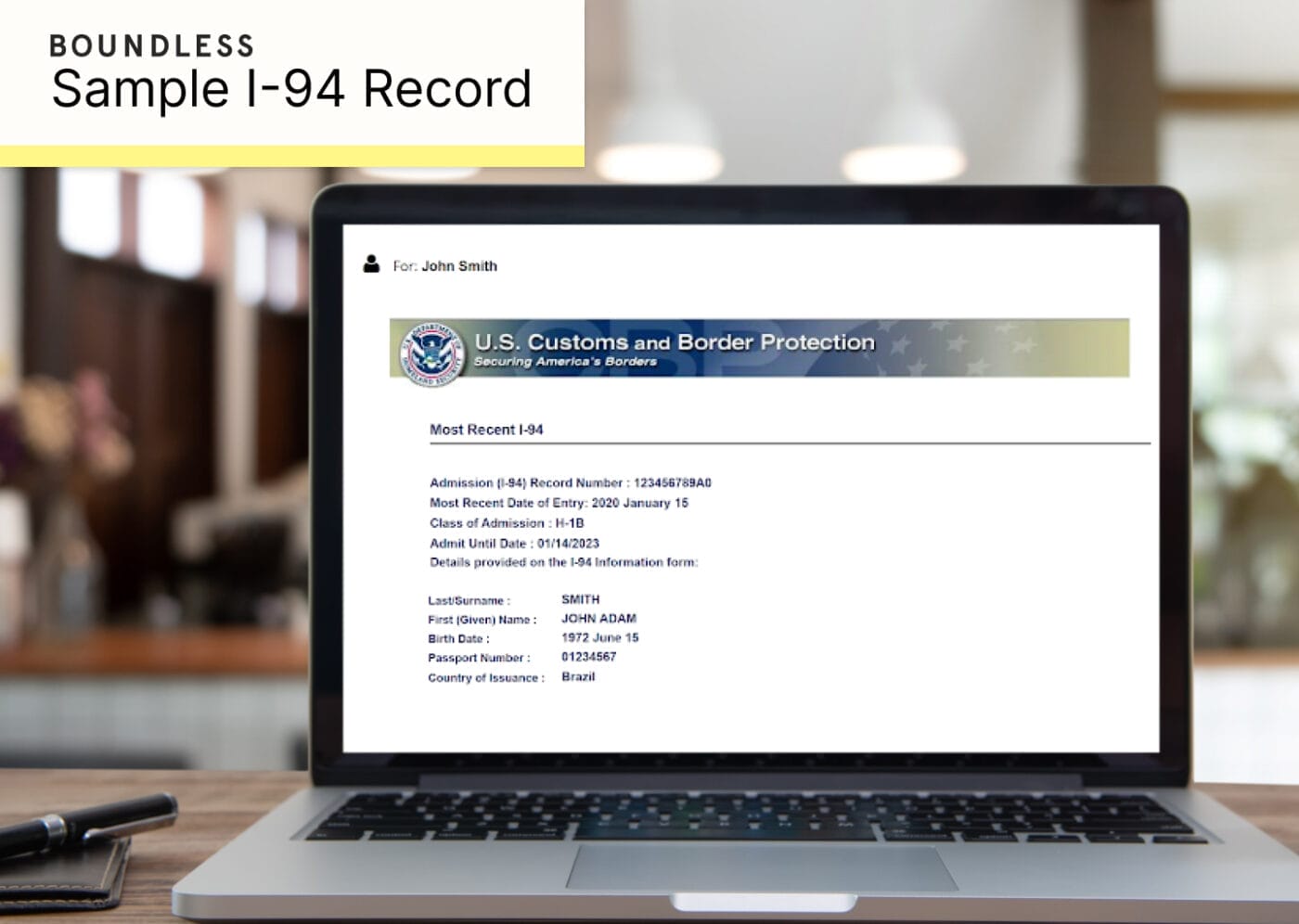
Historically, the I-94 was a small white paper card that visitors surrendered upon leaving the country. Currently, most visitors arriving by air or sea have electronic I-94 records . If you arrive by land, you may still receive a paper version. In this article, we’ll explain how it works.
Take our short visa planning quiz to get started.
Sponsoring a work visa? Learn about Boundless for Business.
Here’s a breakdown of who needs an I-94 form:
- Most people traveling to the U.S. who aren’t citizens: This includes tourists, students, temporary workers, exchange visitors, etc
- Individuals who are adjusting their status while in the U.S.
- Individuals planning to extend their current non-immigrant stay in the U.S.
- Non-citizens returning to the U.S.
You do not need an I-94 travel record if you are:
- A U.S. Citizen
- A Lawful permanent resident (green card holder)
- An individual with an immigrant visa
- A Canadian citizen visiting or in transit
- Travelers under the Visa Waiver Program (VWP); they get an I-94W instead, which is usually processed online
Most people entering the United States who are not U.S. citizens or lawful permanent residents get an I-94 travel record form automatically issued to them upon arrival.
Exceptions are made for those entering on the Visa Waiver Program or Compact of Free Association , using Border Crossing Cards , re-entering using automatic visa revalidation (a system used by some visa-holders who briefly visit Mexico, Canada, or the Caribbean), or entering temporarily as part of an airline flight crew.
Immigration Glossary
- Visa Waiver Program: A program that lets citizens of certain countries visit the U.S. for tourism or business for up to 90 days without needing a traditional visa.
- Border Crossing Cards: These cards function like visas for some Mexican citizens, allowing them to visit the U.S. for short periods.
- Automatic Visa Revalidation: A special rule that lets people with certain visas make quick trips to Canada, Mexico, or some Caribbean islands without needing a new visa to re-enter the U.S.
IMPORTANT: Some people who aren’t required to have an I-94 travel record must instead fill out Form I-94W (for visitors using visa waivers) or Form I-95 (for flight crew members). These forms have a similar purpose to a regular I-94. Upon arrival, check with the CBP Officer if you think this might apply to you.
The U.S. immigration system can seem complicated, but Boundless can guide you through the whole process from start to finish. Get started today!
How you get an I-94, depends on how you enter the U.S. If you enter by land, you’ll receive a paper I-94 card. If you enter by sea or air, you won’t receive a paper I-94 but will instead receive an electronic I-94 record.
Arriving by air or sea
Most visitors entering the U.S. by air or sea will have an electronic I-94 record automatically created for them when they go through customs. When you arrive in the United States, you’ll show your passport and visa to a CBP agent, who will enter your information into an electronic tracking system . They will then stamp your passport, to show you entered the U.S. lawfully.
You’ll probably receive printed instructions about how to access your electronic I-94, but using the CBP’s online system , you can easily view your travel record and download or print a copy for your records.
Arriving by land
If you arrive at a land border crossing, you’ll likely receive a small, white paper I-94 card. A CBP officer will fill it out and usually staple it into your passport. To save time at the border, you can apply for an I-94 before you come to the U.S. through CBP’s online system . Note, there is a $6 fee for this.
Whether electronic or paper, be sure to keep your I-94 safe. You will need to hand in the paper version when leaving the U.S., so the U.S. government can track your departure and know that you left the country before your visa expired. Also, you may need this form for things like applying for a driver’s license, getting a job, or changing your immigration status.
I-94 travel history is essentially a log of your past entries and exits when coming and going from the U.S. It’s tracked through your I-94 records. It includes details around the dates you arrived and departed from the U.S., the ports of entry and exit, your class of admission (e.g., your reason for visiting) such as tourism, student visa, etc. It also includes how long you were authorized to stay on each visit.
Both your stamped passport and your electronic or paper I-94 record will show your “ Admit Until Date ,” which shows how long you are allowed to remain in the United States. The CBP agent who stamps your passport may simply write “ Duration of Status ” or “D/S,” which indicates that you’re allowed to remain in the United States as long as your current visa remains valid.
Why it’s important
Your I-94 travel history can be important for several reasons:
- It shows that you have entered the country legally in the past.
- If you’re applying to change or adjust your immigration status, you may need to provide your I-94 travel history as supporting documentation.
- If there are any errors or issues with your immigration record, the travel history can help clarify them.
Where to find your I-94 travel history
You can access your I-94 travel history on the CBP website . You’ll usually see your last 5 years of travel history, but you can request a full history if needed.
If you extend your stay or adjust your status after arriving in the United States — such as by gaining a green card — then U.S. Citizenship and Immigration Services (USCIS) will issue a new I-94 or other documentation to reflect your new situation. In such cases, the new documentation will be your primary way of showing your lawful status.
Once CBP approves your lawful entry and issues the I-94 form, a unique code will be assigned to your record. This number is linked to a specific entrance and reason for visiting the United States, so you’ll receive a different I-94 number each time you arrive in the country. The number, which you can find on your paper I-94 card or on your electronic record, may sometimes be required by a state’s Department of Motor Vehicles (DMV), or your employer may need it for their records.
If you need to replace a Form I-94, you can do it on the CBP website or by calling CBP at 1-877-CBP-5511 (1-877-227-5511) Monday through Friday between 8:30 a.m. and 5:00 p.m., Eastern Time.
Until May 2019, I-94 numbers were an 11-digit string of numbers. Now, though, CBP has switched to using an 11-character alphanumeric code — a mix of numbers and letters. You won’t need to worry about this, since unexpired I-94 forms based on the old numeric system will remain valid until their “Admit Until Date” has passed.
There is no fee for the I-94 form. That’s true whether you’re arriving by land, air, or sea, and regardless of whether you get a paper or electronic record.
If you’re arriving at a land border port of entry, you can optionally apply online for a provisional I-94 one week or less before your arrival date. Applying for a provisional I-94 costs $6, but can streamline the arrival process and minimize the time you spend waiting in line at the border.
Obtaining a copy of your I-94 travel record is also free if you entered the United States after April 2013. For earlier records, you can request a copy by submitting Form I-102 (officially called the “Application for Replacement/Initial Nonimmigrant Arrival-Departure Document”) and paying a $560 filing fee.
While an I-94 travel record is free, immigrating can be expensive. Learn the costs for common USCIS forms and fees here.
It’s easy to access your I-94 form using CBP’s online portal . You’ll need to make sure you enter your information — such as your name and passport details — correctly in order to log on.
If you can’t find your I-94 travel record using the online system, check here for official guidance on how to make sure you’re entering your information correctly, and to get further assistance if necessary.
If there’s an error in your I-94 travel record, you’ll need to contact U.S. Citizenship and Immigration Services (USCIS) to make the correction. You can schedule an in-person interview at a local USCIS office, or call the USCIS Contact Center at 1-800-375-5283 for more information.
Note that if the error was made when you first entered the United States, you’ll need to visit a local CBP deferred inspection site or port of entry to have it changed.
Keep calm! It’s normally an easy fix. Since most I-94 records are now kept electronically, you’ll usually be able to download a copy of your travel record from the CBP website at no charge.
In some cases, such as if you entered the United States prior to April 2013, the process can be more complicated and expensive. You can learn more about your options in the Boundless guide to getting a copy of your I-94 .
It’s worth keeping a hard copy of your I-94 travel record in a safe place. To download or print out a copy of your I-94 card, simply log onto the CBP’s I-94 website and follow the on-screen instructions.
Electronic travel records are convenient in most cases, but things can get complicated if you receive an electronic record after arriving in the United States by sea or by air, but then leave the country at a land border crossing. At land borders, departures are still primarily tracked using paper I-94 travel records, so if you have an electronic record your departure may not be automatically recorded.
In such cases, you’ll want to make sure you have another way to prove that you left the country before your visa expired. One option is to request an entrance stamp in your passport from the Canadian or Mexican authorities. You can also keep transport tickets, receipts, or pay stubs to show that you left the United States before your visa expired.
Article Contents
Apply for your visa with boundless., unlimited live support. lawyer review. money-back guarantee., which service.
Looks like you were working on a application just now. Applicants typically only require one service at a time.
You unlocked a $50 discount!
Congrats! Because your friend referred you, your application with Boundless is discounted. Start the application with Boundless within the next 14 days, and you'll save $50.
Official websites use .gov A .gov website belongs to an official government organization in the United States.
Secure .gov websites use HTTPS A lock ( A locked padlock ) or https:// means you've safely connected to the .gov website. Share sensitive information only on official, secure websites.
- Create Account
Form I-94, Arrival/Departure Record, Information for Completing USCIS Forms
The Department of Homeland Security (DHS) issues Form I-94, Arrival/Departure Record , to aliens who are:
- Admitted to the U.S.;
- Adjusting status while in the U.S.; or
- Extending their stay.
All persons need a Form I-94 except U.S. citizens, returning resident aliens, aliens with immigrant visas, and most Canadian citizens visiting or in transit. Air and sea travelers will be issued I-94s during the admission process at the port of entry .
A Customs and Border Protection (CBP) officer attaches Form I-94 to the nonimmigrant visitor’s passport upon entry to the U.S. The visitor must exit the U.S. on or before the departure date stamped on the Form I-94. This is the “Admit Until Date” on the electronic Form I-94. The Form I-94 number also is known as the Departure Number or Admission Record Number.
As of April 30, 2013, most Arrival and/or Departure records are created electronically upon arrival.
Visit CBP’s I-94, Travel Records for U.S. Visitors website to:
- Apply for a new I-94 (land border travelers only) ;
- Get your most recent I-94 ;
- View travel history ; or
- See how much longer you can remain in the U.S. based on the terms of your admission .
If you cannot get your Form I-94 from the CBP website, you may file Form I-102, Application for Replacement/Initial Nonimmigrant Arrival-Departure Record , with USCIS.
Related Links
- Applying for Admission into United States
- Arrival/Departure Forms: I-94 and I-94W
- I-94 Fact Sheet (PDF)
- I-94 Expiration Dates (PDF)

An official website of the United States government
Here’s how you know

Official websites use .gov A .gov website belongs to an official government organization in the United States.
Secure .gov websites use HTTPS A lock ( Lock A locked padlock ) or https:// means you’ve safely connected to the .gov website. Share sensitive information only on official, secure websites.

Mobile Apps Directory
U.S. Customs and Border Protection (CBP) offers a suite of mobile applications (apps) to help expedite the travel process when entering the United States, help customs brokers facilitate import inspections.
CBP One™ Mobile Application
A single portal for multiple CBP services to streamline your experience.
- Mobile Passport Control
CBP’s MPC app is a free application that can be downloaded from the Apple App store and Google Play and is currently available for eligible travelers to use upon arrival at MPC approved sites.
CBP Warns about an Ongoing Phone Scam
CBP does not solicit money or payment over the phone. Hang up, it's a scam!
For U.S. Citizens/Lawful Permanent Residents
Uscis extends green card validity extension to 24 months for green card renewals.
You may show your expired green card and your receipt notice as evidence of continued status or valid passport that contains a valid USCIS ADIT Stamp or valid USCIS Form I-94 with ADIT stamp, DHS seal, and printed photo of the LPR (aka USCIS Mail Delivery Process) to return back into the United States . NOTE: We have no authority to claim that this is sufficient evidence to gain entry to other countries if/when there is a departure from the USA.
If you are a U.S. citizen traveling abroad, get the information you need to smoothly navigate your return back into the United States, including:
- Automated Passport Control
- Bringing Food into the United States
- Customs Declaration Form (6059B)
- Planning a Trip to Mexico from the United States
- Planning to Travel Abroad
- Western Hemisphere Travel Initiative
- CBP Mobile App Directory
If you are a lawful permanent resident, you may be eligible to become a U.S. citizen after five years of becoming a lawful permanent resident, or three years if you are married to a U.S. citizen. More information on the naturalization process and available citizenship materials can be found at the Citizenship Resource Center .
Travel Videos for U.S. Citizens
Know before you go video.

Meet Kate and find out all you need to do to make your return to the U.S. easy and quick!
You've Arrived Video
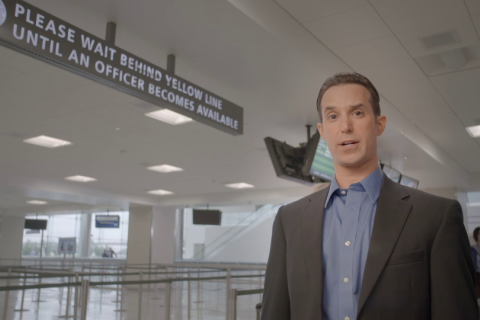
How to streamline the entry process so you can reach your final destination faster.
How to Expedite Your Entry Video

Innovative new technologies simplify processing international travelers.
Information for Lawful Permanent Residents
- Advance Parole
- Advance Parole, Reentry Permit, and Refugee Travel Documentation for returning Aliens residing in the U.S.
- USCIS Citizenship Resource Center
Resources for Study Abroad Students
- CBP Shares Travel Tips for Study Abroad Students
- Study Abroad Students Can Help Protect the Safety of the U.S. Food Supply and Native Animal Species
7 Personal Benefits of Travel
:max_bytes(150000):strip_icc():format(webp)/greg-rodgers-adventure-ed92646b25f247049e53af6d36f6c15f.jpg)
Forget milling around in your finest evening wear, Singapore Sling in hand: You'll be lucky to get peanuts. Flying isn't quite the party it was in Sinatra's days, and lots of time, energy, and money are expended to leave home, so why travel? How long do the personal benefits of travel last?
Getting away from home and stepping outside of your usual routine is beneficial for both mind and body. The long-lasting personal benefits of visiting a foreign country far outweigh the costs and time to get there.
The great travel writer Pico Lyer said: "Travel is not really about leaving our homes, but leaving our habits." Here are seven ways that travel, especially international travel, will enhance your life.
Travel Sharpens the Mind
You've done your old routine for so many years that you could run through it on autopilot. Being dropped into a new environment engages a dormant part of your mind and gets those synapses firing again.
Suddenly, you'll be required to navigate unfamiliar places, read foreign languages , try new things, make quick decisions, and choose your new eating and sleeping schedule.
Unlike at home, all the new sights, sounds, and places will require mental processing and filing. Your brain will welcome the workout! Once you return home, you'll be sharper than ever for better organizing and sprucing up your daily routine.
A Shift in Perspective
"Nobody comes back from a journey the way they started it." — Unknown
Being exposed to new cultures and people will greatly shift your paradigm and create a healthier perspective once you return back home. Seeing different social classes creates compassion and really makes you feel more blessed and content. Large portions of the world's population have to deal with daily threats such as hunger, disease , and landmines .
A hard day at work suddenly doesn't seem so bad when you see people in developing countries toiling in sun-scorched fields from morning to dark, or begging for a drink of water.
A Chance to Try New Things
"Do not follow where the path may lead. Go instead where there is no path and leave a trail." — Ralph Waldo Emerson
While you may branch out at home from time to time by trying new restaurants or splurging on expenditures, traveling kicks you out of the comfort zone and forces you, for better or worse, to try new things!
Even if you don't enjoy your first attempt at scuba diving , at least you'll be able to relate in a new way the next time you see it in a movie or hear someone talking about it.
Becoming a well-rounded individual enhances self-confidence and will help you find new material for conversation in social settings with a wider variety of people.
Who knows, you may accidentally discover your new favorite food or find out that you want to pursue a new career in karaoke!
Meet New People
"A journey is best measured in friends, not in miles." — Tim Cahill
You'll meet far more friendly people on the road than you will under ordinary circumstances at home.
Other travelers are always looking to share experiences, give tips on places to go, and meet people from all over. Striking up a conversation with other travelers is extraordinarily easy.
A polite "so where are you from?" breaks the ice quite easily and may lead to lasting friendships with people from all over the world.
See the Real Deal
"To travel is to discover that everyone is wrong about other countries." — Aldous Huxley
Until you visit a place and form your own opinions, your understanding only comes from what you were taught in school, read in books, or saw on media, which may or may not be a complete truth.
Don't over-research your upcoming destination in guidebooks. Do your best to avoid building a bias toward a place or installing mental filters before you visit. Wait to form your own opinion, remaining objective until you can make up your own mind.
Exercise and Sunshine
Sure, you could just go sweat in the gym under fluorescent lighting, but chances are that you'll be much more active from day to day while on the road, regardless of whether your trip is an adventurous one or simply a relaxing beach trip .
You could be exploring new cities on foot, hiking , swimming, walking between places, and hopefully soaking up some needed sunshine while doing so. And it's guaranteed to smell better than the gym.
Come Home Renewed
After stepping away from home for a while, you'll return with renewed energy, a new set of mental filters, and ready to take on the next big project or challenge. Call it a life reboot.
Getting away for some time, even though it requires effort, will greatly enhance your attitude and productivity once you return home. Sure, you may have some mail piled up and matters to attend, but those are simple challenges easily knocked out.
Breaking up the monotony for a while is a great way to reduce stress and give your life an injection of excitement. Don't be surprised if shortly after your return, you're already counting down days until the next trip!
11 Ways to Beat Your Post-Travel Depression
The Pros and Cons of Solo Travel
10 Mistakes to Avoid on Your First Trip to Asia
Bike Travel Is Surging Around the World. Will It Last?
What Is Couchsurfing?
The 10 Best Places to Buy Luggage of 2024
Rocky Point, Mexico Travel Guide
9 Tips for Traveling With Kids During the Pandemic
Saving Face and Losing Face
10 Hotel Add-On Charges to Avoid
Travel Editors and Writers Share Their Favorite Food Crawls for 7 US Cities—From New Orleans to Austin
Zicasso Travel Agents Offer Custom Vacations for Adventurous Travelers
Tips and Advice for Dealing With Homesickness
Tips for Traveling Solo With a Tour Group
What Documents Do I Need for Mexico Travel?
The Good and Bad of Pokemon Go for Travelers

22 Benefits of Traveling
By: Author Zachary Friedman
Posted on Last updated: February 22, 2024
Categories Travel
Home » Travel » 22 Benefits of Traveling
Whether you’re taking a quick weekend getaway or a multi-month sabbatical around the world, travel offers a wide range of benefits. From making you happier to reducing stress to teaching you about the world, this guide outlines 25 benefits of traveling.
Over the past 12 years, I’ve traveled to over 60 countries on 6 continents. I feel that travel has greatly improved my life. In this guide, I’ll share some of the biggest benefits that I have noticed.

1. Travel Makes You Happier
According to a recent study in the Journal of Tourism Analysis, people who travel frequently report being 7% happier than those who rarely or never travel. Interestingly, you don’t have to travel far to benefit. Participants of the study reported greater levels of happiness when they traveled 75 miles or more from home.
Spending money on experiences provides longer-lasting happiness than spending money on material items. This may be because people experience more happiness from anticipating experiences rather than from waiting to obtain material possessions. You’ll be happier if you spend your money on a plane ticket to Thailand rather than a new iPhone.
There other ways travel can make you happier. For example, travel allows you to experience new and exciting things. Travel also allows you to get away from the daily grind of work and other responsibilities. In addition, travel gives you the opportunity to create memories with your friends or family. Alternatively, it can also give you some time for yourself away from your parents, kids, boss, or co-workers. All of this can improve your happiness.
Personally, I feel the most happy when I’m on the road. Most of my best memories were made while traveling.
2. Traveling Improves Your Communication Skills
If you’re traveling somewhere completely foreign, you might face a language barrier. In this case, you will have to learn how to communicate in nonverbal ways using hand gestures and body language. This can improve your overall communication skills.
Travel also forces you to speak with people who are different from you. You’ll talk to people from different religions, social classes, cultures, political affiliations, and ethnic backgrounds. This will help you learn how to communicate with people with different beliefs, values, and life philosophies. Being able to talk to anyone is a great skill to have.
Travel also teaches you about different communication styles and how to adapt your own communication style to meet the needs of others. For example, in some cultures, people communicate more directly than in others. In some cultures, people are friendlier than in others. You’ll learn how to adapt to this during a conversation.
Finally, when you travel, you’re also forced to interact with lots of people. You’ll talk to tour guides, ticketing agents, receptionists, other travelers, and random locals. Chatting with lots of people can help you improve your social skills. This is particularly beneficial if you suffer from social anxiety.
Traveling is a great way to become a more effective communicator. Communication is an important skill that can help you in both your personal life and professional life.
I am not a good communicator. It’s something I’m constantly working on. I feel that travel has helped me improve in this department. I am way more confident when talking to people I don’t know.

3. Travel Helps Reduce Stress and Anxiety
In a recent study , researchers found that travel can help to reduce stress and anxiety. During the study, a group of middle managers was sent on a short vacation (4 nights) in a hotel. This had an immediate effect on their reported levels of stress levels.
In this study, researchers also found that the mode of travel didn’t matter. Participants just needed to be outside of their normal environment for a few days to benefit. The effects were also surprisingly long-lasting. 30-45 days after the vacation ended, stress and anxiety levels were still reported to be lower among those who went on vacation than those who didn’t.
Travel can be a great way to reduce stress and anxiety in your life. If you work a stressful job, a long weekend away can help you recover.
If you’re traveling to reduce chronic stress, you will need to choose a style of travel that won’t cause you more stress. For example, if you’re afraid of flying, take a train instead. If you don’t like traveling alone, take somebody with you. Don’t give yourself more stress. It doesn’t matter where you go. You just need to leave for a few days and take a break from daily life to benefit.
4. Travel Makes Your Life Feel Longer
We all want to live longer. Travel can’t make you live longer but it can make your life feel longer. Here’s how:
Travel has a major impact on the way we perceive time. According to this interesting article, experiencing new things can slow our brain’s perception of time. This is why time seems to pass slower when we’re children. We’re constantly having new experiences.
When you’re traveling, time seems to move much more slowly because you’re constantly taking in new sights, learning new things, and tasting new foods. There’s always something new to experience.
When looking back, your vacation feels like it lasted far longer than it actually did. When you’re in your normal routine at home, months can fly by without you even noticing. It’s easy to get trapped in a routine and let years slip by.
When you travel frequently, your life will feel longer and more fulfilling because time seems to move more slowly. A month on the road can feel like a year when looking back. To me, this is one of the main benefits of travel.

5. Travel Helps You Achieve Peace of Mind
When you’re feeling stressed, burned out, or just fed up with life, sometimes, the best thing you can do is take a break and explore someplace new. Travel has a way of resetting your mind. When you return home, you can look at everything with fresh eyes. Even a short trip can help clear your head.
Being in unfamiliar surroundings makes it easier to let go of all the worries and concerns that are weighing you down at home. It takes your mind off things. When you’re exploring a new place, you don’t have time to dwell on whatever is stressing you out.
Travel is an excellent distraction. It can distract you from people in your life, your job, politics, and technology. You’re too busy taking in new sights, sounds, and experiences to think about your problems. This can bring you some inner peace.
Travel can also help you put your problems into perspective. When you view a beautiful site, you realize how great the world can be. You might also realize that your problems are minor compared to the problems of those living in other parts of the world. Someone living in poverty in a developing country might envy your life, even with all of your problems.
6. Travel Enhances Your Creativity
When you travel, you are exposed to new cultures, people, and experiences. This can open your mind to new ideas. In turn, this can lead to an increase in creativity.
Studies have shown that there is a link between travel and creativity. For example, in this article , Columbia Business School professor Adam Galinsky says, “Foreign experiences increase both cognitive flexibility and depth and integrativeness of thought, the ability to make deep connections between disparate forms.”
Cognitive flexibility is the brain’s ability to switch between different ideas, tasks, or viewpoints. This is a key part of creativity. The study found that people who had spent time abroad were more likely to come up with creative solutions to problems than those who had not traveled.
If you’re a writer, photographer, designer, or artist, and you’re looking for a way to boost your creativity, consider taking a vacation. It could be just what you need to come up with your next big idea. Travel can help you think outside the box and inspire your work.

I have been living as a digital nomad for the past few years. I have noticed that I am more creative and productive when I travel. Most of my work involves writing. The ideas flow better when I’m on the road. It makes me more creative.
7. Travel Allows You to Try Excellent Food
When you travel, you have the opportunity to try all sorts of different foods that you would never have the opportunity to taste at home. You get to experience new flavors and textures that you would never otherwise encounter.
For me, the food is one of the best parts of exploring a new culture. Some people travel for food alone. It’s a great way to immerse yourself in the local culture. If you really love the cuisine, you can learn how to cook it by taking a cooking class. This is a great way to further immerse yourself in the culture. As an added bonus, you’ll learn how to prepare some authentic meals for your family.
Even if you end up not caring for the food, it’s still worth it for the experience. For example, while in the Philippines recently, I tried Balut. This is a fertilized duck embryo that is developing in the egg. It’s sold on the street. It’s not the most appetizing thing but eating it is an experience that I will never forget.
8. Traveling Has Physical Health Benefits
Many of us live sedentary lifestyles. We don’t get as much exercise as we should. While traveling, you will be active and you will get exercise. For example, you’ll walk more. You’ll be on your feet all day while sightseeing, walking through airports, and traveling around the city you’re visiting. You might also participate in outdoor activities such as hiking, skiing, surfing, or cycling. Also, if you’re at the beach sitting out in the sun, your body produces vitamin D.
Additionally, travel has been linked with a reduction in heart disease. According to this article , “A nine-year study from the State University of New York at Oswego found that vacationing every year reduced the overall risk of death by about 20 percent, and the risk of death from heart disease by as much as 30 percent.” This means travel can reduce your risk of one of the leading causes of death.

9. International Travel Makes You More Tolerant and Understanding of Different People and Cultures
Before you travel, you might have some biases about certain groups of people. You may not even notice this. Travel challenges our beliefs.
While traveling, you’ll meet and interact with people from different backgrounds. Traveling also gives you a chance to learn about different customs, religions, and beliefs.
Travel allows you to see that people from all walks of life can be interesting, kind, and valuable members of society. You learn to accept others despite their differences. You become more tolerant towards people from different backgrounds.
In addition, people who are different from you learn to accept you. During your travels, you may encounter people who’ve never met a foreigner before. By meeting you and having a positive interaction, they may become a bit more tolerant and understanding of different people. Tolerance and acceptance can spread. This can make the world a little more peaceful.
10. Get Real-World Experience and Real-Life Education
When you travel, you gain real-world experience that can’t be replicated in a classroom. You learn how to plan ahead, problem-solve on the fly, improvise, navigate new surroundings, and deal with different types of people. It’s an education that you can’t get from a book. In other words, travel can help you become street-smart.
For example, before your trip, you need to learn how to book accommodation, transportation, tours, etc. When you arrive in a new city, you have to learn how to use the public transportation system. If you miss your bus, you have to find an alternative mode of transport. If there is a language barrier, you need to figure out how to communicate with body language. These real-world experiences teach you life lessons that come in handy in your day-to-day life.
Traveling also gives you a chance to learn about new cultures and customs. You can try new foods and experience new traditions. It’s an opportunity to learn about the world in a way that you can’t in a classroom. You learn through experience.
Travel also educates you. While traveling, you’ll learn about the history, geography, politics, art, and religion, of the places you’re visiting. You become more worldly and knowledgeable. I’ve picked up loads of interesting facts and bits of information in my travels that I otherwise would never have learned.
You also gain life experience when you travel. You might fall in love, make friends, and view the most beautiful artwork and landscapes the world has to offer. At the same time, you might fall victim to a crime, have your heart broken, get into an argument, or get in trouble with the law. All of these life experiences, both positive and negative, help you grow as a person.

11. You’ll Understand Yourself More When You Travel
When you travel, you’ll find yourself in unfamiliar situations. This is a great opportunity to learn more about yourself. You’ll see how you interact with people who are different. You’ll see how you respond to problems and setbacks. In addition, you’ll see how you react in various situations.
How do you react under pressure? How do you deal with unfamiliar situations? What kind of person are you? These are the kinds of questions that you can only answer by putting yourself in new and challenging situations. Travel forces you to grow and adapt in ways that you never would at home.
You will come back from your travels with a greater understanding of who you are and what you want out of life. Travel also helps you identify your shortcomings. After returning home, you can reevaluate yourself based on what you observed while traveling. You can work on improving yourself.
When you travel alone , you also have the opportunity to think about your emotions and thoughts. You can practice introspection. Long bus and train journeys are a great time to reflect. You have hours to yourself to just think. For some people, this is incredibly valuable.
Travel also allows you to compare your culture to other cultures. When you travel, you’ll see how others think and behave. This can help you better understand why you think, behave, or feel a certain way.
12. Travel Boosts Your Self Confidence
While some people are born confident, others have to work a little harder to find it. For those of us who struggle with self-confidence, traveling can be a great confidence booster.
If you can navigate your way around a new country or culture, you can pretty much get around anywhere. This is a great skill to have in life. It allows you to be more independent. Knowing you can get around anywhere can inspire confidence.
In addition, when you travel you learn how to talk to anybody. You might have to interact with a shopkeeper in Delhi, a flight attendant from Singapore, or a security guard from London. Being able to talk to anybody is extremely beneficial in social situations. It makes it easier to approach people, ask questions, and strike up conversations. This makes you feel more confident.
Traveling can also help you feel more comfortable in unique or challenging situations. For example, maybe you have to deal with a language barrier. Maybe you get lost. Maybe you just get confused.When you’re constantly exposed to new situations, you become desensitized. You can deal with these situations more confidently without feeling fear.
When you step out of your comfort zone, you realize that you’re more capable than you thought. You’ll overcome obstacles and take risks. Suddenly, anything feels possible and your life is no longer limited by your fears. When you’re confident, you can pursue your passions and goals without anything holding you back.
I have always struggled with self-confidence and self-doubt. Travel has helped me realize that I am more than capable of anything I set my mind to. This has been incredibly inspiring.

13. Travel Helps You Get Out of the Rut of Everyday Life
Travel can be a great way to get out of a rut. It allows you to free yourself from your daily routine and have time to yourself to relax or explore.
It can be a break from the mundane and repetitive day-to-day life of a 9-5. It’s easy to get caught up in a routine. You wake up, go to work, come home, eat dinner, watch TV and then go to bed.
When you travel, you have the opportunity to shake things up. You can try new activities, meet new people, and see new places. You escape the routine of staying in the same place.
Travel also gives you an opportunity to focus on yourself for a change. It can be a time to reflect on your life and what you want from it. While you’re traveling, you can also work on your physical health, mental health, or emotional health. Maybe you realize that you want to make some changes in your life.
14. Travel Expands Your Social Network
Making friends is one of the best parts of travel. When you travel, you meet people from all walks of life. You’ll have friends with different backgrounds. You’ll have friends from different countries and cultures.
These friends can come in handy when you visit their home countries. They can show you around, introduce you to new people, and help you get the most out of your trip.
As your social network grows, new opportunities open up. During your travels, you might meet someone who can help you get a job in a new city. A friend might connect you with other travelers. Maybe you meet your future spouse through a travel buddy.
I have made a number of lifelong friends while traveling. Some of them I still keep in contact with over a decade after meeting. Whenever we meet up, we pick up right where we left off.
15. Personal Development
Travel can make you a better person. Travel can make you a better communicator, more independent, more adaptable, more confident, more accepting, and more patient.
When you leave your comfort zone to travel, you’re forced to develop social skills. You’ll talk to people at hostels, on tours, and on public transport. Sometimes people will approach you to chat because you’re a foreigner. This can teach you better communication skills.
You also have to learn how to be independent. There is nobody there to hold your hand if you make a mistake or get lost. You will also spend a great deal of time alone while traveling. You have to learn how to live with your own thoughts.
When you travel, you also have to learn to adapt to the local culture. The locals won’t change to accommodate you. You have to change. Travel will make you more adaptable.
You also become more accepting of others. The locals may have different religious beliefs, morals, diets, languages, political beliefs, cultures, ways of life, or behaviors. You’ll learn to accept these differences and look past them.
And as you navigate new surroundings and meet new people, you’ll become more confident. You may become more courageous after facing scary, uncomfortable, or dangerous situations.
Travel can also help you develop personality and character. This happens when you face hardships. Travel isn’t always easy. You might fall victim to a crime. People might discriminate against you. You might have to deal with a language barrier. These may seem like negative experiences when they happen but they can help build character.
You’ll also develop patience when you travel. Things don’t always go as planned. Maybe your flight gets delayed 12 hours. Maybe you have to gather a stack of documents and deal with a bunch of red tape to apply for a visa. The internet might go down or the power might go out. You learn to just roll with the punches.
16. Travel Teaches Us to Appreciate Nature and the Earth
When we travel, we get to see some of the most amazing natural wonders that the earth has to offer. For some of us, travel is the first time that we see mountains, deserts, jungles, or oceans. Travel allows us to view different types of plant life and wildlife in their natural habitats. It’s also our first experience with different types of climates and landscapes.
One of my greatest travel experiences was going on a safari in the Serengeti . Seeing the Milky Way for the first time while camping in the desert in Namibia was also unforgettable. If I stayed in my hometown and didn’t travel, I would have never seen an elephant, an ocean, or a desert.
While traveling, you’ll also witness the destruction of natural environments through pollution, deforestation, and other human activities. You’ll realize how fragile the planet is. This can be heartbreaking but educational.
Through travel, we learn to appreciate the Earth. We learn how fortunate we are to have such a diverse and beautiful planet. We start to realize that it is our responsibility to protect and preserve the Earth for future generations.

17. World Travel Makes you Appreciate Your Home Even More
Traveling can be an amazing experience. It can also be exhausting, overwhelming, and uncomfortable.
After a long vacation, there is nothing like coming home and sleeping in your own bed. While traveling, all of the little things that you took for granted, like a soft bed, a hot shower, and your own bathroom, become luxuries. During a long trip, you will miss the comforts and conveniences of home. It’s hard to get a good night of sleep while camping, sharing a room in a hostel , or simply sleeping in an unfamiliar place.
Travel can also be exhausting. Packing and unpacking. Moving from place to place. Sitting on buses, planes, and trains for hours, and walking around sightseeing takes a lot out of you. When you return home, you may actually appreciate your normal routine.
In addition, you may find a new appreciation for how things work in your home country. In some countries, nothing works. There is bureaucracy and red tape. There are long lines to withdraw cash or buy food. The power may go out frequently. The tap water might not be potable. When you return home, you may realize that most things just work. You may find a new appreciation for your country.
You may also have a feeling of relief when you return home. On your home turf, you know the local laws, customs, and culture. You know your rights and freedoms. You don’t have to worry about accidentally breaking a law or offending someone. It’s nice to feel like part of society. Like you belong. When you’re abroad, you’re always an outsider. You’re not quite sure what you can and can’t do.
You also won’t have to deal with a language barrier when you return home. It’s nice to be able to hold an in-depth conversation and talk freely with other people. Struggling to communicate gets exhausting.
All of this can help you appreciate your home country much more.
While traveling, I have gained a much greater appreciation for my home country, the United States. After traveling to 66 countries on 6 continents, I can’t think of a place I’d rather live. I think the U.S. is the greatest country, even though it has its flaws.
18. Travel Helps You Find a New Purpose
Many people find that travel can be a life-changing experience. It can help you to find a new purpose or direction in life, especially if you feel like you’re at a crossroads. Traveling can give you the time and space to reflect on your career or your life, and make decisions about what you want to do next.
Travel can also help you to see the world from a different perspective and learn new things about yourself. If you’re feeling lost or stuck, taking some time out to travel may be just what you need.
Travel certainly helped me find a purpose. When I left home on my first solo trip , I didn’t know what I wanted to do with my life. After returning home, One thing I knew was that I wanted to travel.
Years later, after losing my job, I felt lost I didn’t know what to do so I took a trip to Africa. After returning from that trip, I launched this website and started making a living writing about travel. These days, I live as a digital nomad . I make my living as a professional blogger. I feel happy.

19. Expand Your Horizons and Try New Things
Traveling to a new place will help you see the world in a different way. When you travel, you’ll have the opportunity to try new things. You’ll see new sites, taste new foods, talk to new people, hear new music, smell new smells, and be introduced to new thoughts and ideas.
For example, maybe you go surfing, Scuba diving, or horseback riding for the first time. Maybe you see the pyramids, taste sushi, or talk to a local student.
All of these experiences allow you to learn and see things from a different perspective. It can also simply be a lot of fun to try new things. Travel opens the mind. It might open your eyes to something new.
20. Travel Lets Us Take a Break from the Rat Race and Recharge
In today’s fast-paced world, it’s easy to get caught up in the grind. You might feel like you’re on a hamster wheel. If you’re starting to feel burned out, travel gives you an opportunity to take a break and recharge.
Travel allows you to take a step back from your normal life and just relax. Not every trip needs to be educational or challenging. You can just relax by the pool and have some drinks or take a stroll on the beach.
This can help relieve stress, anxiety, and depression. It can also give you a much-needed opportunity to simply rest and rejuvenate. An annual vacation can provide some real health benefits.

21. You Can Learn a New Language
If you’re trying to learn a new language, traveling to a foreign country where that language is spoken will help you tremendously. Actually, the only way to truly become fluent in a language is to immerse yourself in it.
When you travel, you will constantly be exposed to new words and phrases. You’ll also have the opportunity to talk to native speakers. This gives you a chance to practice and improve your comprehension and pronunciation.
Even if you’re not actively trying to learn the language, you’ll pick up some words here and there. For example, I learned basic Portuguese while traveling in Brazil for 2.5 months this year. I probably won’t use it often but it was fun to learn.
Learning a language allows you to communicate with people who only speak that language. This opens up new opportunities to travel and experience different cultures.
In addition, learning a new language can help to sharpen cognitive skills, such as memory and critical thinking. Studies have even shown that bilingualism can delay the onset of dementia.

22. You’ll Make Lifetime Memories
When you travel, you create memories that last a lifetime. Some of my most memorable life experiences have happened while traveling. I will never forget my motorcycle trip across Vietnam. I will never forget walking on the Great Wall of China .
You can tell stories about your adventures to your friends and family. My dad’s travel stories are one of the main reasons I started traveling myself. He inspired me.
If you travel with friends or family, you’ll have more stories to look back on and reminisce about when you’re older. Even though I’ve only been traveling for a decade, I still enjoy looking back at old photos and talking to travel buddies about our journeys.
How has travel benefited you? Share your experience in the comments below!
Pin it For Later !

More from Where The Road Forks
- 30 Free Things To Do While Traveling
- Checked Vs Carry-On Luggage
- How to Provide Proof of Onward Travel
- Solo Travel Vs Group Travel
- Dark Tourism Ethics and Criticisms
- 35 Types of Tourism
Zachary Friedman is an accomplished travel writer and professional blogger. Since 2011, he has traveled to 66 countries and 6 continents. He founded ‘Where The Road Forks’ in 2017 to provide readers with information and insights based on his travel and outdoor recreation experience and expertise. Zachary is also an avid cyclist and hiker. Living as a digital nomad, Zachary balances his professional life with his passions for hiking, camping, cycling, and worldwide exploration. For a deeper dive into his journey and background, visit the About page. For inquiries and collaborations, please reach out through the Contact page. You can also follow him on Facebook.
Sharing is caring!
Sign me up for the newsletter!
Wednesday 17th of January 2024
I like that you talked about how traveling is a great way to become a more effective communicator. I want new experiences, so I am thinking of traveling. First off, I'll try going on a Miami tour.
The Top Ten Most Influential Travel Books
Even before there were armchairs, voracious bookworms traveled the world just by reading
/https://tf-cmsv2-smithsonianmag-media.s3.amazonaws.com/accounts/headshot/tony.png)
Tony Perrottet
Contributing writer
/https://tf-cmsv2-smithsonianmag-media.s3.amazonaws.com/filer/top-ten-travel-books-631.jpg)
William H.H. Murray's guidebook to the Adirondacks “kindled a thousand camp fires and taught a thousand pens how to write of nature,” inspiring droves of American city-dwellers to venture into the wild and starting a back-to-nature movement that endures to this day. Of course, Murray's slender volume was part of a great literary tradition. For more than two millennia, travel books have had enormous influence on the way we have approached the world, transforming once-obscure areas into wildly popular destinations.
A detailed selection would fill a library. So what follows is a brazenly opinionated short-list of travel classics—some notorious, some barely remembered—that have inspired armchair travelers to venture out of their comfort zone and hit the road.
1. Herodotus, Histories (c.440 BC)
Homer's Odyssey is often referred to as the first travel narrative, creating the archetypal story of a lone wanderer, Odysseus, on a voyage filled with mythic perils, from terrifying monsters like the Cyclops to seductive nymphs and ravishing sorceresses. As may be. But the first real “travel writer,” as we would understand the term today, was the ancient Greek author Herodotus, who journeyed all over the eastern Mediterranean to research his monumental Histories. His vivid account of ancient Egypt, in particular, created an enduring image of that exotic land, as he “does the sights” from the pyramids to Luxor, even dealing with such classic travel tribulations as pushy guides and greedy souvenir vendors. His work inspired legions of other ancient travelers to explore this magical, haunted land, creating a fascination that reemerged during the Victorian age and remains with us today. In fact, Herodotus qualifies not just as the Father of History, but the Father of Cultural Travel itself, revealing to the ancient Greeks—who rarely deemed a foreign society worthy of interest—the rewards of exploring a distant, alien world.
2. Marco Polo, The Travels of Marco Polo (c.1300)
When the 13th-century Venetian merchant Marco Polo returned home after two decades wandering China, Persia and Indonesia, the stories he and his two brothers told were dismissed as outright fiction—until (legend goes) the trio sliced open the hems of their garments, and hundreds of gems poured to the ground in a glittering cascade. Still, Polo's adventure might have remained all but unknown to posterity if an accident had not allowed him to overcome his writer's block: Imprisoned by the Genoans in 1298 after a naval battle, he used his enforced leisure time to dictate his memoirs to his cellmate, the romance writer Rustichello da Pisa. The resulting volume, filled with marvelous observations about Chinese cities and customs and encounters with the potentate Kublai Khan (and including, admittedly, some outrageous exaggerations), has been a bestseller ever since, and indelibly defined the Western view of the Orient. There is evidence that Polo intended his book to be a practical guide for future merchants to follow his path. The vision of fabulous Chinese wealth certainly inspired one eager and adventurous reader, fellow Italian Christopher Columbus, to seek a new ocean route to the Orient. (Of course, Islamic scholars will point out that the 14 th -century explorer Ibn Battuta traveled three times as far as Polo around Africa, Asia and China, but his monumental work Rihla , “The Journey,” remained little known in the West until the mid-19th century).
3. Laurence Sterne, A Sentimental Journey Through France and Italy (1768)
When the author of Tristram Shandy penned this extraordinary autobiographical novel, the Grand Tour of Europe as a rite of passage was in full swing. Wealthy young British aristocrats (almost invariably male), took educational expeditions to the great cultural sites of Paris, Venice, Rome and Naples, seeking out the classical sites and Renaissance artworks in the company of an erudite “bear leader,” or tour guide. Sterne's rollicking book suddenly turned the sober Grand Tour principle on its head. The narrator deliberately avoids all the great monuments and cathedrals, and instead embarks on a personal voyage, to meet unusual people, seeking out new and spontaneous experiences: (“'tis a quiet journey of the heart in pursuit of NATURE, and those affections which arise out of her, which make us love each other—and the world, better than we do.”) His meandering journey across France and Italy is filled with amusing encounters, often of an amorous nature (involving assorted chamber maids and having to share rooms in inns with member of the opposite sex), which prefigures the Romantic era's vision of travel as a journey of self-discovery. Even today, most “true travelers” pride themselves on finding vivid and unique experiences, rather than generic tourist snapshots or lazy escapes.
4. Mark Twain, The Innocents Abroad (1869)
Writers of the Gilded Age (a term Mark Twain incidentally coined) produced thousands of earnest and tedious travel books, a tendency that Twain deftly deflated with Innocents Abroad. Sent as a journalist on a group cruise tour to see the great sights of Europe and the Holy Land, Twain filed a series of hilarious columns to the Alta California newspaper that he later reworked into this classic work. With its timely, self-deprecating humor, it touched a deep chord, lampooning the naïveté of his fellow Americans (“The gentle reader will never, never know what a consummate ass he can become until he goes abroad”) and the modest indignities of exploring the sophisticated Old World (“In Paris they just simply opened their eyes and stared when we spoke to them in French! We never did succeed in making those idiots understand their own language.”) The result was to embolden many more of his fellow countrymen to fearlessly cross the pond and immerse themselves in Europe, and, hardly less importantly, to begin a new style of comic travel writing that echoes today through hugely popular modern authors such as Bill Bryson. Today, Innocents Abroad is one of the few 19th-century travel books that is still read eagerly for pleasure. (Its perfect companion is, of course, Roughing It , Twain's account of his misspent youth as a miner in the wild American West).
5. Norman Douglas, Siren Land (1911)
The Italian island of Capri began its proud reputation for licentiousness in ancient Roman times, and by the mid-19 century was luring free-living artists, writers and bon vivants from chilly northern climes. (It was even said that Europe had two art capitals, Paris and Capri). But its modern reputation was sealed by the libertine writer Norman Douglas, whose volume Siren Land offered an account of the carefree southern Italian life “where paganism and nudity and laughter flourished,” an image confirmed by his 1917 novel South Wind , where the island is called Nepenthe, after the ancient Greek elixir of forgetfulness . (Siren Land gets its title from Homer’s Odyssey; Capri was the home of the Sirens, ravishing women who lured sailors to their deaths by shipwreck with their magical voices). Millions of sun-starved British readers were captivated by the vision of Mediterranean sensuality and Douglas' playful humor. (“It is rather puzzling when one comes to think of it,” he writes, “to conceive how the old Sirens passed their time on days of wintry storm. Modern ones would call for cigarettes, Grand Marnier, and a pack of cards, and bid the gale howl itself out.”) Douglas himself was flamboyantly gay, and liked to scamper drunkenly around Capri’s gardens with vine leaves in his hair. Thanks largely to his writings, the island in the 1920s entered a new golden age, luring exiles disillusioned by post-war Europe. The visitors included many great British authors who also penned travel writing classics, such as D.H. Lawrence (whose marvelous Etruscan Places covers his travels in Italy; Lawrence also showed drafts of the torrid Lady Chatterly’s Lover to friends while on holiday in Capri in 1926), E.M Forster, Christopher Isherwood, Aldous Huxley, Graham Greene and W.H. Auden. (The renowned poet wrote a travel volume on Iceland, of all places). The collective vision of Mediterranean freedom has inspired generations of travelers to those warm shores ever since.
6. Freya Stark, The Valley of the Assassins (1934)
The Victorian age produced a surprising number of adventurous women travel writers—Isabella Bird, for instance, wrote about exploring Hawaii, the Rocky Mountains and China—but the authors were regarded as rare and eccentric exceptions rather than role models by female readers. In the more liberated era of the 1930s, Freya Stark's tome revealed just how far women could travel alone and live to write about it. Her breakthrough book, The Valley of the Assassins , was a thrilling account of her journey through the Middle East. Its highlight was her visit to the ruined stronghold of the Seven Lords of Alamut, a medieval cult of hashish-eating political killers in the Elburz Mountains of Iran whose exploits had been legendary in the West since the Crusades. (The singular escapade made her one of the first women ever inducted into the Royal Geographical Society.) The bestseller was followed by some two dozen works whose freshness and candor inspired women to venture, if not by donkey into war zones, at least into exotic climes. “To awaken quite alone in a strange town is one of the pleasantest sensations in the world,” she enthused in Baghdad Sketches . “You have no idea of what is in store for you, but you will, if you are wise and know the art of travel, let yourself go on the stream of the unknown and accept whatever comes in the spirit in which the gods may offer it.”
7. Jack Kerouac, On the Road (1957)
This thinly veiled autobiographical novel, about a group of young friends hitch-hiking and bumming their way across the United States, has inspired generations of restless readers to take a leap into the unknown. Although the publisher made Kerouac change the actual names (Kerouac became Sal Paradise, the wild driver Neal Cassady became Dean Moriarty and poet Allen Ginsberg became Carlo Marx), its episodes were almost entirely drawn from life, qualifying it as a classic of travel writing. It was also a cultural phenomenon: Kerouac legendarily hammered out the whole lyrical work on a giant scroll of paper (possibly on one speed-induced binge), and carried it about in his rucksack for years before it was published, becoming an instant icon of the rebellious “beat” era, thumbing its nose at the leaden conformity of the cold war era. Today, it is still a dangerous book to read at an impressionable age (at least for younger males; women tend to be left out of the boyish pursuits, except as sex objects). The delirious sense of freedom as Kerouac rides across the wheat fields of Nebraska in the back of a farm truck or speeds across the Wyoming Rockies toward Denver is infectious.
8. Tony and Maureen Wheeler, Across Asia on the Cheap (1973)
It was one of history's great self-publishing success stories. When two young travelers roughed it in a minivan from London to Sydney, they decided to write a practical guide about their experiences. Working on a kitchen table, they typed out a list of their favorite budget hotels and cheap restaurants from Tehran to Djakarta, stapled the copied pages together into a 90-page booklet and sold it for $1.80 a pop. Their instincts were correct: There was a huge hunger for information on how to travel on a budget in the Third World, and the modest booklet sold 1,500 copies in a week. The hit became the basis for Lonely Planet, a vast guidebook empire with books on almost every country on earth. The young and financially challenged felt welcomed into the exotic corners of Nepal, Morocco and Thailand, far from the realm of five-star hotels and tour groups, often for a few dollars a day. The guidebooks' power quickly became such that in many countries, a recommendation is still enough to make a hotelier's fortune. (Having sold 100 million copies of their guidebooks, the Wheelers finally sold Lonely Planet for £130 million in 2010 to the BBC. (The BBC recently confirmed plans to sell the franchise to NC2 Media at a loss for just £51.5 million. Nobody ever claimed Across Asia was high literature, but the Wheelers now help fund a literary institution, The Wheeler Center, in their home city of Melbourne, Australia, to promote serious fiction and non-fiction).
9. Bruce Chatwin, In Patagonia (1977)
Along with Paul Theroux's wildly entertaining Great Railway Bazaar , Chatwin's slim, enigmatic volume became widely credited with the modern rebirth of travel writing. A former Sotheby's art auctioneer, the erudite Chatwin famously quit the London Sunday Times Magazine via telegram to his editor (“Have gone to Patagonia”) and disappeared into the then little-known and remote tip of South America. In a stylistic first for the genre, In Patagonia weaves a personal quest (for a piece of prehistoric skin of the mylodon, which the author had seen as a child) with the region's most surreal historical episodes, related in a poetic, crisp and laconic style. Focusing on god-forsaken outposts rather than popular attractions, Chatwin evokes the haunting ambiance with deftly drawn vignettes from Patagonia's storybook past, such as how Butch Cassidy and the Sundance Kid lived in a cabin in southern Argentina, or how a Welsh nationalist colony was begun in the windswept town of Trelew. And thus the quirky travel pilgrimage was born.
10. Peter Mayle, A Year in Provence (1989)
Mayle's breezy account of his mid-life decision to escape dark and sodden England to renovate a farmhouse in Ménerbes, a village in the south of France, created an entire sub-genre of do-it-yourself travel memoirs filled with charmingly quirky locals. It also inspired thousands to physically emulate his life-changing project, flooding Provence and other sunny idylls with expats in search of a rustic fixer-upper and supplies of cheap wine. Aided by the relaxed residency laws of the European Union, discount airlines and France's super-fast TGV trains, the once-impoverished southern France quickly became gentrified by retirees from Manchester, Hamburg and Stockholm, until it is now, in the words of one critic, a “bourgeois theme park for foreigners.” (Tuscany became equally popular, thanks to Frances Mayes' beguiling books, with the shores of Spain and Portugal following suit). Things got so crowded that Mayle himself moved out – although he has since returned to a different tiny village, Lourmarin, a stone's throw from his original haunt. In recent years, Elizabeth Gilbert's wildly successful Eat Pray Love (2007) offered a similar spirit of personal reinvention, inspiring a new wave of travelers to follow her path to the town of Ubud in Bali in search of spiritual (and romantic) fulfillment
A Smithsonian Magazine Contributing Writer, Tony Perrottet is the author of five travel and history books, including Pagan Holiday: On the Trail of Ancient Roman Tourists and The Sinner's Grand Tour: A Journey Through the Historical Underbelly of Europe; www.tonyperrottet.com
Get the latest Travel & Culture stories in your inbox.
/https://tf-cmsv2-smithsonianmag-media.s3.amazonaws.com/accounts/headshot/tony.png)
Tony Perrottet | READ MORE
Tony Perrottet is a contributing writer for Smithsonian magazine, a regular contributor to the New York Times and WSJ Magazine , and the author of six books including ¡Cuba Libre!: Che, Fidel and the Improbable Revolution that Changed World History , The Naked Olympics: The True Story of the Ancient Games and Napoleon's Privates: 2500 Years of History Unzipped . Follow him on Instagram @TonyPerrottet .
5 Scientifically Proven Health Benefits of Traveling Abroad

When was the last time you traveled abroad? Traveling for business is one thing, but I’m talking about packing your bags, logging out of your email account and disconnecting from your normal routine for a week or more.
Traveling the world isn’t just fun and exciting; there’s ample research to suggest it’s highly beneficial for your physical, mental and emotional health as well.
Check Out These Five Proven Benefits
Americans may say they like to travel, but most don’t venture abroad very often. According to a study published in the Hostelworld Global Traveler Report, Americans are half as likely as Europeans to go abroad and visit more than one country.
The average resident of the UK has visited 10 countries, Germans have seen eight, and the French traveled to five nations on average. But Americans? They tend to visit just three. In fact, 29 percent of American adults have never been abroad!
When citizens of the U.S. do move past the border, most visit Canada or Mexico. Affordability is evidently a big factor — about 71 percent of Americans say it’s too expensive to leave the country — but that’s hardly the whole story.
Given what all the travel and deal sites have to offer today, you can travel abroad without ransacking your piggy bank. Perhaps many Americans don’t grasp the benefits of traveling abroad — and there are many!
Let’s dive in and take a look at some of the health benefits that researchers have explored and verified scientifically.
1. Travel Makes You Healthier
According to a joint study from the Global Commission on Aging and Transamerica Center for Retirement Studies, in partnership with the U.S. Travel Association, traveling actually keeps you healthier . The study found that women who vacation at least twice a year show a significantly lower risk of suffering a heart attack than those who only travel every six years or so.
The same is true for men. Men who do not take an annual vacation show a 20 percent higher risk of death and 30 percent greater risk of heart disease.
2. Travel Relieves Stress
Although missing a connecting flight or losing baggage in a foreign airport is sure to boost your anxiety, traveling has been scientifically proven to lower stress levels, and rather dramatically.
RELATED: Try These Simple 1-minute Meditations to Calm Your Mind
According to one study , three days after taking a vacation, travelers report feeling less anxious, more rested and in a better mood. Interestingly, these benefits tend to linger for weeks after the trip has ended.
3. Travel Enhances Your Creativity
“Foreign experiences increase both cognitive flexibility and depth and integrativeness of thought, the ability to make deep connections between disparate forms,” explains Adam Galinsky , a professor at Columbia Business School who has authored a number of studies that investigate the concrete links between creativity and international travel.
Travel alone isn’t enough, however. Galinsky has found that international travelers have to be purposeful about engaging.
RELATED: 7 Creative Pep Talks to Get You Through the Work Week
“The key, critical process is multicultural engagement, immersion and adaptation,” he continues. “Someone who lives abroad and doesn’t engage with the local culture will likely get less of a creative boost than someone who travels abroad and really engages in the local environment.”
4. Travel Boosts Happiness and Satisfaction
Most people tend to be happier when they’re traveling and don’t have to worry about work, of course. However, one of the more interesting takeaways from a Cornell University study is that people also experience a direct increase in happiness from just planning a trip.
Three days after taking a vacation, travelers report feeling less anxious, more rested and in a better mood.
The study found that the anticipation of taking a vacation is far greater than the anticipation of acquiring a physical possession. Thus, the benefits of traveling abroad begin well before the trip does.
5. Travel Lowers the Risk of Depression
While people tend to avoid the subject in our society, depression is unfortunately a major problem. Millions of Americans struggle with depression on a regular basis and it’s not uncommon for doctors to overprescribe medication for depression.
Luckily, healthier alternatives are available for escaping the hopelessness of a depressed state. According to research, travel may be one of them.
A study from the Marshfield Clinic in Wisconsin found that women who vacation at least twice a year are less likely to suffer from depression and chronic stress than women who vacation less than once every two years.
Where Will Your Travels Take You This Year?
So there are clear, scientifically-backed health benefits of traveling the world. Mentally, physically and emotionally, you can gain a lot from packing your bags and visiting places you’ve never been.
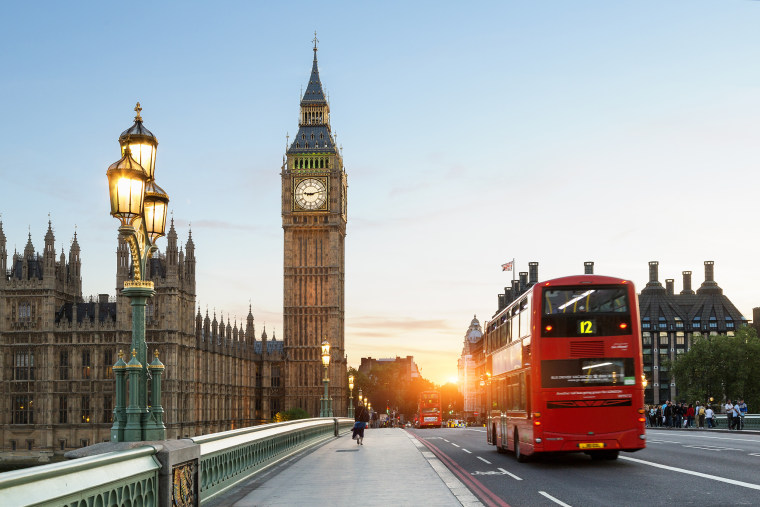
But where will you go? Thousands of places across the world are worth visiting. Here are a few that should be on your radar:
- London, England. London is a must-visit city. If you’re new to international travel and want to get your feet wet, there’s probably no better destination. Not only is there a lot to do in London , but it’s cheap and easy to get to from most major U.S. cities. There’s also no language barrier, which is a bonus for people who get nervous about that.
- Cape Town, South Africa. The beauty of Cape Town is astonishing. Not only is the landscape unique, but there’s wildlife galore, including the Big Five (lion, elephant, Cape buffalo, leopard, and rhino). There’s much to see ; whether you prefer a fast pace or slow and easy, there’s an itinerary for you.
- Lucerne, Switzerland. If you’ve never been to Switzerland, Lucerne is a fantastic first city to experience. Conveniently near to the Zurich airport, the town is compact, yet lively. Not only are there lots of attractions in the city , but you can enjoy an array of hiking trails just outside of town.
- Auckland, New Zealand. Whether you want to kayak to a volcano, abseil down a waterfall, swim with sharks, or tackle challenging trails on a mountain bike, Auckland has everything an adventure lover could ask for. Oh, and it’s also a city that teems with good food and entertainment.
For many, the notion of international travel isn’t as mysterious and thrilling as it used to be. In a world accessible via YouTube, Google Earth, and virtual reality, many think they’ve already seen all the world has to offer, when they’ve really only stared at a screen a few inches in front of their face.
If you want to enjoy the scientifically proven health benefits of travel abroad, you should start planning a trip. Whether you go to London, Cape Town, Lucerne, Auckland, or somewhere entirely different, boarding a plane and flying to a foreign destination where you’re equal parts excited and intimidated is great for your growth and development.
Where will you go?
National Geographic content straight to your inbox—sign up for our popular newsletters here

Travelers may find it difficult to empathize with locals, according to experts. Here, tourists in 2016 buy fruit juice at a market stall in Siem Reap, Cambodia.
Travel is said to increase cultural understanding. Does it?
While researchers say travel does affect the brain’s neural pathways, true empathy remains an elusive destination.
Empathy is commonly defined as “putting yourself in another person’s shoes” or “feeling the emotional states of others.” It’s a critical social tool that creates social bridges by promoting shared experiences and producing compassionate behavior. But can empathy be learned? And can travel help facilitate this learning? The answer is complicated. “Research has shown that empathy is not simply inborn, but can actually be taught,” writes psychotherapist F. Diane Barth in Psychology Today . While past research has indicated that empathy is an unteachable trait, newer research—including a 2017 Harvard study —suggests that the “neurobiologically based competency” of empathy is mutable and can be taught under the right circumstances. Whether seeing the world actually opens travelers’ minds—that it makes travelers more empathetic—is up for debate. In a 2018 Harris Poll of 1,300 business travelers, 87 percent said that business trips helped them to be more empathetic to others, reports Quartz . And in a 2010 study , Columbia Business School professor Adam Galinsky found that travel “increases awareness of underlying connections and associations” with other cultures. While self-defined empathy and awareness are unreliable measurements, it stands to reason that cross-cultural exposure through travel would at least create conditions for checking conscious and unconscious biases. “If we are to move in the direction of a more empathic society and a more compassionate world, it is clear that working to enhance our native capacities to empathize is critical to strengthening individual, community, national, and international bonds,” writes Helen Riess, associate professor of psychiatry at Harvard Medical School and author of the 2017 report.
But the coronavirus pandemic and, more recently, the global Black Lives Matter protests have forced an uncomfortable reckoning—that all the travel in the world might not be enough to engender the deep cross-cultural awareness people need now.
“There’s this false adage that travel opens minds, but that’s not [a built-in] fact about what travel does,” says Travis Levius, a Black travel journalist and hospitality consultant based in London and Atlanta. “Travel does not automatically make you a better person,” nor does it clue you into “what’s going on in terms of race relations.”
Black Travel Alliance founder Martina Jones-Johnson agrees, noting that tourism boards have made it “overwhelmingly clear that travel doesn’t necessarily build empathy.”
The lack of diversity within the travel industry itself suggests that there’s much work to be done to make the industry as inclusive as the world of travel consumers. According to a 2019 annual report by the U.S. Commerce Department’s Bureau of Labor Statistics, workers in the leisure and hospitality industry were overwhelmingly white. Consumers, meanwhile, say they want to spend their money on travel companies whose employees reflect the world they work in, according to the World Travel and Tourism Council .
Additionally, companies that embrace inclusivity may have a better chance of avoiding tone-deaf messages , such as using “free at last”—the line is from Martin Luther King Jr.’s “Dream” speech—to caption a billboard depicting white children jumping into the Florida Keys. The advertisement, which has since been taken down, launched in the wake of the killing of George Floyd by police officers in Minneapolis that sparked worldwide protests against police brutality.
(Related: Learn why it’s important to have diverse perspectives in travel.)

Karfa Diallo leads a tour of sites related to the trans-Atlantic slave trade in Bordeaux, France, in June 2020. Participating in activities that amplify marginalized voices and experiences can go a long way toward developing empathy, say experts.
A road paved with good intentions
Interestingly, modern tourism has fairly empathic origins. In the 1850s, Thomas Cook used new railway systems to develop short-haul leisure travel as respites for hard-working British laborers, according to Freya Higgins-Desbiolles, a senior lecturer on tourism management at the University of South Australia.
A hundred years later the United Nations declared reasonable working hours, paid holidays, and “rest and leisure” as human rights . By the 1960s, spurred by related movements to increase holiday time, the leisure sector had coalesced into a full-fledged professional industry.
Since then, the World Tourism Organization and international aid groups have championed tourism as both “a vital force for world peace [that] can provide the moral and intellectual basis for international understanding and interdependence,” as well as an economic development strategy for poorer nations.
But not everyone agrees that the travel industry has lived up to these lofty goals. In recent decades, it has been accused of doing just the opposite. As Stephen Wearing wrote nearly 20 years ago : “tourism perpetuates inequality” because multinational corporations from capitalist countries hold all the economic and resource power over developing nations.
(Related: This is how national parks are fighting racism.)
These days, inequality is baked into the very process of traveling, says veteran Time magazine foreign correspondent and Roads & Kingdoms co-founder Nathan Thornburgh. “Your frequent flier status, the stupid little cordon separating the boarding lines, the way you take an Uber or cab from the airport after you land, not a bus or colectivo or matatu —those all reinforce divisions, not empathy,” he writes in an email. “And that’s just getting to a place.”
Empathy’s downsides
Experts say developing empathy isn’t easy and comes with a host of problems. Joseph M. Cheer, a professor at Wakayama University’s Center for Tourism Research in Japan, notes that empathy inherently “others” another person.
In his 2019 study of westerners on a bike tour in Cambodia, Cheer found that despite the prosocial aspects of the experience—visiting local non-governmental organizations, interacting with local Cambodians—post-tour interviews revealed that the tourists didn’t understand the cultural context of the outing. The visitors leaned into problematic tropes like “happy,” “lovely,” and “generous” when describing locals or simply saw Cambodians as service providers.
This “othering” bias, Cheer says, becomes more noticeable the greater the distance between tourists and locals, and especially so in strictly transactional encounters, such as in hotels.

A worker at a resort in Bali. Researchers say visitors should make a commitment to understand local cultures by moving past transactional interactions.
Our individual travel experiences oppose our best intentions, says travel writer Bani Amor, who has written extensively on race, place, and power.
“The stated [positive] intentions are completely contradictive to what happens in the tourism industry and how oppressive it is to BIPOC [Black, indigenous, and people of color] around the world, how tourism laborers are being treated, and how they’re being dispossessed, not having a right to their own land and to enjoy our own places,” says Amor, who has worked in the tourism industry in their ancestral home of Ecuador.
“You can only really know your own experience,” adds Anu Taranath, a racial equity professor at the University of Washington Seattle and a second-generation immigrant.
“I think we can develop empathetic feelings and sort of crack open our sense of self to include other people’s experiences in it. We can only deepen our own understanding of who we are in an unequal world and how that makes us feel and how that motivates us to shift our life in some way or another.”
I think in its purest form, empathy is basically impossible. I can weep for you, but I can’t weep as you. Nathan Thornburgh , founder, Roads & Kingdoms
Or as Thornburgh puts it: “I think in its purest form, empathy is basically impossible. I can weep for you, but I can’t weep as you.”
Traveling deeper
While experts conclude that travel may not inspire enough empathy to turn tourists into social justice activists, the alternative—not traveling at all—may actually be worse.
“[B]ecause travel produces encounters between strangers, it is likely to prompt empathetic-type imaginings, which simply wouldn’t be there without the proximity created by travel,” says Hazel Tucker in a 2016 study published in the Annals of Tourism. It’s also one reason why it’s important to expose children to travel at an early age.
Yet truly transformational experiences require more than just showing up with a suitcase. It requires energy, effort, and commitment on the part of tourists, as well as specific conditions, says Higgins-Desbiolles. “Visitors need to be prepped for the interaction so that they are ready to engage with the people on an equal level,” she notes.
Taranath’s book Beyond Guilt Trips: Mindful Travel in an Unequal World may provide some starting points. “It’s an invitation to think more carefully about our good intentions and where they really need to be challenged,” Taranath explains. “How do you think about identity and difference in an unequal world? What does it actually look like?”
Additionally, Tucker suggests embracing what she calls “unsettled empathy”: learning about the cultures you’re planning to visit and sitting with uncomfortable legacies of colonialism, slavery, genocide, and displacement from which no destinations are exempt.

Barbara Manigault, a Gullah sweet grass basket weaver, practices her craft in Mount Pleasant, South Carolina. American tourists with limited travel opportunities can find many places in the U.S. to learn more about other cultures.
That background can be the basis for meaningful conversations, which Cheer found are “the key element that prompted empathy.” Thornburgh adds that travelers should seek out places where there is “an equal and humanistic exchange, or something approaching it, between the visitors and the visited.”
(Related: The E.U. has banned American travelers. So where can they go? )
Toward that end, experts generally ruled out cruises. Instead, immersive experiences like Black Heritage Tours that amplify historically marginalized voices provide better opportunities for meaningful connections.
Fortunately for would-be travelers, those opportunities can be found even in these pandemic times, when many countries are restricting international travel, especially for Americans.
“We are so lucky in this country that the whole world has come here to build their lives, in big cities and small, and that we have Black and [Native American] communities throughout,” says Thornburgh. “Go to their restaurants, lend your talents to their schools, help them raise money for their playgrounds.
“You want travel? You want to experience different cultures? Start at home. Start now.”
Related Topics
- CULTURAL TOURISM
- PEOPLE AND CULTURE
You May Also Like

How to make travel more accessible to the blind

The Masterclasses 2023: 10 travel writing tips from our experts
For hungry minds.

Americans have hated tipping almost as long as they’ve practiced it

Who were the original 49ers? The true story of the California Gold Rush

10 of the best hotels in Tokyo, from charming ryokans to Japanese onsen retreats

To find their future, South Africa’s first people look to the past

How to spend a day exploring Bristol's best music venues
- Environment
History & Culture
- History & Culture
- History Magazine
- Mind, Body, Wonder
- Coronavirus Coverage
- Paid Content
- Terms of Use
- Privacy Policy
- Your US State Privacy Rights
- Children's Online Privacy Policy
- Interest-Based Ads
- About Nielsen Measurement
- Do Not Sell or Share My Personal Information
- Nat Geo Home
- Attend a Live Event
- Book a Trip
- Inspire Your Kids
- Shop Nat Geo
- Visit the D.C. Museum
- Learn About Our Impact
- Support Our Mission
- Advertise With Us
- Customer Service
- Renew Subscription
- Manage Your Subscription
- Work at Nat Geo
- Sign Up for Our Newsletters
- Contribute to Protect the Planet
Copyright © 1996-2015 National Geographic Society Copyright © 2015-2024 National Geographic Partners, LLC. All rights reserved
- NEW COLOURS
- Classic Tech
- Classic Plus
- Classic Pro
- Classic Flight
- Military Backpack
- Underseat Bags
- Laptop Backpacks
- Gym and Work Backpacks
- Minimalist Backpack
- > Show All
- Classic Cross Body Bags
- Packing Cubes
- British Airways
- Backpack Size Guide
- > More Backpack Guides
- Carry On Luggage Size Guide
- > More Cabin Bag Guides
- Travel Gift Guide
- Digital Nomads Hub
- Travel News
- Destinations
- Product & Style
- Travel Light
- Packing Tips
- Packing Lists
- Air Travel Tips by Airlines
- Luggage Tips
- Pre-flight Checklist
- In-flight Checklist
- Layover Tips
- CABIN MILES
- Backpacks CLASSIC NEW COLOURS Classic Classic Tech Classic Plus Classic Pro Classic Flight ADVENTURE NEW COLOURS ADV ADV Pro ADV Dry MILITARY Military Backpack SIZE 28L 30L 32L 36L 42L 44L SHOP BY FUNCTION Cabin Bags Underseat Bags Laptop Backpacks Daypacks Gym and Work Backpacks Minimalist Backpack
- Shoulder Bags > Show All SHOULDER BAGS Sidekick Flipside Flapjack Classic Cross Body Bags
- Bum Bags > Show All BUM BAGS Hustle Hip Bags
- Accessories > Show All ACCESSORIES Rain Cover Packing Cubes Gift Cards
- Blogs Product Guides Backpack Size Guide > More Backpack Guides Carry On Luggage Size Guide > More Cabin Bag Guides Travel Gift Guide Our Journey Digital Nomads Hub Travel News Destinations Product & Style Cabinzero Travel Tips Travel Light Packing Tips Packing Lists Day Trips Air Travel Tips Air Travel Tips by Airlines Luggage Tips Pre-flight Checklist In-flight Checklist Layover Tips
15 Benefits of Travelling and Why Travel Is Good for You
What comes to your mind when someone asks you about “travel”? Does travel mean a vacation on the beach while sipping some margaritas, an adventure to the unknown, or an Instagrammable sunset destination? The idea of travelling varies from person to person, but the advantages of travelling are unbounded.
When you travel, not the trip or the vacation itself, but the whole process of planning, exploring, and returning from a trip is important. When you realise how the benefits of travelling can do wonders for you, you definitely will have the motivation to pack your bag and start travelling more. What is it about travelling that always makes you feel good after coming back from a trip? There are so many advantages behind travel, but here are the top 15 benefits.
The Health Benefits of Travelling: Travelling Improves Your Health and Mind
Improving your well-being is one of the fundamental benefits of travelling. Travelling helps to decrease the risks of heart attack and anxiety, while developing our brain health. There have been studies proving that travel can place a positive impact on our heart health. One study from Framingham Heart Studies Organization published in the American Journal of Epidemiology shows that women who would travel at least twice a year had a significantly lower risk of developing coronary heart disease or heart attack compared with those who would only be able to travel once in every six years.
One of the health benefits of travelling is that when you travel to new surroundings, you press a restart button to your body and mind, which brings in fresh energy when you get back to your regular activities. It keeps you physically fit by being active on the journey, exploring nature, hiking, or strolling the local markets. A healthy body means a healthy mind, and the stimulation you get from travelling can boost your productivity and effectiveness in your daily work.
Exploring a new place, trying new things, and pushing yourself out of your comfort zone can increase the level of dopamine in your brain. This will contribute to how we strive, focus on things and find things interesting. Remember, “Travel and change of place impart new vigor to the mind,” said the Roman philosopher Seneca.

Source: unsplash.com
The Advantages of Travelling: Travelling Improves Your Communication and Language Skills in Many Ways
Some people enjoy the idea of travelling because it allows them to meet new people from all walks of life. Speaking to new people and getting new perspectives will change how one perceives the world and easily get engaged in various topics of conversation. Travel really helps in consolidating both effective communication and social skills as you are exposed to different cultures and outlooks. This benefit you get from travelling can be applied not only to your personal life but your work life also .
Setting foot in a new part of your country or a new part of the world means you are out of your ordinary comfort zone. Everything is new and captivating to your curiosity. The benefit of this is you are eager to learn new things and open to new ideas and concepts. This will naturally lead to the urge to open your mind and practice your people skills, whether you travel alone or with someone else.
Travelling is when creativity comes into play in your daily communication. When you travel to a new country, there are situations where you would have to use not only verbal communication but also gestures and other non-verbal ways to express yourself. Whether you ask for directions, buy ingredients at a local market or have a conversation with a local, be prepared to utilize your body language skills!
The Benefits of Travelling: Hedonistic Travel Ensures Peace, Calms Your Mind and Encourages Positive Feelings
When going on a holiday, we often tend to be stimulated, present and be in the moment, which brings us a step closer to achieving mindfulness. Travelling alone brings in the feeling of solitude that we don’t often get enough of. Travelling allows us to be disconnected from people, and even technology, for a while, and be more connected to our own mind and self, which leads us to our inner peace.
Whether it is domestic or international travel, travelers step out of their habitat and get exposed to other conditions of life. We find ourselves more thankful for our life and realise what we have might be what others desire. Appreciation to every little thing in life is one way or another a course for happiness.
Travelling also changes our attitude towards life and people in a more positive way. We observe things and think from a broader perspective when our mind is open to the outside world. The benefit of travelling helps us embrace cultural and social differences more when immersing ourselves in a different environment with new people and perspectives. Moreover, coming back from a journey means ticking off one goal and proving our ability to overcome challenges. This forms the positive attitude that helps us tackle the hurdles.

Why Travelling is Good? International Travelling Boosts Creativity through Experiences
“Why would travel have anything to do with creativity?” you may ask. First of all, it is associated with the sense of being innovative. When we travel, we try the local cuisines which we might have never tried before, get exposed to new customs and culture, and get introduced to unfamiliar ideas and beliefs. This stimulates creativity within our thinking, our methods and how we deal with certain situations. It is easier for us to come across new ideas when we get out of our usual surroundings. If we are put in boxes, how can we think “outside the box”?
Travelling teaches you to be creative and that everything has an alternative. What if you bump into a toilet that only has a hole on the ground, or a bathroom without a shower but only a bucket of water? That is travelling forces you to use your creativity to roll along with it.
What you might have experienced but not have realised when you travel is that travelling touches your every sense. Ask yourself this question, do you feel a strong sensation by a mellow sound you have never heard, an exquisite taste from local cuisines, an evoking smell from a street food vendor, or a remarkable sight of a magnificent mountain range? If the answer is yes, then this effect of exploring a new place can be an attribute to revitalize your mind and make you more creative when you travel.
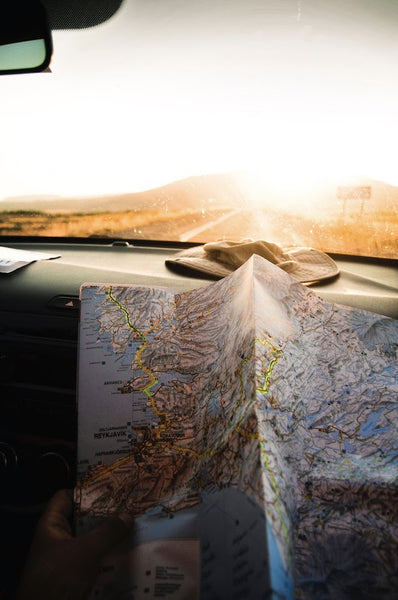
Not only does travelling help with our creativity, but it also enhances our cognitive ability, sometimes referred to as general intelligence. This ability includes the capacity to “reason, plan, solve problems, think abstractly, comprehend complex ideas, learn quickly, and learn from experience” (Plomin, 1999). These attributes are all connected to travel. The more you travel, the wiser you become. Adam Galinsky , a professor at Columbia Business School has stated “Foreign experiences increase both cognitive flexibility and depth and integrativeness of thought, the ability to make deep connections between disparate forms.”
The Benefits of Travelling Abroad: Travelling Enhances Your Tolerance towards Different People and New Cultures
Travelling is more than just about exploring new places. It also allows you to become more tolerant and open towards new cultures and people. It is a great opportunity to connect with locals and other like-minded people from around the globe. When you are willing to strike up a conversation with someone from a different background, the more you understand them and accept diversity, the better your tolerance level gets. Travelling teaches us to appreciate and value cultural diversity, traditions and appearances.

Not only does travelling help us embrace cultural, social and racial differences, travelling also increases our tolerance towards tough conditions and uncertainties. When we throw ourselves into an unfamiliar or less developed locality, we begin to become more accepting. It is not always a bed of roses everywhere we travel to, and things do not always go as planned, however, when we are aware of this, we get less bothered and enjoy the journey as much as we want.
Cabinzero’s CEO Neil Varden shared with us some stories about a time when he traveled to India - a country of hues and colors, and on top of all, a country of kindness. He was deeply touched by how friendly and greathearted local people were when he found out a notion followed in their mind, which is “Guest is God”. As he was travelling to Diu - a very small and unfamiliar town in India - on a bus, he happened to have a conversation with an Indian doctor. And since there was no direct bus to the town and it was very late at night, the doctor then invited him for a stay with his family for the night and offered him the surprisingly good generosity that he had ever received.
Another time when he was on a bus, and there was this Indian woman who offered him some biscuits when he was hungry, while she might not have enough to eat for herself and her children. Those are just among many warmhearted stories that he stumbled upon during his travel that made him realise one thing: you can really meet people who have almost nothing but still are generous with what they have.

The Benefits of Travelling: Travelling Is a Great Way to Boost Your Confidence
Neil also shared an example of how travelling can be a motivation for us to gain more confidence in ourselves and our passion. “Unbeknown to me, travelling when I was 22-26 changed my life long term, even today. The confidence gained by travelling to an unfamiliar country/culture gave me huge benefits when I started my business. I never had much fear knocking on doors of factories or visiting trade shows in countries I had never been to before. AND, for sure, my business and the brand would not exist if I hadn’t travelled. Since I travelled I spent all my time after trying to figure out how I could make travel a permanent fixture in my life and the business was built around this need, it is truly a lifestyle business.” - Neil Varden, CEO of Cabinzero .
Regarding this advantage of travelling, Mary Helen Immordino-Yang, an associate professor of education and psychology at the University of Southern California, says “What a lot of psychological research has shown now is that the ability to engage with people from different backgrounds than yourself, and the ability to get out of your own social comfort zone, is helping you to build a strong and acculturated sense of your own self.”

Stepping out of your bubble to travel, especially alone, is one way to prove that life has no limits. Travelling makes us realise that difficulties and obstacles can be handled well without the help of friends or family. When you see the powerful force within you, you start to build more trust in yourself and fear less. You believe in the certainty that things can be tackled one way or another, and it comes with the creative mind you get from travelling - nothing can stop you from achieving your passion and goals in life!
The Importance of Travelling: You Get Real-life Education from Travelling to a New Place
Real-life education comes naturally when you travel. Think about when you plan for a trip, when you solve a problem, or when you come across a situation that you have to use your body language to communicate. Those circumstances train you to be skillful as you travel. This benefit of travelling helps in your planning skills, problem-solving skills, improvising ability, and such. As you learn from your own experiences, these lessons are what you can equip yourself with and make use of in the long run.
What you learn in books is great, but travelling offers you the opportunity to learn more about something new every day. The moment you step out of those hotel doors and go out on the street, you learn at least one new lesson. Simple things like how people greet and talk to each other, how they behave tell you a bit about their culture. What’s more, travelling teaches you failures can turn into great hands-on lessons. It is true that travelling is not always glorious and can be hard at times. Let’s say the language barriers, for instance, it is surely possible to make mistakes with words here and there. Imagine going to the market and getting mixed up with the words for tomatoes and fish, this could be a bit embarrassing, but that’s where you get to learn.
The Benefits of Travelling: Travelling Make Memories from New Experiences
Do you usually take photos during your travel, or collect items like currencies or souvenirs after the trip? If not then we strongly suggest you to, as this is one of the benefits of travelling that could be valuable to you. Photos, or videos, that are taken from a trip, whether you keep them on your phone or post on social media, can remind you of the good time you have spent. Even an object you take home from the trip can really awaken your memories and feelings.
Memories from travelling are often connected with positive emotions, when you try something new, or the excitement you get from going to a new place that makes you feel at one with yourself and others around you. There are definitely times when you face unexpected obstacles on the journey, however, after you figure how to settle them, those memories are the life lessons that you have got a chance to learn.
If you travel in a big group, special memories from the trip can be turned into engaging stories that can last for a lifetime. When we travel, we are relaxed and open to show our true colors, which even adds more spices to the fun. This is the reason why travelling can be such a great bonding activity for families or groups of friends.
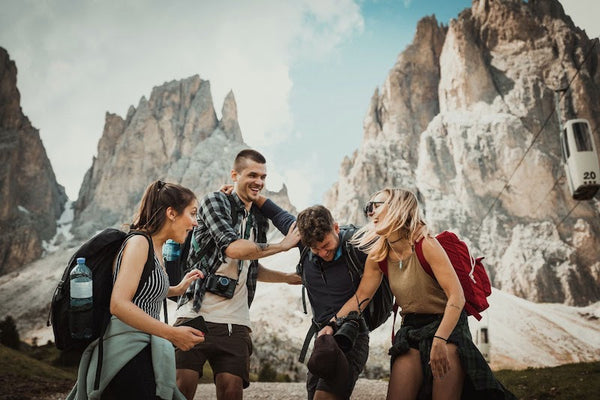
Why Travel is Good for You - How Travelling Helps You Understand Yourself More is Very Important
Travelling alone facilitates a process of introspection, allowing you to reflect on your own emotional and mental well-being. This is a wonderful benefit of travelling that you might not have thought of. When you are away from the stress of your daily life, be present and live in the moment, you are more likely to be conscientious about how you think and feel.
When you travel internationally, you get to observe how you feel being far away from your own culture. You observe the differences in people’s manners and behaviors, how people think and react to specific situations. From there, it is human instinct to compare the differences. You then start to explore and compare how it is different from your own culture and mindset, how other people are different from you, and why. Eventually, travelling will help in the process of understanding yourself more and give you a reflection on how you feel and think.
On the other side of this self-discovery process, travelling even changes you. You are not the same person after returning home from a journey. You have tons of intriguing stories to tell, you are more open and accepted. Moreover, travelling helps you reinvent yourself and re-evaluate your values in life after the lessons you learn on the road. Travelling teaches you to be more patient and curious about the world around you. This benefit undoubtedly helps in understanding and developing yourself.
The Benefits of Travelling: Travelling Helps Reduce Stress and Eases Anxiety
When you choose to leave your daily work to travel, you give yourself an opportunity to be more connected with nature. Fresh air and sunshine are a benefit to your health, fresh air boosts oxygen in your body and sunshine provides you with vitamin D. Being connected to these elements of nature makes you feel calmer, which definitely helps with stress and anxiety.
Whether you are a fan of hiking, cycling, climbing or diving, they are all a cure for depression while you travel. Fun and adventurous activities help you to relieve stress as you get to live and enjoy the moment. Leave your daily hassles away, pack your bag, go on a trip and get some air!

Why People Are Travelling - Travelling Gets You out of a Rut of Daily Life
Travelling is one of the great ways to get out of the hustle and bustle of your everyday life. It frees you from your daily schedule and allows you to have time for yourself to relax and explore. To some people, 9-5 jobs are occasionally mundane and repetitive, which makes a break from work totally a must. It is easy to get stuck in the workload and forget about our purposes and direction in life. Therefore, travelling gives us a pause from ordinary life and helps us get more focused on ourselves.
The Benefits of Travelling: World Travel Teaches Us to Appreciate the Beauty and Fragility of Nature and the Earth
If you ever wander off the rice terraces in the Philippines and Vietnam, dip in the Blue Lagoon in Iceland, or fall in love with the cherry blossoms season in Japan, you definitely feel a great sense of appreciation and gratitude for what Mother Nature has offered. Travelling opens your eyes to the absolutely breathtaking wonders of the Earth, especially if you gaze upon them with your own eyes.
World travellers are people who have witnessed the diversity of nature and wildlife, and how fragile this Earth can be. Travelling is eye-opening and enriching our responsibility of protecting the planet that we are living on. It makes us realise that nature and animals are suffering from human activities and raises more awareness about our crucial role in developing a more sustainable future.

Why Is Travelling Important? Travelling Helps You Find a New Purpose and Forces You to Take Action
For some people, travelling can be a life-changing experience. If you are at an important transition in your life and thinking of making a decision, travelling is a breath of fresh air to slow things down and it gives you time to think it through. If you are looking for a purpose and direction in life, try planning a trip to unfamiliar surroundings and experiencing it as much as you can. What if you see a meaning out of it and figure out what you are looking for?
Believe it or not, travelling can turn you into a better decision-maker. Travelling is about decision-making in the whole process, from planning a trip, to deciding a place to eat, or where to go, you need to be determined and actively leading the way. If you are confident in making those little decisions, it will build up your determination in bigger decisions in life.
Travel Makes You Embrace Your Home and Ordinary Life More - One of The Advantages of Travelling
We often tend to dream of travelling and those days off hitting the road while we’re working 9 to 5. However, when we travel, there are certain situations that you may find yourself miss the feeling of home and how convenient it is to be in your own comfort zone. You will begin to appreciate the essentials you have at home when you travel. The feeling of a comfy bed and pillows at home may pop in your mind when you spend days and weeks sleeping in hostels or camping tents. You may miss your own bathroom when you share it with other travellers in dorms and hostels. Those are the little things that you will appreciate when you are back home from a long journey.
What’s more, the language barrier is another aspect that can make you miss home when you travel. Of course, during the trip, you might be able to use some basic communication with the locals and can pick up several phrases here and there. However, you will definitely miss the feeling of being able to join in a more in-depth conversation, discussing politics, or expressing your opinions at some point.
The Benefits of Travelling: You May Find the Love of Your Life When You Travel and Meet New People
“Could you find love on the road?” Yes, it is possible. You meet plenty of like-minded people when you spend days hitting the road. Someone who shares the same values and mindset as you might come along unexpectedly and suddenly you feel connected to them. Especially when you travel, you open your mind and heart to new experiences, therefore, falling in love with someone is very likely to happen.

Travelling can indeed bring people closer, which is why couples choose to spend time together on a vacation to spice up their relationship. But what about meeting a total stranger and falling head over heels unexpectedly, while strolling on the riverside or a random beach? That sounds more intriguing. That random stranger might just be a fling or can turn into the love of your life, who knows?
It caught my attention when you said that you can get helping reducing stress when you engage in fun and adventurous activities while you travel. As you said, traveling gives you an opportunity to be more connected with nature. With this in mind, I will consider finding great travel ideas so I can plan my vacation. Since December last year, I have been feeling so stressed due to the divorce process that I had to go through, so it is important for me to find places where I can feel recharged and relaxed. Thanks for sharing this. https://www.homegrowngreat.com/discover/attractions/
It’s great that you mentioned that one of the health benefits of travelling is that when we travel to new surroundings, we press a restart button to our body and mind, which brings in fresh energy when we get back to our regular activities. My husband and I will go on vacation to a family resort this weekend with our family. I’ll share this with him since we really need to travel more often and destress from work. Thanks! https://edgeofthewilderness.com/resort-lodging-minnesota-northern.html
Interesting article. So many reasons to travel!
Leave a comment
Please note, comments must be approved before they are published
This site is protected by reCAPTCHA and the Google Privacy Policy and Terms of Service apply.
You may also like

- North America
- Significant Moments That Changed The...
Moments That Changed the Way We Travel: A Timeline

Commissioning Editor
The only thing guaranteed in life is change. A single invention has the power to change the course of history, as does a disaster – take the way Covid-19 is playing out in front of us. Sometimes we lose sight of that – the present moment feeling eternal, which isn’t a bad thing in an age of mindfulness. As a reminder of such change, Culture Trip looks back on the past 200 years to reflect on significant moments that altered the world of travel for good.
1802: the ‘puffer engine’ is invented.
It was more than two centuries ago that a Cornwall -born inventor and mining engineer called Richard Trevithick would complete the first iteration of a train – little did he know how central it would become to our everyday existence. The high-pressure “puffer engine” he patented was the first steam-powered locomotive engine on rails. Come 1829, another fellow, this time by the name of Robert Stephenson, who would later become known as the Father of Railways, designed the Rocket, an early locomotive of 0-2-2 wheels. It’s arguably one of Britain’s greatest feats of engineering and it set the wheels in motion for more to come.

1863: the first Tube travels underground in London

1903: it’s liftoff for The Wright Brothers’ Flying Machine
A century on from train innovation comes the first aircraft to make a controlled flight. It was for 12 seconds, travelling 120ft (37m), and it was a massive feat for American aviation pioneers Orville and Wilbur Wright. Many aviators tried to get their inventions off the ground around the same time – and for that reason there is some debate as to who, indeed, was the first to achieve a seamless flight. Some make a case for German aviator Gustave Whitehead; in 1901 a newspaper reported that he had completed a flight in Connecticut. Meanwhile, others argue that it was Brazilian inventor Alberto Santos-Dumont; in 1906 his kite-like contraption flew some 220m (722ft) in Paris. Let your inner conspiracy theorist run wild.
1912: RMS Titanic sinks en route to New York from Southampton
We have actors Leonardo DiCaprio and Kate Winslet – along with a stellar soundtrack from Celine Dion – to credit for bringing to life the tragic sinking of the RMS Titanic in 1912. It was in the early hours of 15 April that the world’s then-largest man-made “unsinkable” ship struck an iceberg, just four days into her maiden voyage from Southampton, UK, to New York. Travelling over capacity, with 3,300 people on board, the ship only had lifeboats for a third of them. Only 492 passengers and 214 crew survived. As a consequence, ship design changed, an International Ice Patrol was established, and liners always travel with enough lifeboats.

1919: the first non-stop transatlantic flight proves the impossible
Flying a modified World War I Vickers Vimy bomber, British aviators John Alcock and Arthur Brown went where others could never have imagined: across the Atlantic Ocean. In 16 hours, they flew from Newfoundland , the most easterly province of Canada, to Cliften in Ireland. Then, in 1927 – propelled (pardon the pun) by his doubters – Charles Lindbergh became the first pilot to fly solo non-stop across the Atlantic, from New York to Paris, in 33 hours. Five years later, Amelia Earhart became the first woman to make the solo trip.
1952: a golden age of air travel is born as BOAC goes commercial
By the 1950s, aviation had come a long way from The Wright Brothers’ Flying Machine. The British Overseas Airways Corporation made another world first: a commercial jet service, designed by British engineer Geoffrey de Havilland. Enter a golden age of air travel. Well, for wealthy celebrities and politicians, at least. It was an affair to get dressed up for: think Sunday best and fine jewellery, with lobster and champagne on the menu. The flight that kicked off this era of luxury jet travel journeyed from Johannesburg to London, and the rest is history – with flying today a far cry from this once-elusive and rather chic club.

1964: Japan introduces the world to high-speed trains
The concept of high-speed rail isn’t anything out of the ordinary for us today. Fancy going to Paris from London? The Eurostar will get you there in just over two hours. How about Paris to Champagne? That will be 40 minutes on the TGV. But pre-1964, the idea of such speedy land-based travel would have been unfathomable – until Japan unveiled a high-speed rail system called the Tōkaidō Shinkansen . Complete with their signature bullet noses, the first of these trains travelled at 210kph (131mph), while trains on that same network can reach a speed of 320kph (199mph) today. Though this still isn’t enough for the Japanese, who are set to unveil an even faster version in 2030. Speedy Gonzales.
1969: the Jumbo Jet brings affordable flying to the masses
1969 was a big year: as Commander Neil Armstrong became the first person to set foot on the moon, a Boeing 747 Jumbo Jet 231ft (70m) long, took to the skies with 490 passengers on board. It quickly became known as the Queen of the Skies and a gateway for the masses to travel affordably – now package holidays in warmer climes were calling. The airliner retained its title of the largest civilian plane until 2007, when the Airbus A380, with its gargantuan 868-passenger capacity (and encore of screaming babies guaranteed), came along and nabbed the accolade. Concorde also made its first flight in 1969 – but, notoriously reserved for an exclusive jetsetters’ club , its impact could never match that of its jumbo sister.
1974: Navstar launches, reshaping navigation
For that annoying voice we all know and love so well that tells us to “take the first left at the roundabout” three times more than we need to hear it, we have the American scientist and inventor Roger L Easter to thank. And while GPS has its roots in the Sputnik era (the first artificial earth satellite, launched by the Soviet Union in 1957), it wasn’t until 1974 that it hit our roads. In collaboration with Naval Air Systems Command, Easter created and patented a 24-hour satellite GPS called Navstar. Back then, it was the best thing since, well, physical road maps. Sorry, road maps.
1978: Unesco lists its first World Heritage sites, birthing the bucket list
A destination is always more in demand when Unesco confers World Heritage site status upon it. This recognition is based on whether it offers “outstanding universal value” in terms of geographic and historical significance. Drawn up in 1978, the first list included just a dozen sites (dubbed “properties”) such as Yellowstone National Park in the United States and the Galápagos Islands in Ecuador. It served as the first benchmark of must-visit locations, and the bucket list as we know it was born. Today this ever-fluctuating list includes just shy of 1,000 sites, among the most famous of which are Machu Picchu in Peru and the Taj Mahal in India.

2001: 9/11 attacks shakes the world and collective confidence in flying
On 11 September 2001 , two hijacked airplanes smashed into the twin towers of the World Trade Center in New York, with a third hitting the Pentagon in Washington DC. Almost 3,000 people were killed, and the date is now observed as an annual day of mourning. It shocked the world – as well as the US economy, which fell sharply, and battered global confidence. People lost their faith in flying, and flying itself became an altogether different experience. Security became paramount: liquids were inspected any over 100ml (3.4 fl oz) were confiscated; pat-downs and body-scans became the norm; and unattended pieces of luggage were considered a serious threat.
2004: Richard Branson sets out plan for commercial space travel
The idea of travelling to outer space used to be reserved for highly trained astronauts and TV characters like The Jetsons. That is, until Sir Richard Branson had a grand idea. Following his Virgin conquests of air (Virgin Atlantic), land (Virgin Trains) and sea (Virgin Voyages), the entrepreneur turned his attention to space. He called this new venture Virgin Galactic. The idea? To take us mere mortals out into the big void ourselves. In 2018, the first suborbital flight took three people into space, and 2020 is set to be the year in which commercial space travel really takes off, with SpaceX, Boeing and the European Space Agency all vying for first dibs. A whole new space race is on.
2020: Covid-19 sweeps across the globe and self-isolation becomes the new normal
As we waved goodbye to 2019 and rang in the new decade, we did so with optimism. But it quickly dwindled. First came the Australian bushfires that burned 5m hectares (12,355,270 acres) of land, killed 500m animals and at least 17 people. Then, Covid-19 . A member of the coronavirus family, it’s thought to have originated in a wildlife market in Wuhan, China, in December 2019 – but it wasn’t confined to the Chinese province for long. By April 2020, it had spread across the entire world, starting with one or two cases in each country, before multiplying and infecting millions. In an attempt to stop this unknown entity in its tracks, retreating indoors and self-isolating are the new normal. Borders closed, airlines ceased operations, and trips beyond the front door were restricted to essentials only. A first in recent history, we’re truly in uncharted territory.

Since you are here, we would like to share our vision for the future of travel - and the direction Culture Trip is moving in.
Culture Trip launched in 2011 with a simple yet passionate mission: to inspire people to go beyond their boundaries and experience what makes a place, its people and its culture special and meaningful — and this is still in our DNA today. We are proud that, for more than a decade, millions like you have trusted our award-winning recommendations by people who deeply understand what makes certain places and communities so special.
Increasingly we believe the world needs more meaningful, real-life connections between curious travellers keen to explore the world in a more responsible way. That is why we have intensively curated a collection of premium small-group trips as an invitation to meet and connect with new, like-minded people for once-in-a-lifetime experiences in three categories: Culture Trips, Rail Trips and Private Trips. Our Trips are suitable for both solo travelers, couples and friends who want to explore the world together.
Culture Trips are deeply immersive 5 to 16 days itineraries, that combine authentic local experiences, exciting activities and 4-5* accommodation to look forward to at the end of each day. Our Rail Trips are our most planet-friendly itineraries that invite you to take the scenic route, relax whilst getting under the skin of a destination. Our Private Trips are fully tailored itineraries, curated by our Travel Experts specifically for you, your friends or your family.
We know that many of you worry about the environmental impact of travel and are looking for ways of expanding horizons in ways that do minimal harm - and may even bring benefits. We are committed to go as far as possible in curating our trips with care for the planet. That is why all of our trips are flightless in destination, fully carbon offset - and we have ambitious plans to be net zero in the very near future.

Guides & Tips
How to make the most of your holiday time if you're in the us.

Travel in America: Top 5 Trip Ideas

Travel With Culture Trip: Who Are Our Local Insiders?

The Best Couples Retreats in the USA

How to Book a Private Tour with Culture Trip

Top Trips for Embracing Your Own Backyard

See & Do
Gift the joy of travel this christmas with culture trip gift cards.

The Best Solo Travel Tours in the US


The Benefits of Booking a Private Tour with Culture Trip

Everything You Need to Know About Booking a Private Culture Trip

Top TRIPS by Culture Trip for Ticking Off Your Bucket List

5 Ski Resort Scenes You Can't Miss This Year
Culture trip spring sale, save up to $1,100 on our unique small-group trips limited spots..

- Post ID: 1001441798
- Sponsored? No
- View Payload
Travel History: Definition, Importance and How to Make Travel HistoryTravel History
These days everyone is searching about what is travel history, its importance and how can we make a good travel history, which can help us to get visa approval for USA, Canada or other high profile countries.
These days visa refusal rate of USA, Canada, and other developed countries are high. Some people get visa refusal due to lack of travel history. If you don’t have a good travel history or your passport is new and blank, then there is an excellent chance to get visa refusal. Here you know all about travel history in this article. Let’s start!
What is Travel History?
Travel history is a track record of a traveler/visitor past visits to outside of their home country. Whenever someone visits into a foreign country than he /she got an immigration stamp or a visa stamp on their passport, this records of stamps on the passport is called travel history. Travel history tells about all the recent visits of passport holder such as where he/she travel or when he/she travel.
A good travel history helps a lot to get visa approvals for developed countries like as USA, Canada and, United Kingdom. Travel history is not an essential or required document/condition for obtaining a visa, but if you made a good travel history, then it can increase your chance of visa approval.
Why is Travel History Important?
Travel history is a record of your visits where you travel in the past. Every councilor or country wants to know where you travel in the past because they think if you come in their country directly without visiting another country than there is a chance that you don’t go back your country.
Why they feel so because this happened in 1980 when there were not strong visas law as compares to today, and mass no of people went to western countries on a tourist visa, and they don’t come back to their country. As a result, conditions of immigration crises arise. To control or anticipate this immigration crisis, they made strict visa norms and rules which followed these days.
Now they check travel history before granting a visa. A good travel history assured to councilor that you are a genuine tourist or travel or your sole purpose of traveling is not immigration. If you want to make a strong impression on the visa officer, then make a good travel history first.
How to Make Travel History?
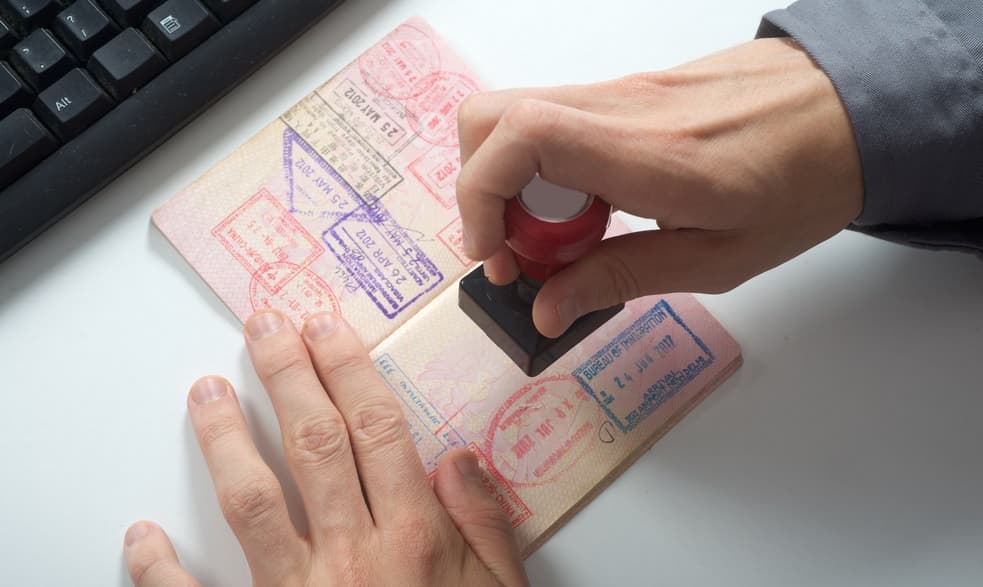
How can we create travel history and take care of some points which helps you to get the approval of visa? If you want to create travel history then starts with visa on arrival countries or E Visa countries. First, check the list of allowed countries which gives Visa on arrival or E Visa on your passport.
You can travel Mauritius, Seychelles, Cambodia, Philippines, Hong Kong. The benefits of visiting these countries are that you will enjoy here and also you will get an immigration stamp on your passport. The risk factor is zero.
Visiting five to six countries is suitable for creating a good travel history. If you visited these countries in a single trip than problems can arise. Make sure that you travel 1 or 2 countries in a single tour . Take a gap of 1 month or 2 months between your trip because it gives a positive sign that you are a genuine traveler and you don’t visit these countries only for creating travel history.
If you are applying for highly developed countries like the USA, Canada, UK and you visited in Thailand, Sri Lanka then there is a chance that you don’t get approval. Travel some prominent countries like Hong Kong, China, Russia, Seychelles before applying for a visa because it gives a good impression that you are a genuine traveler. You can increase your visa rating by following these points, and these will helps you in getting visa approval.
How to Check Travel History?

Travel history is vital for getting visa approvals of various developed countries like the USA, UK, and Australia. Travel history is a track record of your international visits to a foreign country. Every year people change their old passport to a new passport and forget about their recent visits to the countries. New passports are blanks so there is a possibility that they can forget about their many foreign visits and proper dates of travel.
It is not possible to search into their travel archive for old plane tickets; travel itineraries to arrange travel history in a systematic way. Even worse, they also forget their visa is still valid or not to the specific countries and when they travel to this country. Don’t worry; you can check your travel history through online and offline.
If you have your old passport, then there are not any problems because whenever you enter or exit from a foreign country, you got an immigration stamp on your passports. You can track your travel history by the help of visa stamps and immigration stamps.
If you change your old passport to new and you don’t have your old passport, then you can also track down your USA travel history online. Go to this link https://i94.cbp.dhs.gov/I94/#/home . It is the official website of US Customs and Border Protection.
Click on Need a History of Your Arrivals & Departures. Fill your details like name, date of birth, or passport no. After that click on next and you will get your travel history details. Print these results for further reference.
- Credit cards
- View all credit cards
- Banking guide
- Loans guide
- Insurance guide
- Personal finance
- View all personal finance
- Small business
- Small business guide
- View all taxes
You’re our first priority. Every time.
We believe everyone should be able to make financial decisions with confidence. And while our site doesn’t feature every company or financial product available on the market, we’re proud that the guidance we offer, the information we provide and the tools we create are objective, independent, straightforward — and free.
So how do we make money? Our partners compensate us. This may influence which products we review and write about (and where those products appear on the site), but it in no way affects our recommendations or advice, which are grounded in thousands of hours of research. Our partners cannot pay us to guarantee favorable reviews of their products or services. Here is a list of our partners .
The Guide to Chase’s Travel Portal

Many or all of the products featured here are from our partners who compensate us. This influences which products we write about and where and how the product appears on a page. However, this does not influence our evaluations. Our opinions are our own. Here is a list of our partners and here's how we make money .
Table of Contents
Who can use Chase's travel portal?
How to use chase's travel portal, other things you can do in chase's portal, chase travel contact options, chase's travel portal can be lucrative.
Chase Ultimate Rewards® points are among the most useful rewards you can earn. When it comes time to redeem them, you will be directed to Chase's travel portal. This is where you can book flights, hotels and rental cars with points, redeem them for merchandise and gift cards, or transfer points to other programs.
Should you redeem points to pay for a trip instead of using cash or transfer them to a loyalty program partner to get better value? You'll need to do a little homework to find the right answer as each situation is different.
Chase points are the currency you earn when using cards like Chase Sapphire Preferred® Card or Chase Sapphire Reserve® . They are superior in many ways to other point currencies because you earn more than one penny in value per point with these two cards. For example, when redeeming through Chase's travel portal, the Chase Sapphire Reserve® will net you 1.5 cents in value per point and the Chase Sapphire Preferred® Card will net you 1.25 cents in value per point. When you transfer to a partner, your per-point-value may be even greater.
With the travel portal, you can redeem points to pay for an entire trip or you can use a mix of points and cash to cover a travel booking. You can also pay all in cash, earning 5 to 10 points per $1 spent, depending on the card you have. Using points for travel is the most valuable way to extract value from Chase Ultimate Rewards® for most people.
It's an efficient website, but some irritants snag even savvy travelers. Let's dig into Chase's travel portal's good and bad. You'll find that it is mostly good, if not great.

Chase cards vary in earning and redemption benefits so you will want to pay attention to which one you use, especially if you have more than one card. The most valuable cards earn Ultimate Rewards® points, but some Chase cards, like the United℠ Explorer Card , earn miles or points in that co-branded program (in this example, United MileagePlus miles ).
Let’s review the cards that earn Chase Ultimate Rewards®, with the most rewarding cards first. Keep in mind that if you have more than one of these cards, you can move points between Chase Ultimate Rewards® accounts to redeem them from an account that delivers more cents per point in value.
These cards earn Chase Ultimate Rewards® and provide access to Chase's travel portal:
Chase Sapphire Reserve® .
Chase Sapphire Preferred® Card .
Ink Business Preferred® Credit Card .
Chase Freedom Unlimited® .
Chase Freedom Flex℠ .
Ink Business Cash® Credit Card .
Ink Business Unlimited® Credit Card .
Chase Freedom Rise Credit Card.
There is an important perk to remember if you have multiple cards. Since the Chase Sapphire Reserve® card offers 1.5 cents in value per point and the Ink Business Preferred® Credit Card and the Chase Sapphire Preferred® Card offer 1.25 cents in value, it is best to redeem points from these accounts rather than any other Chase card. c
If you have one of those two premium cards and another Chase card (like Chase Freedom Unlimited® , for example), you can move your Ultimate Rewards® points from the Chase Freedom Unlimited® account to a premium card’s account (like the Chase Sapphire Reserve® card).
This strategy allows you to unlock half a cent more in value in seconds. It’s one of the best benefits of Ultimate Rewards® when you have a premium card and one of its no-fee cards.
Want to earn a bunch of points quickly to make a redemption? The sign-up bonuses on these cards can rake in extra points if you meet the terms and conditions.

on Chase's website

• 5 points per $1 on travel booked through Chase.
• 3 points per $1 on dining (including eligible delivery services and takeout), select streaming services and online grocery purchases (not including Target, Walmart and wholesale clubs).
• 2 points per $1 on other travel.
• 1 point per $1 on other purchases.
Point value in Chase's travel portal: 1.25 cents apiece.
• 10 points per $1 on Chase Dining, hotel stays and car rentals purchased through Chase.
• 5 points per $1 on air travel purchased through Chase.
• 3 points per $1 on other travel and dining not booked with Chase.
Point value in Chase's travel portal: 1.5 cents apiece.
• In the first year, 6.5% cash back on travel purchased through Chase, 4.5% cash back on drugstores and restaurants, and 3% on all other purchases on up to $20,000 in spending.
• After that, 5% cash back on travel purchased through Chase, 3% cash back at drugstores and restaurants, including takeout and eligible delivery service, and unlimited 1.5% cash back on all other purchases.
Point value in Chase's travel portal: 1 cent apiece.
Earn 75,000 bonus points after you spend $4,000 on purchases in the first 3 months from account opening. That's over $900 when you redeem through Chase Travel℠.
Earn 75,000 bonus points after you spend $4,000 on purchases in the first 3 months from account opening. That's $1,125 toward travel when you redeem through Chase Travel℠.
Earn an additional 1.5% cash back on everything you buy (on up to $20,000 spent in the first year) - worth up to $300 cash back!
Earn a $200 Bonus after you spend $500 on purchases in your first 3 months from account opening.
» Learn more: The best travel credit cards right now
Here’s a primer on what you can and cannot do with Ultimate Rewards® points.
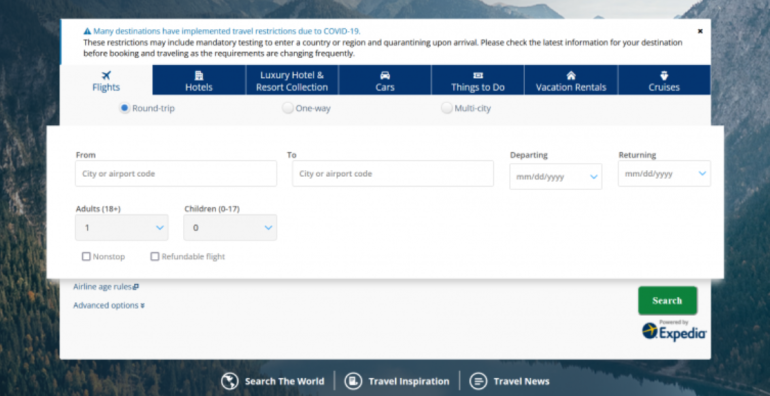
Log in to your account, then navigate to the Chase Ultimate Rewards® tab on the right of the screen. If you have more than one card that earns this currency, you can see each balance and select the account from which you want to redeem points.
Once you select the card, you’ll be taken to a homepage that shows the points you have earned and how you can redeem them. We recommend sticking to travel redemptions rather than using points for merchandise as the value diminishes significantly with the latter.

Select the "Travel" tab at the top of the screen. From here, you can decide whether to transfer points to a partner or redeem them as cash for a trip.
One of the best perks of using this travel portal to make a points redemption is that you still earn frequent flyer miles on most airline tickets since these are booked as a revenue ticket (not as an award redemption like when using airline miles to book a flight).
How to book award flights in Chase's travel portal
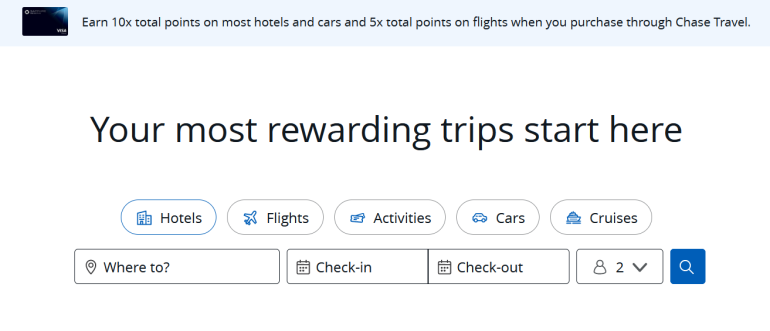
This is one of the more popular features of using points, but keep in mind it doesn't feature all airlines, which can be frustrating. Even if you find a flight on an airline's website or third-party booking site, it doesn't mean it will be available at Chase.
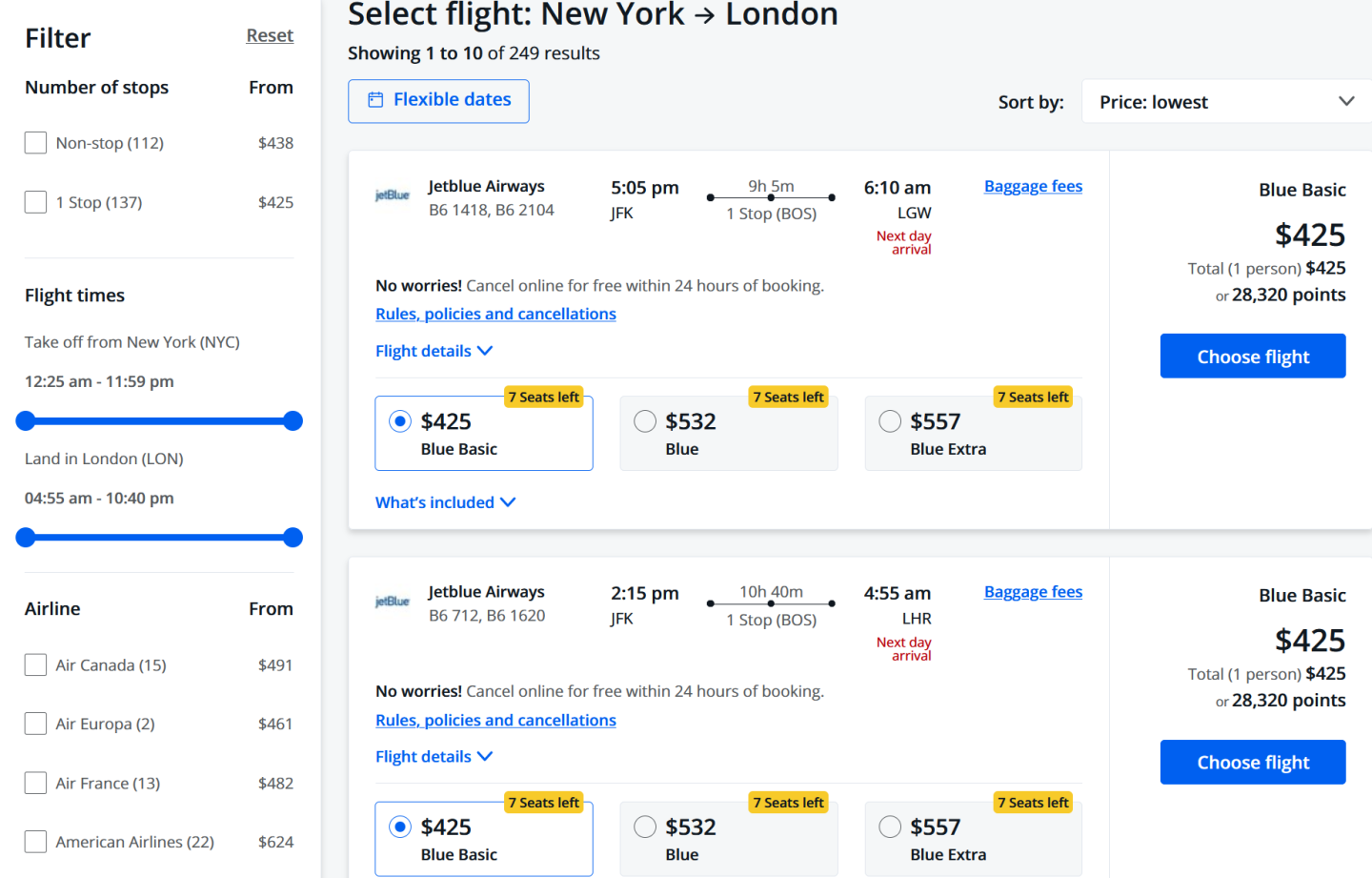
Enter the relevant details in the search bar to find a flight. Results can be filtered by stops, airline or price. Another benefit of this portal is that you aren't subject to award seat availability in the same way you might be when redeeming miles through an airline's program.
If there is a seat that could be bought with cash, you can usually redeem points for it. Plain and simple.

Compare how many miles you would need if booking directly with the airline with what Chase is charging.
If it would cost fewer points to book directly with the airline, you’ll want to use miles instead. For example, Delta co-branded American Express cardholders can often redeem their miles like cash on Delta’s website (at 1 cent per mile’s value). That’s just average, but if it is cheaper than what Chase is charging, consider that the better option. But don’t forget that airlines will add on taxes and fees when redeeming miles . Airfare booked with Chase Ultimate Rewards® points don't have additional costs tacked on — these are already bundled into the fare.
Another important note is that some low-cost airlines like Allegiant don't appear in search results. If you want to travel on a budget airline, then you'll need to visit those websites to compare fares.

You can pay in cash, points or a combination. Chase will display particular details about your fare, like whether assigned seats or checked bags are included. This may not take into account any elite status perks you hold.
How to book hotels in Chase's travel portal
You can also redeem points for hotel stays using Ultimate Rewards® points. This is great news, especially when staying at hotels where you may not have elite status or don't care about elite perks or points earned.
Keep in mind that when making a reservation outside a hotel’s official reservation channels, you won’t earn points in its program or be able to take advantage of elite status benefits. So if you have status with a hotel chain, this isn't the best value unless you are willing to forgo those benefits.

Making a reservation is straightforward. Enter the city and travel dates to see a list of hotels available for redemption. Then, you can redeem points or pay in cash for your trip.

Like with flights, compare the cost of Chase Ultimate Rewards® points with the number of points a hotel’s program is charging. A particular favorite is World of Hyatt, which still uses an award chart and, as a transfer partner of Chase Ultimate Rewards®, can often deliver more favorable deals when using Hyatt’s points rather than Chase points.

For example, it would cost about 9,000 Chase Ultimate Rewards® points to redeem a night at Hyatt Place London Heathrow Airport. But, if you transfer points to World of Hyatt, you would need 5,000 points for the same night’s stay.
One of the booking tabs also leads to the Chase Luxury Hotel & Resort Collection . This subset of high-end hotels delivers bonus perks like free breakfast, a $100 hotel credit and room upgrades, depending on the property and other things.
You can book directly through Chase or redeem points and be eligible. It’s nice to have elite status-style perks at a hotel where you may not have status or that doesn't have a loyalty program.
How to book car rentals in Chase's travel portal
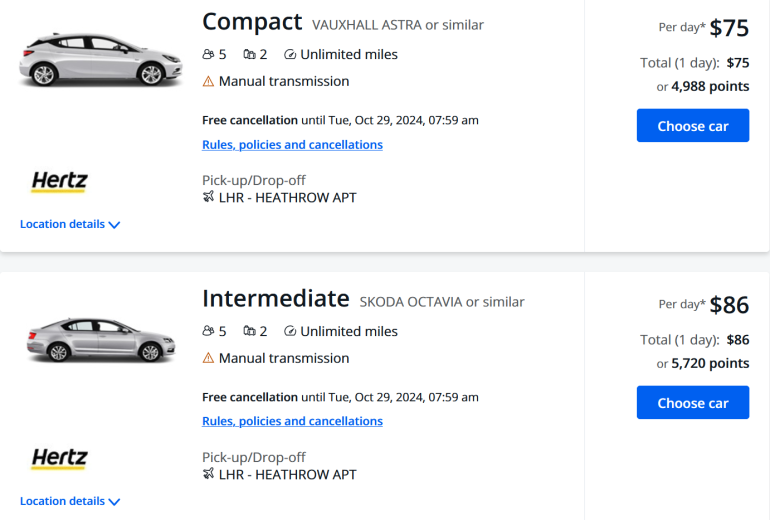
This is a great place to reserve rental cars using points, and Chase rental car insurance benefits apply when using the card and paying with points. But, for that to be the case, you will want to pay for part of the rental in cash so the insurance benefits are activated. To do that, pay with a combination of cash and points, and decline the rental company's insurance first.
How to book activities in Chase's travel portal
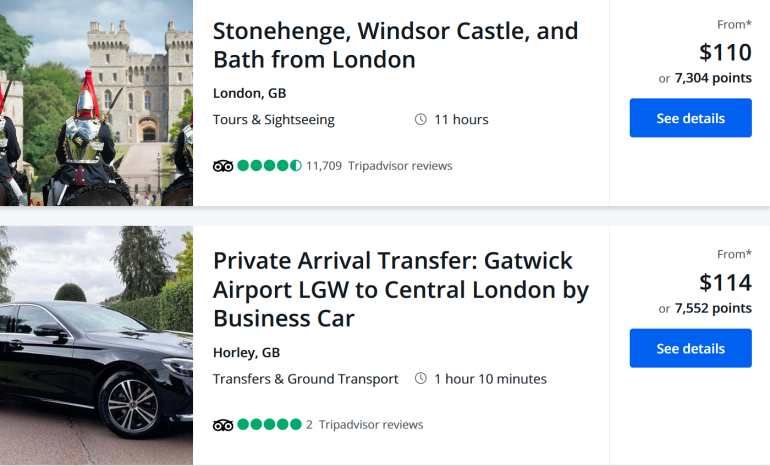
Activities available for booking through Chase's travel portal include tours and experiences at home or when traveling and airport transfers. Price comparison plays a role here, too, since many hotel brands have their own platforms like Marriott Bonvoy Moments or FIND Experiences from World of Hyatt. These allow you to redeem points for experiences.
Check which program is cheaper before redeeming Chase points if you find similar options in either program.
How to book cruises in Chase's travel portal
Since cruise bookings can be more complex, you will need to call Chase Ultimate Rewards® at 855-234-2542 to make a reservation. There are many ways to earn multiple points when booking a cruise that may be better than using Chase, but when redeeming points for a cruise , there can be a lot of value.
Using Chase's portal to make a travel reservation is also strategic, as depending on your card, you can earn a healthy stash of points this way. Just be sure to compare the benefits you can earn with the opportunity cost of booking elsewhere.
Benefits of booking travel in Chase's portal
Let’s say you have a premium card like Chase Sapphire Reserve® . It earns 5x points per $1 when booking flights through the portal. The sweet spot is when using this card for hotel stays and rental cars booked via the portal for 10x points per dollar spent. Consider what’s in your wallet, and decide which card will net the most points.
Another benefit is that you will earn miles from flights booked through the portal, even when redeeming Chase Ultimate Rewards® points since these are viewed as a revenue ticket.
Remember, you will want to compare if it is cheaper to redeem airline miles directly through a carrier’s redemption program or if you can use fewer points by redeeming Chase points via the portal.
Sometimes it might make more sense to transfer points from Chase to an airline partner when redeeming a flight (or a hotel program when making a hotel stay). Be as vigilant with price comparison when redeeming miles and points as you would when using cash.
Does Chase's travel portal price match?
No. You cannot submit a lower fare elsewhere for a price guarantee here since this isn't a publicly available site. It is only available to those who have a Chase card.
What else you need to know
When booking through this reservation site, keep in mind that most airlines and hotels cannot assist directly with a reservation. They see this as a third-party booking through Expedia and will direct you to Chase's agents.
Many travelers report the experience can be frustrating when travel disruptions or cancellations occur. Agents are friendly but can sometimes be limited in their abilities, often reading prompts on their screens in international call centers.
It can be a hazard booking a reservation with a third party, but the trade-off in redeeming points is worth it for some travelers.
If you do need to contact a Chase portal agent for support on a reservation made through the site — whether for a flight, hotel booking, car rental or activity — you've got one option: a good, old-fashioned telephone call.
Dial 866-331-0773 for assistance regarding changes or cancellations to your bookings.
You might have better luck dialing the support line for your specific Chase card. You might opt to give one of these a try:
Chase Sapphire Reserve® : 855-234-2542.
Chase Sapphire Preferred® Card : 866-331-0773.
All other cards: 866-951-6592.
If you compare prices and consider the opportunity cost of using the portal instead of booking elsewhere, you can almost always come out ahead.
You can save money, earn bonus points and travel better with transferable loyalty points like Chase Ultimate Rewards®. They have the flexibility and versatility necessary to deliver excellent value on travel (rather than being locked into one airline or hotel loyalty program). With the right card (or suite of cards), you’ll be able to accumulate points and benefits.
How to maximize your rewards
You want a travel credit card that prioritizes what’s important to you. Here are our picks for the best travel credit cards of 2024 , including those best for:
Flexibility, point transfers and a large bonus: Chase Sapphire Preferred® Card
No annual fee: Bank of America® Travel Rewards credit card
Flat-rate travel rewards: Capital One Venture Rewards Credit Card
Bonus travel rewards and high-end perks: Chase Sapphire Reserve®
Luxury perks: The Platinum Card® from American Express
Business travelers: Ink Business Preferred® Credit Card
1.5%-5% Enjoy 5% cash back on travel purchased through Chase Travel, 3% cash back on drugstore purchases and dining at restaurants, including takeout and eligible delivery service, and unlimited 1.5% cash back on all other purchases.
Up to $300 Earn an additional 1.5% cash back on everything you buy (on up to $20,000 spent in the first year) - worth up to $300 cash back!
1x-5x 5x on travel purchased through Chase Travel℠, 3x on dining, select streaming services and online groceries, 2x on all other travel purchases, 1x on all other purchases.
75,000 Earn 75,000 bonus points after you spend $4,000 on purchases in the first 3 months from account opening. That's over $900 when you redeem through Chase Travel℠.
1%-5% Earn 5% cash back on up to $1,500 in combined purchases in bonus categories each quarter you activate. Earn 5% on Chase travel purchased through Ultimate Rewards®, 3% on dining and drugstores, and 1% on all other purchases.
$200 Earn a $200 Bonus after you spend $500 on purchases in your first 3 months from account opening.


Discover 10 Surprising Benefits of Travel for Your Mind, Body, and Soul
Travel is a powerful way to explore new cultures, meet new people, and gain a fresh perspective on the world. In this article, we’ll explore the many benefits of travel and how it can positively impact our lives. Whether it’s improving our mental health, broadening our cultural horizons, or providing valuable educational experiences, travel offers something for everyone.
The Benefits of Travel
Traveling can be a life-changing experience that provides numerous benefits for the mind, body, and soul. Indeed, it can enhance one’s life in many ways.

1. Enhanced Creativity
Traveling to new and unfamiliar places can spark creativity and inspire new ideas. Exploring different cultures, art, and history can ignite the imagination and lead to new perspectives. Especially, visiting art museums around the world will significantly boost your creation to another level.
Furthermore, travel provides a stimulating and novel environment that can help stimulate creativity. Whether it’s new sounds, smells, or sights, exploring different cultures can offer inspiration for creative thinking. Exposure to new languages, arts, music, and food can spark the imagination, leading to new innovations.
2. Better Mental Health
In fact, travel has been shown to have a positive impact on mental health. Traveling can help reduce stress and anxiety, improve mood, and provide a sense of happiness and fulfillment. Indeed, breaking free from routine, exploring new places, and engaging in new experiences can help reduce stress and improve mood. Also, new experiences and environments can refresh the mind and improve mental well-being. In fact, Norris on Medical News Today points out that tourism has the potential to positively affect well-being and quality of life through various factors.
Plus, travel can provide an opportunity for self-discovery and personal growth, leading to increased self-esteem and confidence.
3. Increased Appreciation
Appreciation is one of the top benefits of travel. Traveling can create memories and experiences that enhance one’s recognization and enjoyment of life and foster a deeper sense of gratitude. Truly, seeing new places and meeting new people can create lasting memories and a greater appreciation for the world.
4. Stronger Relationships

Traveling with loved ones or meeting new people while traveling can create stronger bonds and foster deeper connections. Shared experiences and memories can create lifelong friendships and strengthen existing relationships. Who knows if a special relationship can be formed after a trip?
5. Improved Problem-Solving Skills
Traveling can present unexpected challenges and opportunities to problem-solve. As a result, it can improve one’s critical thinking and decision-making abilities. Then, these skills can be transferred to other areas of life and lead to personal growth.
6. Fosters Interpersonal Skills
In fact, traveling requires stepping outside of one’s comfort zone. You have many chances to interact with new people from different backgrounds which helps develop interpersonal skills. Moreover, being exposed to different cultures, languages, and social norms can help foster a greater understanding of others and can promote empathy, communication, and collaboration.
7. Increased Adaptability

Traveling to new places requires one to be adaptable and flexible. As a result, it can improve one’s ability to handle change and new situations. To elaborate, you may wake up. This skill can be beneficial in all areas of life and improve one’s overall well-being.
8. Provides Learning Opportunities
Traveling can offer a wealth of learning opportunities, from history and art to science and technology. Exploring museums, landmarks, and cultural sites can provide an opportunity to learn about different aspects of the world. In addition, travel can offer hands-on experiences that can help solidify learning. For instance, learning a new language, trying new foods, or participating in local activities in new places.
9. Open More Chances of Earning
Traveling gives you the opportunity to meet professionals, learn new skills, and see new businesses along the way. Besides that, you can join conferences, and trading fairs in cities which give you more knowledge, and info, and expand your network. All of those things give you chances to have more income for your journey exploring the world.
Vietnamese people get benefits from traveling. For example, restaurant owners usually travel to other places and find good dishes that they can do in their restaurants. Good new foods always attract many customers. Additionally, construction engineers can learn from other architecture to improve their skills.
10. Promotes Personal Growth
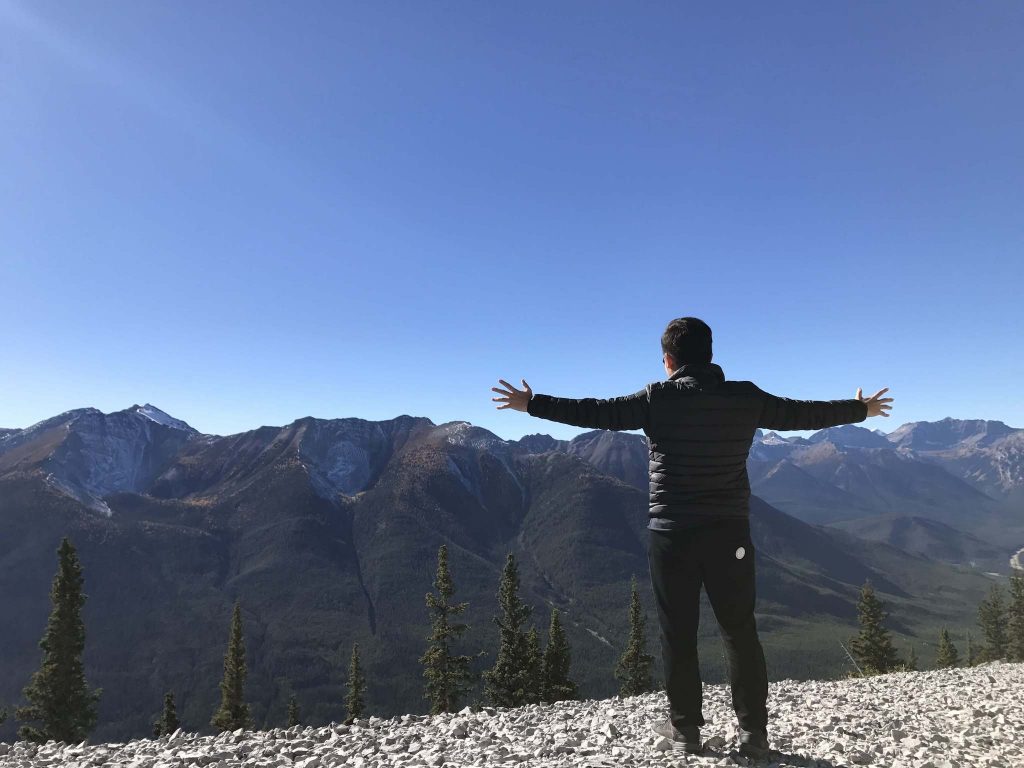
Travel has the power to transform individuals, promoting personal growth and development. By exploring new cultures and perspectives, individuals can gain a better understanding of themselves and the world around them. Travel can also provide an opportunity to step outside of one’s comfort zone, overcome challenges, and develop new skills. In other words, traveling makes you smarter .
Frequently Asked Questions
Why is travel important to life.
Travel is important to life for many reasons. Firstly, it can help individuals broaden their perspectives, gain new experiences, and develop new skills. Secondly, it can promote personal growth and development and can help alleviate stress and anxiety, leading to improved mental health. Plus, travel can provide an opportunity for self-discovery, learning, and creativity. Finally, by experiencing different cultures, individuals can develop empathy, understanding, and appreciation for others. Travelers can also foster greater harmony and cooperation across borders and cultures.
What do You Gain from Traveling?
Traveling provides us with unique opportunities to learn, grow, and explore. Indeed, we can gain new insights into different cultures and traditions, challenge our assumptions, and make new connections.
What is the Value of Traveling?
The value of traveling is immeasurable. It can help us improve our physical and mental health, broaden our cultural understanding, and expand our knowledge and skillsets. Additionally, it can promote social connections and relationships.
There are so Many Benefits of Travel
Travel offers a wide range of benefits that can have a positive impact on individuals, communities, and the world. From physical and mental health benefits to cultural and educational experiences, travel can broaden perspectives, improve personal growth, and promote social connections. Travel can also stimulate economic development and promote environmental sustainability. As such, it is important for individuals to prioritize travel and make it a regular part of their lives. By doing so, they can reap the many benefits that travel has to offer.
The Broad Life introduces to you great, inspirational books for your wanderlust. They aren’t just simple travel, each book recounts the author’s journey to discover and learn many awesome things from new civilizations and places. > READ MORE: THE BEST TRAVEL BOOKS OF ALL TIME
IF YOU LIKE THE POST ABOUT THE BENEFITS OF TRAVEL, ‘PIN IT’ NOW !
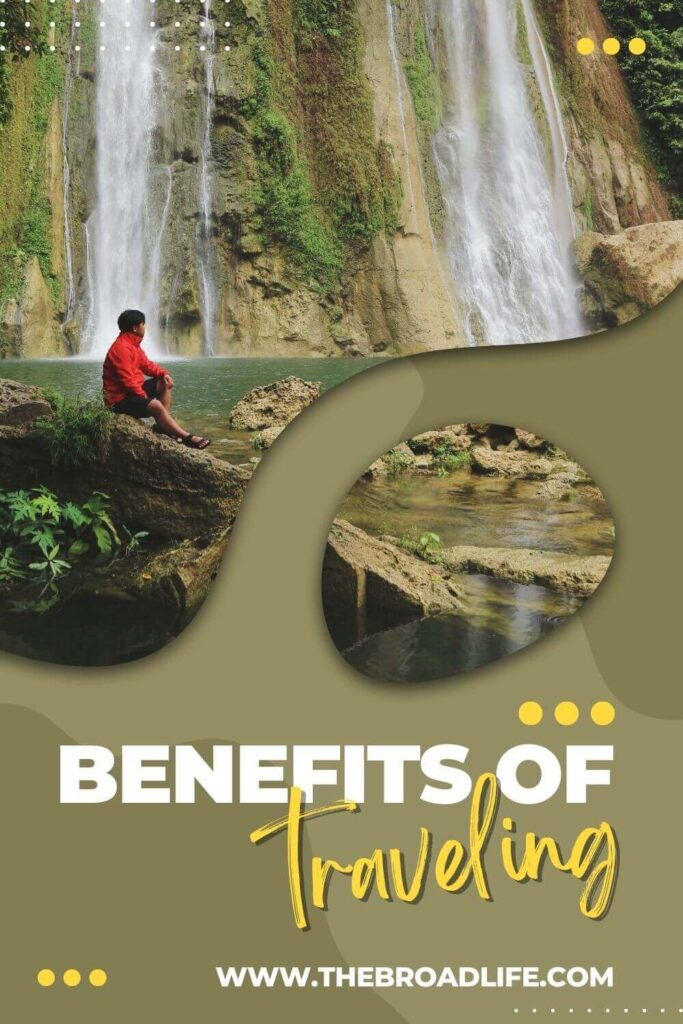
Khoi Nguyen
Khoi Nguyen builds The Broad Life with a desire to inspire people go exploring the world and live a more interesting, experience, and adventurous life. This blog shares the stories, pictures, and experiences at destinations where he has traveled to.
26 Comments
Wow, what an amazing post about the benefits of travel! I couldn’t agree more that traveling is not just a way to explore new destinations, but it also has a significant impact on our mind, body, and soul. Your post perfectly highlights the positive effects that traveling can have on our mental health, such as reducing stress, increasing creativity, and boosting happiness. Thank you for sharing this valuable information with us.
Thank you a lot for your comment! I’m glad that this post brings value info to you.
Stephanie Grillo
Travel is such a wonderful way to open our minds to new things. The list of benefits of traveling in this article make me want to hop on a plan and experience all of these.
I’m sure there are so many things for you to enjoy from traveling.
thewelltraveledchild
Travel is my soul! We travel the world as a family and the connections and relationships we have formed from it are so significant. Best form of school for my kiddos!
Absolutely! I take my family to many places and we discover the world together.
Nicole bertrand
As someone who loves to travel, I can say that all of these benefits ring true. Great post!
Thanks for your comment!
Gervin Khan
I’ve agree with this, by traveling we recover and recharge our well-being! That’s why we don’t build material things rather than experience! An awesome article to read! Loved it!
Thanks a lot for your comment! Traveling truly brings us more than we can expect.
I love travel so much too! Much harder these days with kids as it requires more planning. Lol!
Haha, you can think of a local resort where you can spend time with your kids easier while you are able to discover the area’s attractions.
Moments Inspire
All of this is so true. I love travel alot and always feel these effects but never took the time to connect the two.
It’s always needed for the first experience then you will have the next ones continuously.
Share to Inspire blog (@pacioalita)
I couldnt agree more with these reasons why someone should travel. Its good for our mind body and soul. I wish I can travel more often.
I hope you can travel more often.
I agree with all of this!!! My life (and me as a person) would be drastically different if I didn’t have all my travel experiences.
So good to hear you sharing! Traveling truly brings us so many special experiences and changes.
Ntensibe Edgar
Ah yes! Increased appreciation of what you have and more learning opportunities are my biggest wins from travel. Reminds me of my first time travelling to Tanzania; I was blown away by what I found there.
That’s the best part of traveling!
Fransic verso
It’s definitely good for mental health and help to learn more. These are spot on things that can help you to improve.
Life With Sonia | Women Empowerment Blogger (@lifewithsonia)
I agree to all. Travelling gives me a sense of freedom. Yes, you are right, it does help with problem solving skills too because you get to meet different people in different culture. I really enjoy traveling..i can’t wait to travel again.
Enjoy traveling!
Neely Moldovan
I love this! Travel is so good for your soul! Just even to refresh you!
Definitely!
Leave a Reply Cancel reply
Your email address will not be published. Required fields are marked *
Notify me of new posts by email.
Post Comment

14 Best Places for New Year’s Eve Celebration in the World
Are you ready for partying during the holiday season? Do you want to celebrate New Year’s Eve

10 Amazing Travel Experiences of a Lifetime That You Must Have
Traveling is an enriching experience that allows us to broaden our horizons, learn about different c

Vietnam UNESCO Sites: The Ultimate Guide to the Heritage of Humanity
Vietnam is a country with a rich and diverse cultural and natural heritage. The country has eight si

10 Best Places for Trekking in Vietnam
Vietnam is a land of contrasts, where ancient traditions coexist with modern lifestyles, where lush

Sign up for Newsletter
Discover more from Travel Blog - Blog About Traveling | The Broad Life
Subscribe now to keep reading and get access to the full archive.
Type your email…
Continue reading
- Best overall
- Best for expensive trips
- Best for exotic trips
- Best for annual plans
How we reviewed travel insurance for seniors
Best travel insurance for seniors of may 2024.
Affiliate links for the products on this page are from partners that compensate us (see our advertiser disclosure with our list of partners for more details). However, our opinions are our own. See how we rate insurance products to write unbiased product reviews.
Reaching your golden years doesn't mean your adventures have to end. In fact, in this stage of life, you'll hopefully have more time and resources to travel. But as a senior citizen, you'll want to ensure you have travel insurance that covers any health-related issues arise while you travel.
Our top picks for the best senior travel insurance
- Best overall: Allianz Travel Insurance
- Best for expensive trips: John Hancock Travel Insurance
- Best for exotic trips: World Nomads Travel Insurance
Best for annual plans: Travel Guard
How we rate the best senior travel insurance companies »
Compare travel insurance for seniors
Your health gets more unpredictable as you age, which makes travel insurance more important for seniors. Unfortunately, it's also more expensive. The best travel insurance for seniors won't have too steep of a price hike compared to rates for younger travelers. It will have high coverage limits for emergency medical coverage, trip cancellations, and and emergency medical evacuation. It's also important that your travel insurance offers pre-existing condition waivers , ideally at no extra cost to the traveler.
Here are our picks for the best travel insurance coverage for seniors in 2024.
Best overall: Allianz
- Check mark icon A check mark. It indicates a confirmation of your intended interaction. Good option for frequent travelers thanks to its annual multi-trip policies
- Check mark icon A check mark. It indicates a confirmation of your intended interaction. Doesn't increase premium for trips longer than 30 days, meaning it could be one of the more affordable options for a long trip
- Check mark icon A check mark. It indicates a confirmation of your intended interaction. Some plans include free coverage for children 17 and under
- Check mark icon A check mark. It indicates a confirmation of your intended interaction. Concierge included with some plans
- con icon Two crossed lines that form an 'X'. Coverage for medical emergency is lower than some competitors' policies
- con icon Two crossed lines that form an 'X'. Plans don't include coverage contact sports and high-altitude activities
- Single and multi-trip plans available
- Trip cancellation and interruption coverage starting at up to $10,000 (higher limits with more expensive plans)
- Preexisting medical condition coverage available with some plans
Allianz Travel Insurance is one of the most widely recognized names in travel insurance, and it stands out as one of the top travel insurance providers for seniors. It offers a wide range of policies covering medical treatments overseas and emergency medical transport.
Allianz also provides options for varying trip lengths. Its annual multi-trip policies , for example, cover any trip you make during your policy period, even if they aren't yet planned, making it an excellent option for seniors who vacation multiple times per year.
Read our Allianz Travel Insurance review here.
Best for expensive trips: John Hancock
- Check mark icon A check mark. It indicates a confirmation of your intended interaction. Offers 3 travel insurance plans
- Check mark icon A check mark. It indicates a confirmation of your intended interaction. Cancel for any reason rider available
- Check mark icon A check mark. It indicates a confirmation of your intended interaction. Affordable travel insurance premiums
- con icon Two crossed lines that form an 'X'. Reviews of claims process are mixed
- con icon Two crossed lines that form an 'X'. Buyers may not get specialty coverage for sports equipment and other high value items
- Trip cancellation for 100% of the trip cost
- Trip interruption insurance for up to 150% of the trip cost
- Emergency medical coverage of up to $250,000 per person
- Medical evacuation coverage of up to $1,000,000
John Hancock Travel Insurance plans for seniors offer some of the best coverage available. It provides generous maximum benefit amounts while still offering affordable prices.
Each plan includes coverages like trip cancellation, emergency accident, and emergency medical, with the option to add benefits like CFAR (cancel for any reason) . Plus, getting a free online quote is a quick and straightforward process.
Read our John Hancock Travel Insurance review here.
Best for exotic trips: World Nomads
- Check mark icon A check mark. It indicates a confirmation of your intended interaction. Coverage for 200+ activities like skiing, surfing, and rock climbing
- Check mark icon A check mark. It indicates a confirmation of your intended interaction. Only two plans to choose from, making it simple to find the right option
- Check mark icon A check mark. It indicates a confirmation of your intended interaction. You can purchase coverage even after your trip has started
- con icon Two crossed lines that form an 'X'. If your trip costs more than $10,000, you may want to choose other insurance because trip protection is capped at up to $10,000 (for the Explorer plan)
- con icon Two crossed lines that form an 'X'. Doesn't offer coverage for travelers older than 70
- con icon Two crossed lines that form an 'X'. No Cancel for Any Reason (CFAR) option
- Coverage for 150+ activities and sports
- 2 plans: Standard and Explorer
- Trip protection for up to $10,000
- Emergency medical insurance of up to $100,000
- Emergency evacuation coverage for up to $500,000
- Coverage to protect your items (up to $3,000)
World Nomads Travel Insurance is a great choice for active senior citizens under 70 who want comprehensive travel insurance. The key difference between World Nomads and many other providers is that it covers 200+ adventurous activities like scuba diving, mountain biking, surfing, skiing, and even bungee jumping. In addition, World Nomads' trip cancellation and emergency medical coverage includes COVID-19-related issues. Many other insurers are excluding that type of coverage now.
For adventurous senior citizens over the age of 70 years, World Nomads suggests working with its partner, TripAssure .
Read our World Nomads Travel Insurance review here.
Trip cancellation coverage for up to 100% of the trip cost and trip interruption coverage for up to 150% of the trip cost
- Check mark icon A check mark. It indicates a confirmation of your intended interaction. Trip cancellation coverage of up to 100% of the cost, for all three plan levels
- Check mark icon A check mark. It indicates a confirmation of your intended interaction. CFAR covers up to 75% of total trip costs (maximum of $112,500 on some plans)
- Check mark icon A check mark. It indicates a confirmation of your intended interaction. Medical coverage of up to $500,000 and evacuation of up to $1,000,000 per person
- Check mark icon A check mark. It indicates a confirmation of your intended interaction. Includes COVID coverage
- Check mark icon A check mark. It indicates a confirmation of your intended interaction. Above average baggage loss and delay benefits
- Check mark icon A check mark. It indicates a confirmation of your intended interaction. High medical evacuation coverage
- con icon Two crossed lines that form an 'X'. Premiums may run slightly higher than competitors
Travel Guard is a well-established and highly rated name in the travel insurance industry. It offers three main coverage options to choose from, and in general its policies have above-average coverage for baggage loss and baggage delays, plus high medical evaluation coverage limits.
- Trip cancellation coverage for up to 100% of the trip cost
- Trip interruption coverage for up to 150% of the trip cost
- Preexisting medical conditions exclusions waiver must be purchased within 15 days of initial trip payment
- Annual travel insurance plan and Pack N' Go plan (for last-minute trips) available
Travel Guard offers comprehensive insurance plans for shorter and longer trips. One of its more unique offerings is its Travel Guard Annual Plan.
This annual travel insurance comes with standard coverage benefits (trip delay, baggage loss, etc.) and substantial coverage amounts, which is important for seniors who travel multiple times per year. Travel Guard also offers a preexisting medical condition waiver, meaning those with certain medical issues can still gain coverage.
Read our AIG Travel Guard Insurance review here.
Understanding travel insurance for seniors
Before diving into the specifics, it's essential to understand what travel insurance is and why it's particularly important for senior travelers. The best travel insurance offers financial protection against unexpected events affecting your trip, such as trip cancellations, medical emergencies, or lost luggage.
Types of coverage
- Medical Coverage: Ensures your medical expenses are covered in case of illness or injury.
- Trip Cancellation/Interruption Coverage: Provides reimbursement if your trip is canceled or cut short due to unforeseen events.
- Baggage Coverage: Covers loss, damage, or theft of personal items during your trip.
Benefits of travel insurance for seniors
- Peace of Mind: Knowing you're covered in case of emergencies can make your travel stress-free.
- Financial Protection: Shields you from potentially overwhelming medical costs and trip cancellations fees.
- Assistance Services: Many plans offer 24/7 assistance services, providing help whenever and wherever you need it.
Making the most of your plan
After choosing a plan, it's crucial to understand your policy fully and know what services are available to you in case of an emergency.
Understanding your policy
- Read the fine print and understand the claims process to avoid surprises.
Emergency assistance services
- Familiarize yourself with the emergency assistance services offered by your plan and keep all necessary contact information handy.
How to pick senior travel insurance
It's wise to compare several different travel insurance policies for the best coverage and pricing, as premiums vary widely between insurers and depend on factors like your age and travel destination.
That said, some of the more essential coverages to look for if you're a senior citizen include:
- Travel medical coverage - This coverage will pay for your medical bills outside the US.
- Medical evacuation coverage - If you're injured or become sick while traveling, this coverage will transport you to the nearest hospital or even back home if your condition necessitates it.
- Preexisting conditions - Coverage for known health conditions. You'll need to purchase travel insurance within a certain time period from when you book your trip to qualify for a preexisting condition waiver .
- Cancel for any reason (CFAR) - The name says it all! It'll cost extra and you'll need to purchase insurance early, but it's the most comprehensive trip cancellation coverage you can get. Note that CFAR insurance usually only covers up to 75% of your trip fees.
- Trip cancellation insurance - This coverage provides reimbursement for your prepaid and nonrefundable costs if you cannot make your trip due to an unforeseen event.
- Baggage delay insurance - This coverage will reimburse you for essentials like toiletries and clothes if your bags are delayed.
- Lost luggage insurance - This coverage will reimburse you up to a specified amount if your bags get lost en route.
Of these, the most critical to note are whether or not your policy covers preexisting conditions and the limits for travel medical insurance and emergency medical evacuation.
Some insurance companies offer a waiver that will cover preexisting conditions. You'll have to follow the requirements for adding a waiver to your policy, like insuring the entire cost of your trip. Or purchase the policy within a specific time after making your first trip deposit payments.
You'll also want to find a policy with high maximum limits for travel medical and emergency medical evacuation coverage. These types of expenses can be substantial, so you want to have appropriate coverage.
When comparing senior travel insurance options, we looked at the following factors to evaluate each travel insurance provider:
- Coverage limits: We looked at each travel insurance company's coverage amounts for benefits like medical emergencies and trip cancellation.
- Flexibility: We looked at how customizable a policy is, so you can choose what your travel insurance policy covers .
- Coverage for preexisting conditions: Preexisting conditions are one of the more critical factors for travel insurance for senior citizens, so we looked at travel insurance companies that offer the best coverage for preexisting conditions.
- Price: We compared travel insurance providers offering reasonable basic and comprehensive coverage rates.
- Benefits geared towards seniors: We compared travel insurance companies that offer solid coverage for senior citizens, like medical evacuation, COVID-19 coverage, and trip cancellation.
You can read more about our insurance rating methodology here.
Seniors should look for travel insurance policies that offer comprehensive medical coverage, including for preexisting conditions and emergency medical evacuation. They should also consider policies with higher coverage limits to ensure adequate protection. Additionally, seniors should seek travel insurance plans that provide 24/7 assistance services, as well as coverage for trip cancellations, interruptions, and baggage protection.
The cost of senior travel insurance coverage can vary depending on your age, overall health, state of residence, travel destination, and length of your trip. However, assuming all other factors are the same, you'll pay more for travel insurance at 70 than at 30.
All travel insurance companies, except World Nomads, included in this guide offer coverage for pre-existing medical conditions as long as you buy your policy within the qualifying period from when you placed your trip deposit.
Allianz is the best travel insurance for seniors due to its wide array of medical coverages and emergency medical transport. Allianz also offers multi-trip insurance policies , which could make sense for seniors who travel frequently.
In some instances, travel insurance companies will have age eligibility restrictions, often only insuring people 80 years old and younger.
Editorial Note: Any opinions, analyses, reviews, or recommendations expressed in this article are the author’s alone, and have not been reviewed, approved, or otherwise endorsed by any card issuer. Read our editorial standards .
Please note: While the offers mentioned above are accurate at the time of publication, they're subject to change at any time and may have changed, or may no longer be available.
**Enrollment required.

- Main content
- Skip to primary navigation
- Skip to main content
- Skip to primary sidebar
- Skip to footer
Green Global Travel
World's largest independently owned Ecotourism / Green Travel / Sustainable Travel / Animal & Wildlife Conservation site. We share transformative Responsible Travel, Sustainable Living & Going Green Tips that make a positive impact.
What Is Ecotourism? (The History & Principles of Responsible Travel)

Disclaimer: This post may contain affiliate links. All hosted affiliate links follow our editorial policies .
What is ecotourism? How does it work? Why does it matter? And how can we, as travelers, put the core principles of ecotourism into practice?
In recent years, the growth of interest in responsible travel has outpaced that of traditional sun/sand tourism by an increasingly wide margin.
With some experts estimating that ecotourism now represents 11.4% of all consumer spending, these sorts of questions have become more and more common.
And, as we continue to see more negative impacts of mass tourism on beloved destinations around the world, the answers to these questions will become increasingly vital.
Part of the confusion surrounding sustainable travel is the plethora of names being used for it within the industry.
E cotourism, a movement that began to take shape back in the 1980s, is the oldest and most commonly used word for it.
More recent industry buzzwords include sustainable tourism, green tourism, nature tourism, responsible tourism, ethical tourism, mindful travel, conscious travel, pro-poor tourism, and many others.
Regardless of what you call it, the central concepts that these philosophies share in common are that the travel industry as a whole should adopt more environmentally friendly practices, protect the natural and cultural heritage of a destination, and support local communities.
With the United Nations designating 2017 as the International Year of Sustainable Tourism for Development , this seems like a great time to deepen the conversation about what ecotourism is and why it’s important for the future of travel.
Here we’ll explain the definition of ecotourism, examine its history and evolution, explore its core principles and benefits, and look at 10 ways that each of us as responsible travelers can ensure our adventures ultimately make a positive impact.
READ MORE: How Mass Tourism is Destroying Destinations
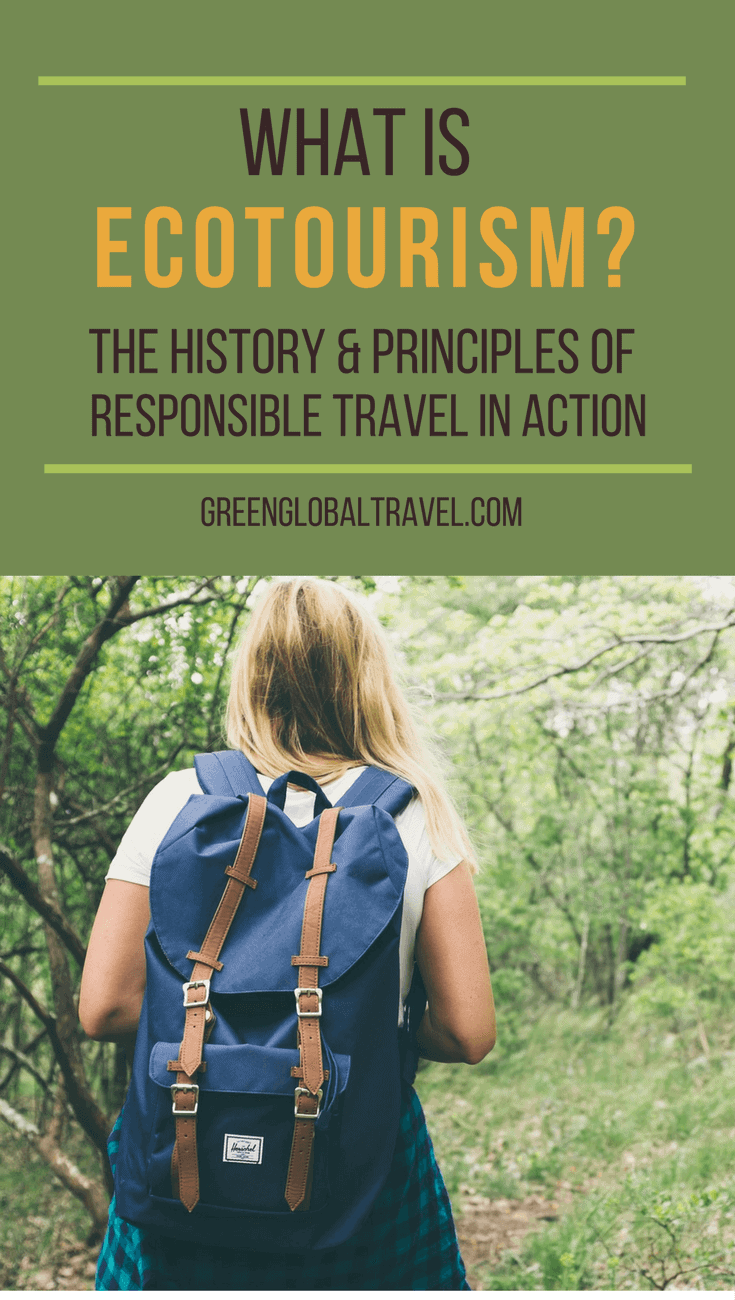
- The Definition of Ecotourism
- A Brief History of Ecotourism
- Ecotourism in the ’90s & Beyond
- The Principles of Ecotourism
- Ecotourism Principles in Action
The Benefits of Ecotourism
- Other Articles on Ecotourism

THE DEFINITION OF ECOTOURISM
According to The Oxford English Dictionary , the word “ecotour” was first recorded in 1973, followed by “ecotourism” in 1982.
There, the word is defined as, “Tourism to areas of ecological interest (typically exotic and often threatened natural environments), especially to support conservation efforts and observe wildlife; spec. access to an endangered environment controlled so as to have the least possible adverse effect.”
Ecotourism was perhaps best defined in 1990 by Megan Epler Wood, the co-founder of The International Ecotourism Society (TIES) and author of six influential books on the subject.
Her latest, Sustainable Tourism on a Finite Planet: Environmental, Business and Policy Solutions , was released in 2017.
Now the director of the International Sustainable Tourism Initiative at Harvard, Epler Wood’s original definition was more simple and to the point. She described ecotourism as, “Responsible travel to natural areas that conserves the environment and improves the well-being of local people.”
In simple words, the meaning of ecotourism is travel that makes a positive impact on both the ECO logy and ECO nomy of a given destination.
One mistake many people make is assuming that ecotourism is all about conserving nature and wildlife by any means necessary. But if a destination or business’ tourism development strategy does not actively provide concrete financial benefits for the indigenous people, it’s not truly ecotourism.
Other NGOs, such as The Center for Responsible Travel (CREST, whose co-founder Dr. Martha Honey also served as the Executive Director of TIES for four years), have since expanded on Epler Wood’s concept to provide more in-depth definitions of ecotourism.
CREST currently defines ecotourism as, “Responsible travel to natural areas that conserves the environment, socially and economically sustains the well-being of local people, and creates knowledge and understanding through interpretation and education of all involved (including staff, travelers, and community residents).”
Other responsible travel organizations may have their own take on what ecotourism is, but these three are the most significant definitions.
READ MORE: Megan Epler Wood on the Evolution of Ecotourism
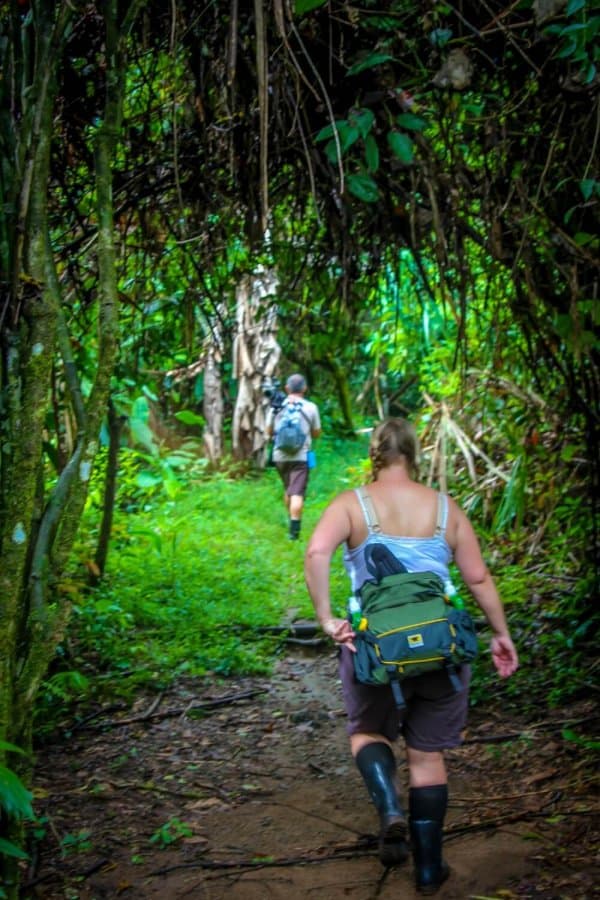
A BRIEF HISTORY OF ECOTOURISM
Ecotourism’s earliest origins arguably began with the Sierra Club’s Outing program. Launched in 1901, these annual expeditions took hikers into the Sierra Nevada’s backcountry in order to show members natural wonders, “so that those persons could become active workers for the preservation of the forests.”
The modern movement began to take root in the environmental activism of the 1970s. Some sources suggest that the term ecotourism was originally coined by Mexican architect-turned-environmentalist Héctor Ceballos-Lascuráin . He used the word to describe traveling to undisturbed areas in order to enjoy their natural beauty and culture.
In 1981 Ceballos-Lascuráin became the founding president of the Mexican Association for the Conservation of Nature, the most influential Mexican NGO in the conservation arena. In 1984 he founded the first Mexican ecotourism agency, ECOTOURS.
His 315-page book on Tourism, Ecotourism, and Protected Areas was published in 1996 by the International Union for the Conservation of Nature (IUCN). He served for many years as an Ecotourism Advisor to both the IUCN and United Nations World Tourism Organization.
Megan Epler Wood was another one of the ecotourism movement’s earliest adopters. She was a young wildlife biologist hired by World Wildlife Fund founder (and former EPA director) Russell Train right out of grad school in the early ’80s.
Their all-star team at the time also included Russell Mittermeier (now President of Conservation International) and Thomas Lovejoy , who’s known as the “godfather of biodiversity.”
“In the 1980s the idea of sustainable development was new,” Epler Wood recalls. “There was a big conversation about finding ways to benefit local people who wanted to conserve natural areas. A few years later my husband and I lived in Colombia on a joint Fulbright scholarship. [We realized that] people visiting the rainforest were bringing a majority of the benefits those locals were seeing.
READ MORE: Top Ecotourism Destinations According to Experts

ECOTOURISM IN THE ’90s & BEYOND
After she returned home in 1988, Epler Wood went on to produce The Environmental Tourist for PBS. She started pitching conservation NGOs a documentary on ecotourism that would be “the very first global investigation of how tourism could contribute to conservation of natural resources and local well-being.”
When that project lost its funding, she tapped into her contacts and started The International Ecotourism Society. The organization’s goal was to contribute to the development of ecotourism as a viable tool for conservation, protection of bio-cultural diversity, and sustainable community development.
Epler Wood left TIES in 2002 to start her own consulting firm. She was replaced by Dr. Martha Honey, the veteran journalist/historian who wrote the seminal book, Ecotourism and Sustainable Development: Who Owns Paradise? in 1999. She was Executive Director of the organization from 2003 to 2006, and eventually founded the Center for Responsible Travel in Washington, DC.
I had the pleasure of interviewing Dr. Honey during a keynote presentation at the TBEX Travel Blogging Conference in Cancun, Mexico in 2014. When I asked about the changes she’s seen in the ecotourism industry over the past 20 years, Dr. Honey insisted that they were positive for the most part.
“It hasn’t lost or changed its core values, which are essentially that tourism should be done in a way that’s beneficial to environmental conservation and local communities and respectful of local cultures…The Slow Food movement, organic agriculture, travel philanthropy, concern about human trafficking and child sexual abuse, fair trade , carbon offsets, and animal welfare are all branches on the original tree.
There have been countless other ecotourism icons over the past 30 years, from Jonathan Tourtellot (NatGeo’s Destination Stewardship Center) and Jeff Greenwald (founder of Ethical Traveler) to eco-design authority Hitesh Meta.
Now ecotourism is considered one of the fastest-growing sectors in the travel industry (about 5% annually), accounting for around 6% of the world’s gross domestic product. Even as the market for traditional tourism grew stagnant, the UNWTO’s global forecast projected rapid growth in the ecotourism industry over the next decade.
READ MORE: Q&A With Dr. Martha Honey on Ecotourism

THE PRINCIPLES OF ECOTOURISM
Ecotourism is essentially all about bringing nature/wildlife conservationists, local communities, and the responsible travel industry together to ensure development focused on long-term sustainability rather than short-term profits.
The goal is to develop tourist accommodations, activities, and attractions that benefit everyone involved– the local flora/fauna, the local people, travel industry stakeholders, and travelers alike.
With this mission in mind, the ecotourism industry has collectively developed a number of core guiding principles over the past few decades. Although international regulation and accreditation have remained elusive, these guidelines provide a general blueprint for responsible tourism development.
Many of these principles align with those of the Global Sustainable Tourism Council , which developed an extensive list of criteria for sustainable destinations, hotels, and tour operators.
1. Build Environmental & Cultural Awareness
Education is a key aspect of ecotourism initiatives, for locals and visitors alike. Most of these efforts are focused on improving awareness, sensitizing people to environmental issues, and encouraging them to be conscious of their impact on the places they visit.
Some tour operators create conservation education programs for local schools. Many offer interpretative guides, naturalists, and guest lecturers to help deepen travelers’ understanding of their experiences.
Immersive interactions with local cultures are also becoming increasingly common. These experiences often emphasize interaction rather than a typical performer-audience relationship with visitors.
2. Design & Operate Low-Impact Eco Tours/Facilities
Remember the old environmental adage, “Take only pictures, leave only footprints”? Today’s ecotourism industry strives to take it one step further.
The focus is all about sustainability, minimizing the negative carbon footprint travel often leaves on the environment. But these days the big picture goal is to create positive, rather than merely neutral impact.
From using alternative energy sources and ensuring all building materials are locally sourced to limiting eco tour group sizes, conscious consideration should be made to ensure low impact at every stage, from development to implementation.
3. Provide Financial Benefits for Conservation
The idea of using the revenue generated by ecotourism to help fund the conservation of nature and wildlife is not a new idea. In fact, it dates back more than 100 years, to the creation of the US National Parks Service .
Referred to by documentarian Ken Burns as “America’s Best Idea,” this concept has since been applied to more than 6,000 national parks in nearly 100 different countries around the world.
When managed properly, ecotourism can help provide a revenue-generating alternative to urbanization, deforestation, unsustainable agriculture, and poaching. And though critics claim ecotourism often fails to deliver on its promise, recent scientific studies continue to illustrate its conservation benefits.
4. Provide Financial Benefits for Local People
Critics have similarly pointed out that some ecotourism initiatives have created more problems for local people than they solve. Poorly managed programs can lead to conflicts over land and resources, unfair profit distribution, and cultural exploitation.
This is what happens when the phenomenon known as greenwashing – the disinformation disseminated by an organization so as to present an environmentally responsible public image– rears its ugly head.
True ecotourism MUST provide financial benefits to local people, whether through direct (tours, admission fees, and donations) or indirect means (such as taxes on travel or accommodation). It generally works best when there is smaller scale, slower growth, and greater involvement by local communities in all steps of the tourism development process.
5. Support Human Rights
Ecotourism initiatives should always strive to support human rights, economic empowerment, and democratic movements in a given destination.
In addition to increasing awareness about sociopolitical and environmental issues facing a given destination, ecotourism initiatives should support local businesses and the rights of indigenous inhabitants to control their land and assets.
This principle is arguably the most problematic and contentious. Should tour companies or travelers boycott a given destination due to human rights abuses or unfair treatment of its indigenous population? In many cases, such boycotts don’t punish the powers-that-be nearly as harshly as the locals who rely heavily on tourism revenue to survive.
READ MORE: Why Responsible Travel Matters
ECOTOURISM PRINCIPLES IN ACTION
Becoming a more responsible traveler is the best way to ensure your adventures are positive for the local people and the planet.
Whe n the core principles of ecotourism are applied, it can stimulate financial growth in developing nations, strengthening the global economy.
Individually, one person taking these baby steps to going green might not seem to make much of an impact. But if we all take simple strides towards being more conscious of our choices, collectively we can m ake a world of difference. Here’s how!
Lightening up your load saves money on baggage fees and increases plane fuel-efficiency.
Pack items that can be washed in the sink and are quick drying so they can be worn multiple times during your trip.
We recommend (but do not receive compensation from) the ExOfficio brand, and wear it everywhere we travel.
Take shorter showers, turn off the faucet while shaving and brushing your teeth, and re-use towels for multiple days.
And NEVER use the hotel laundry, as they typically wash each guest’s clothes separately, even if there are only a few items.
READ MORE: The Best Travel Clothing For 7 Travel Styles (An Epic Guide)

SAVE ENERGY
When you leave your hotel room, turn off the lights, heat/AC and TV.
Consider leaving the “Do Not Disturb” sign on the door so that the housekeeping staff won’t clean your room every day.
This will save on harsh chemical cleaning supplies and the electricity of vacuuming and washing bed linens.
REDUCE/REUSE/RECYCLE
Take a BPA-free water bottle you can refill, use just one bar of soap for both sink and shower.
Return brochures and maps once you’re finished using them, and hold on to your trash until you find a place to recycle it.
Seek out indigenous artisans and learn about their craft.
When we were in the Riviera Maya near Coba, we saw tons of assembly line art.
But instead we wound up buying from a man who taught local children and tourists the ancient craft of Mayan pottery and distributed profits equally among families in his village.
READ MORE: What Is An Eco Lodge? A Guide to Eco-Friendly Accommodations

LEAVE ONLY FOOTPRINTS
Stick to marked trails to avoid harming native flora, and consider taking a bag to pick up trash along your journey.
Not only is it a great way to help keep the outdoors beautiful, but it also protects wildlife that might eat or get tangled in the garbage.
BE A TRAVELER, NOT A TOURIST
Take time to immerse yourself in the local music, art and cuisine. Embrace the cultural differences that make it unique.
Get to know the locals and how they view life. You might be surprised at the things you learn when you open your mind to new ideas!
HONOR LOCAL TRADITIONS
Some cultures have very different traditions from yours.
Women are forbidden to show skin in some Muslim countries. For some, being photographed in like having your soul stolen.
Understand and respect these traditions, or risk offending the people whose culture you’re there to experience.
READ MORE: Embracing the Culture of the Maasai People of Tanzania

Developing nations are badly in need of basic necessities most people take for granted.
Traveling gives you a unique experience that stays with you for the rest of your life.
In return, consider giving something back, such as bringing school supplies on tours in which you know you’ll interact with locals.
SHOP SMARTER
Read labels, and ask questions like “What is this item made from?”
All over the planet people sell items made from non-sustainable hardwoods, endangered species, and ancient artifacts.
It may be alright in their country to sell them, but you can still vote with your wallet by refusing to buy them.
READ MORE: The Problem with Animal Selfies

THE BENEFITS OF ECOTOURISM
To quote CREST founder Dr. Martha Honey during our Keynote session at TBEX Cancun in 2014, we earnestly believe that ecotourism is “ simply a better way to travel . ” Here’s a look at how this transformational approach to travel benefits conservation, increases cross-cultural understanding, and ultimately turns travelers into environmental advocates:
Benefits to Wildlife
To see how ecotourism benefits nature and wildlife, let’s look at endangered species such as African Elephants . Ivory from Elephant tusks is worth $1500 a pound on the black market, which has led to a dramatic increase in poaching.
But Elephants are worth 76 times more alive than dead . When you consider the revenue from wildlife photography tours , luxury safari camps, and other ecotourism offerings, a single Elephant is worth $1.3 million over the course of its lifetime!
Other heavily poached species, such as Lions and Rhinos , have shown to be similarly valuable alive. Ecotourism offers a long-term alternative to exploitation, generating sustainable revenue and ensuring better overall health of the ecosystem.
Benefits to the Environment
Nature reserves and national parks help prevent deforestation and pollution, while also protecting the habitat of endemic species.
The revenue that ecotourism provides can help replace profits from exploitative practices such as mining or slash ‘n’ burn agriculture. It can also help ensure the long-term financial viability of the area.
Naturalist guides also help travelers understand the value of a pristine ecosystem, and teach them about the importance of conservation. This ultimately help to create a more mindful and conscious legion of travelers.
Benefits to Local People
When managed properly, ecotourism can offer locals alternative revenue streams. In wildlife-rich countries such as Rwanda , former poachers are often employed as guides or trackers, capitalizing on their knowledge of the animals and their habitat.
In Costa Rica , unemployment has fallen to less than 10% since the country started building its ecotourism infrastructure in the 1970s. The country now enjoys the highest standard of living in Central America .
Involving local communities in tourism management empowers them by ensuring that more revenue is reinvested locally. Ecotourism also offers indigenous peoples an opportunity to remain on ancestral land, conserve it, and preserve traditional culture.
Benefits to Travelers
In the words of United Nations Secretary General Talib Rifai, the Year of Sustainable Tourism provided “a unique opportunity to advance the contribution of the tourism sector to the three pillars of sustainability– economic, social and environmental– while raising awareness of the true dimensions of a sector which is often undervalued.”
Sure, being a responsible traveler takes a greater level of commitment to being conscious and mindful of the impact we have on the destinations we visit. But ecotourism also offers us incredible, transformative experiences, allowing us to develop closer personal relationships to the nature, wildlife, and local people we encounter during our adventures.
Learning about ecotourism during my life-changing experience in South Africa in 2000 permanently changed my understanding of mankind’s role in our planetary ecosystem. And I firmly believe that, once you’ve had that sort of travel experience, you’ll never want to travel the traditional way again. –Bret Love; photos by Bret Love & Mary Gabbett unless otherwise noted

OTHER ARTICLES ON ECOTOURISM
How Mass Tourism is Destroying Destinations Travelers Love
Why Responsible Tourism is Better
7 Harmful Practices Tourists Should Never Support
Why Slow Travel is Better
Why Community Based Tourism is Vital to Responsible Travel
What Is An Eco Lodge? A Guide to Eco-Friendly Accommodations
What Is Glamping? An Intro to Luxury Camping
10 Steps to Becoming a More Responsible Traveler
Green Travel Tips: The Ultimate Guide to Sustainable Travel
How to Choose a Green Hotel
How to Choose a Responsible Scuba Diving Tour Operator
How to Eat Ethically When You Travel
Top 10 Latin American Ecotourism Adventures
Top 10 Off the Beaten Path Ecotourism Destinations
Ecotourism in Costa Rica
Ecotourism in Jordan
Ecotourism in Antarctica
Ecotourism in Australia
Ecotourism in Cancun
Ecotourism in Egypt
Ecotourism in Ireland
Ecotourism in Jamaica
Ecotourism in New Zealand
Ecotourism in Northern Italy
Ecotourism in Sabah, Borneo
Ecotourism in Spain
Ecotourism in Taipei
Ecotourism in Tonga
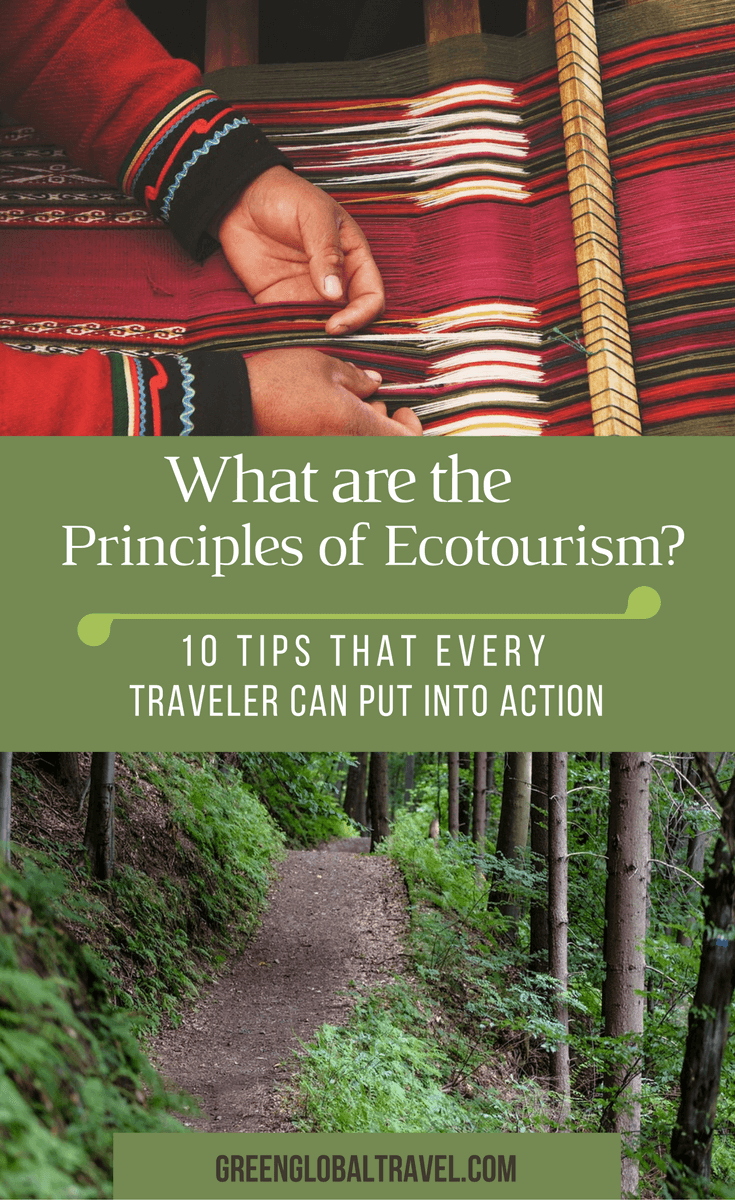
About the Author
Green Global Travel is the world's #1 independently owned ecotourism website encouraging others to embrace sustainable travel, wildlife conservation, cultural preservation, and going green tips for more sustainable living.
We've been spotlighted in major media outlets such as the BBC, Chicago Tribune, Forbes, The Guardian, Lonely Planet, National Geographic, Travel Channel, Washington Post and others.
Owned by Bret Love (a veteran journalist/photographer) and Mary Gabbett (business manager/videographer), USA Today named us one of the world's Top 5 Travel Blogging Couples. We were also featured in the 2017 National Geographic book, Ultimate Journeys for Two, for which we contributed a chapter on our adventures in Rwanda. Other awards we've won include Best Feature from both the Caribbean Tourism Organization and the Magazine Association of the Southeast.
As Seen On…

Join the 300,000+ people who follow Green Global Travel’s Blog and Social Media

Understanding What Travel Insurance Covers
Find a Qualified Financial Advisor
Finding a qualified financial advisor doesn't have to be hard. Datalign's free tool matches you with financial advisors in your area in as little as 3 minutes. All firms have been vetted by Datalign and all advisors are registered with the SEC. Get started with achieving your financial goals!
The offers and details on this page may have updated or changed since the time of publication. See our article on Business Insider for current information.
Affiliate links for the products on this page are from partners that compensate us (see our advertiser disclosure with our list of partners for more details). However, our opinions are our own. See how we rate insurance products to write unbiased product reviews.
The information for the following product(s) has been collected independently by Business Insider: Chase Freedom Flex℠. The details for these products have not been reviewed or provided by the issuer.
- Travel insurance is intended to cover risks and financial losses associated with traveling.
- Coverage can include trip cancellation, baggage protection, medical care, and emergency evacuation.
- When filing a claim, be specific and comprehensive in your documentation to ease the process.
Whether it's a trip across the world or a trip across the state, having travel insurance provides major relief if things go awry. Flight delays, lost baggage, illness, injuries, and other unforeseen events can disrupt even the best-laid plans. With a major disruption comes the potential for unanticipated expenses.
Travel insurance and the coverage it offers can help keep you protected and save you money in the long run.
Overview of Travel Insurance Coverage
Travel insurance policies protect travelers from financial losses should something go wrong during their trip. You can customize which coverages you want to include, and there are several to choose from.
"Common types of coverage include trip cancellation, trip interruption, baggage protection, coverage for medical care if you get sick or hurt during your trip, and emergency medical evacuation," says Angela Borden, a travel insurance expert and product strategist for travel insurance company Seven Corners.
Travel insurance plans offer nonrefundable payments and other trip-related expenses. While monetary compensation is a primary benefit, there is another valuable perk of travel insurance. It can provide peace of mind.
What does travel insurance cover?
Your specific travel insurance plan (and its terms and conditions) will determine the minutia and specifics of what is covered. As with most other forms of insurance, a general rule of thumb is the more you spend, the better your coverage.
"Travel insurance can be confusing, so it's best to research a reputable company that specializes in travel insurance and has a long history of successfully helping travelers all over the world," says Borden.
Trip cancellation and interruptions
A travel insurance policy can reimburse you for a prepaid, nonrefundable trip if it is canceled for a covered event, such as a natural disaster or a global pandemic.
Trip interruption insurance covers you if you're already on your trip and you get sick, there's a natural disaster, or something else happens. Make sure to check with your travel insurance providers to discuss any inclusions, coverage, and more.
Travel delays and missed connections
Travel delay insurance coverage provides reimbursement for any expenses you incur when you experience a delay in transit over a minimum time. Reimbursements can include hotels, airfare, food, and other related expenses.
Medical emergencies and evacuations
Typically, US healthcare plans are not accepted in other countries. So travel insurance with medical coverage can be particularly beneficial when you are abroad. Medical coverage can also help with locating doctors and healthcare facilities.
Medical transportation coverage will also pay for emergency evacuation expenses such as airlifts and medically-equipped flights back to the US. Out of pocket, these expenses can easily amount to tens of thousands of dollars. Certain plans may even transport you to a hospital of choice for care.
Travel insurance generally does not include coverage for pre-existing conditions. That said, you can obtain a pre-existing condition waiver, which we will talk about later.
Baggage and personal belongings
Most airlines will reimburse travelers for lost or destroyed baggage, but be prepared for limitations. Travel insurance plans will typically cover stolen items, such as those stolen out of a hotel room. This may not include expensive jewelry, antiques, or heirloom items. Typically, airlines have a few days to recover your bag.
In the meantime, you can make a claim to pay for items like certain toiletries and other items you need to pick up. If your bag is truly lost or you don't get it for an extended period, you can file a true lost baggage claim.
What does credit card travel insurance cover?
A major perk on several travel credit cards is embedded credit card travel insurance . Typically, you will need to use the specific card for the transaction (at least with partial payment) for travel coverage to kick in.
Each card has specific rules on what exactly is covered. But one of the industry leaders is the $550-per-year Chase Sapphire Reserve credit card. Here's a snapshot of what is covered with this specific card:
- Baggage delay: up to $100 reimbursed per day for up to five days if a passenger carrier delays your baggage by more than six hours.
- Lost and damaged baggage: up to $3,000 per passenger per trip, but only up to $500 per passenger for jewelry and watches and up to $500 per passenger for cameras and other electronic equipment.
- Trip delay reimbursement: up to $500 per ticket if you're delayed more than six hours or require an overnight stay.
- Trip cancellation and interruption protection: up to $10,000 per person and $20,000 per trip for prepaid, nonrefundable travel expenses.
- Medical evacuation benefit: up to $100,000 for necessary emergency evacuation and transportation when on a trip of five to 60 days and traveling more than 100 miles from home.
- Travel accident insurance: accidental death or dismemberment coverage of up to $100,000 (up to $1,000,000 for common carrier travel).
- Emergency medical and dental benefits: up to $2,500 for medical expenses (subject to a $50 deductible) when on a trip arranged by a travel agency and traveling more than 100 miles from home.
- Rental car coverage: primary coverage for damages caused by theft or collision up to $75,000 on rentals of 31 days or fewer
More protections are included with cards with an annual fee, but there are exceptions. The no-annual-fee Chase Freedom Flex , for instance, includes up to $1,500 per person (and up to $6,000 per trip) in trip cancellation and trip interruption coverage.
However, there are some differences between credit card travel coverage and obtaining coverage from a third party.
"Credit card coverage does not typically provide travel medical benefits," Borden says. "For protection if you get sick or hurt while traveling, you'll want a travel insurance plan with medical coverage."
Whether you get your travel insurance in a standalone policy or through a credit card, it's important to review your plan details carefully. In either case, there may be exclusions and other requirements such as deadlines when filing a claim, Borden notes.
What travel insurance coverage do you need to pay more for?
Knowing what travel insurance doesn't cover is as important as knowing what it does cover.
"Travelers should understand that travel insurance benefits come into play only if a covered reason occurs," Borden says. Most standard travel insurance plans won't reimburse you for the following:
Cancel for any reason (CFAR)
Cancel-for-any-reason travel insurance covers a trip cancellation for any reason, not just a covered event. your standard benefits won't kick in unless it's a covered event. For instance, you'll be reimbursed simply for changing your mind about taking a trip.
That said, CFAR travel insurance is not without its downsides. For one, it's more expensive than traditional insurance, and most CFAR policies will only reimburse you for a percentage of your travel expenses. Additionally, CFAR policies aren't available for annual travel insurance .
You can find our guide on the best CFAR travel insurance here.
Foreseen weather events
Sudden storms or unforeseen weather events are typically covered by standard travel insurance plans. There are exceptions to be aware of. For example, an anticipated and named hurricane will not be covered.
Medical tourism
If you're going to travel internationally for a medical procedure or doctor's visit, your travel insurance plan will not cover the procedure itself. Most medical travel plans also won't cover you if something goes wrong with your procedure.
Pre-existing conditions and pregnancy
Those with specific pre-existing conditions, such as someone with diabetes and needing more insulin, will not be covered by most plans. In addition, pregnancy-related expenses will likely not be covered under most plans.
That said, you can obtain a pre-existing condition waiver for stable conditions. In order to obtain a wavier, you will need to purchase travel insurance within a certain time frame from when you booked your trip, usually two to three weeks, depending on your policy.
Extreme sports and activities
Accidents occurring while participating in extreme sports like skydiving and paragliding will typically not be covered under most plans. However, many plans offer the ability to upgrade to a higher-priced version with extended coverage.
Navigating claims and assistance
When a trip goes awry, the first thing you should do is document everything and be as specific as possible with documentation. This will make the claims process easier, as you can substantiate and quantify your financial losses due to the delay.
For example, your flight home has been delayed long enough to be covered under your policy, you'll want to keep any receipts from purchases made while waiting. For instances where your luggage is lost, you will need to file a report with local authorities and document all the items you packed.
Cancellation protection also requires meticulous attention to detail. If you're too sick to fly, you may need to see a doctor to prove your eligibility. If an airline cancels a flight, you'll also need to document any refunds you received as travel insurance isn't going to reimburse you for money you've already gotten back.
Part of the benefit of CFAR insurance is the reduced paperwork necessary to file a claim. You'll still need to document your nonrefundable losses, but you won't have to substantiate why you're canceling a trip.
Choosing the right travel insurance
Each plan should be personalized to meet the insured party's needs. Some travelers prefer to stick to the bare minimum (flight cancellation benefits through the airline). Others want a comprehensive plan with every coverage possible. Before you buy anything, set your destination. Are there any travel restrictions or changes pending? Does your destination country require emergency or other medical coverage?
If the destination airport is known for lost or delayed luggage, travelers should keep important items in carry-ons. Lost or delayed luggage coverage protects insured parties in the event of a significant delay or total loss.
Second, check current credit card travel benefits to avoid redundancies. Savvy travelers don't need to pay for the same coverage twice.
Finally, consider your individual needs. Do you have a chronic medical condition, or do you feel safe with emergency-only medical coverage? Keep in mind, this does not include coverage for cosmetic surgery or other medical tourism. Do you have a budget limit for travel insurance? Asking and answering these important questions will help every traveler find the right product.
Most travel insurance plans are simple, and Business Insider's guide to the best travel insurance companies outlines our top picks. Remember, read your policy and its specifics closely to ensure it includes the items you need coverage for.
No one likes to dwell on how a trip might not go as planned before even leaving. However, at its core, travel insurance provides peace of mind as you go about your trip. While the upfront cost may seem significant, when you compare it to the potential expenses of a canceled flight, emergency evacuation, or a hefty medical bill, it's a small price to pay in the grand scheme of things.
Get Travel Insurance Quotes Online
Protect your trip with the best travel insurance . Compare travel insurance quotes from multiple providers with Squaremouth.
What does travel insurance cover frequently asked questions
Does travel insurance cover trip cancellations due to a pandemic like covid-19.
Coverage for pandemics vary from policy to policy. Some travel insurance companies have specific provisions for pandemic-related cancellations, while others may exclude them entirely.
Are sports injuries covered under travel insurance?
Sports injuries are often covered under travel insurance, but high-risk or adventure sports might require additional coverage or a special policy.
Can travel insurance provide coverage for travel advisories or warnings?
Travel advisories have different effects on your travel insurance depending on your policy. Traveling to a country already under travel advisory may invalidate your coverage, but if you're already traveling when a travel advisory is announced, you may be covered.
How does travel insurance handle emergency medical evacuations?
Travel insurance usually covers the cost of emergency medical evacuations to the nearest suitable medical facility, and sometimes back to your home country, if necessary.
Are lost or stolen passports covered by travel insurance?
Many travel insurance policies provide coverage for the cost of replacing lost or stolen passports during a trip.
If you enjoyed this story, be sure to follow Business Insider on Microsoft Start.

Chase Sapphire Preferred vs. Chase Sapphire Reserve insurance benefits – Which is better?

Editor's Note
Many travel credit cards have similar names, and that can be confusing. It seems like every card name contains the word platinum, preferred, premier or reserve somewhere in the title. It's important to know the distinctions between each because the benefits you'll find on each card can vary dramatically.
Take the Chase Sapphire Preferred® Card and the Chase Sapphire Reserve® , for example. Their titles are alike, they earn the same type of points and the cards even kind of look similar. But many of their benefits are very different. And they should be. The Chase Sapphire Preferred comes with a $95 annual fee, while the Chase Sapphire Reserve has a $550 annual fee.
Let's compare some of the most important perks of these two cards: travel and purchase protections. These are huge factors when choosing the right travel credit card.
Trip cancellation and interruption insurance
Trip interruption and cancellation insurance is something you'll (hopefully) rarely use. But when you do need it, you could be spared from forfeiting several thousand dollars in nonrefundable travel.
This coverage reimburses prepaid trip expenses that would otherwise be lost when you change or cancel your trip for a covered reason. You might even qualify for a new flight away from your destination, depending on the circumstances. Here are the differences between each insurance:
- Trip cancellation: Disaster strikes and you cancel your trip before it begins
- Trip interruption: You're on your trip and disaster strikes, causing you to change your plans
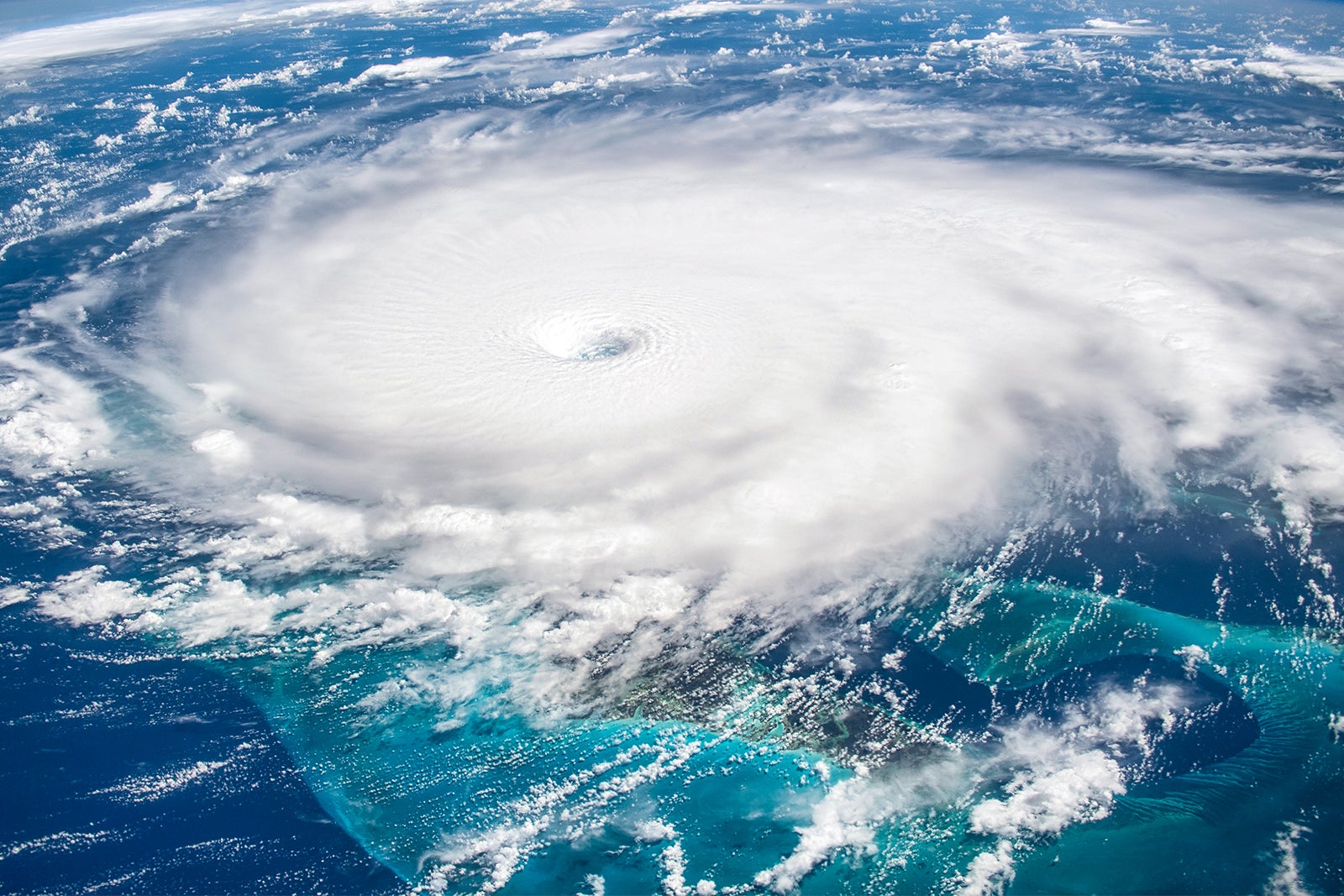
Covered reasons that make you eligible for these insurances include:
- Accidental bodily injury, loss of life or sickness experienced by you or a traveling companion that prevents either of you from traveling
- Accidental bodily injury, loss of life or sickness experienced by an immediate family member of you or your traveling companion that prevents either of you from traveling
- Severe weather (see benefits guide for details)
- Change in military orders for you or your spouse
- A call to jury duty or court subpoena (see benefits guide for details)
- You or your travel companion's place of residence becomes uninhabitable due to burglary, fire or flood
- You or your travel companion's lodging accommodations at your destination are made uninhabitable
- Death or hospitalization of your host or your traveling companion's host at your destination
- Quarantine of you or your travel companion imposed by a physician or by a competent governmental authority having jurisdiction, due to health reasons
- An organized strike affecting public transportation that causes you or a travel companion to miss 20% or more of the scheduled duration of the trip or miss the departure of a prepaid cruise or tour (booked through a tour operator) that you're scheduled to take
Additionally, there are losses that are specific to trip cancellation coverage only:
- A terrorist incident within 25 miles of your or your traveling companion's permanent residence within 30 days of your scheduled departure date
- A terrorist incident within 25 miles of an airport, reserved lodging or host at your destination on your itinerary within 30 days of the scheduled arrival
- A U.S. government-issued travel warning due to terrorism issued within 10 days of your scheduled departure and covering your or your travel companion's permanent residence
- A U.S. government-issued travel warning related to terrorism and within 25 miles of an airport, reserved accommodation or host location within 30 days of scheduled departure
For trip interruption, the following also apply:
- A terrorist incident occurs during your trip and within 25 miles of an airport, reserved lodging or host at your destination on your itinerary
- A U.S. government-issued travel warning related to terrorism is issued during your or your traveling companion's trip within 25 miles of an airport, reserved lodging or host at your destination
Both the Sapphire Preferred and the Sapphire Reserve offer identical insurances: up to $10,000 per covered person with a maximum of $20,000 per trip. They also stipulate a maximum payout of $40,000 per 12-month period. Both cards also provide up to $250 in reimbursement for ground transportation expenses related to the trip interruption benefit.
For reference, you can consult the Sapphire Preferred benefits guide here . Click here for the Sapphire Reserve benefits guide .
Related: Best credit cards for trip cancellation and interruption insurance
Baggage delay insurance
Delayed luggage can happen to anyone. If you travel with even moderate frequency, you've probably experienced this a handful of times.
Baggage delay protection reimburses you for select necessities you purchase while you're waiting for your checked bag. The delay must be caused by the common carrier (airline, cruise, train, etc.). Eligible purchases include:
- Chargers for electronic devices
- Essential items
Again, the Chase Sapphire Preferred and Chase Sapphire Reserve offer the same protection here: $100 per day for up to five days. This insurance kicks in after a baggage delay of six hours or more. You and your immediate family are covered.
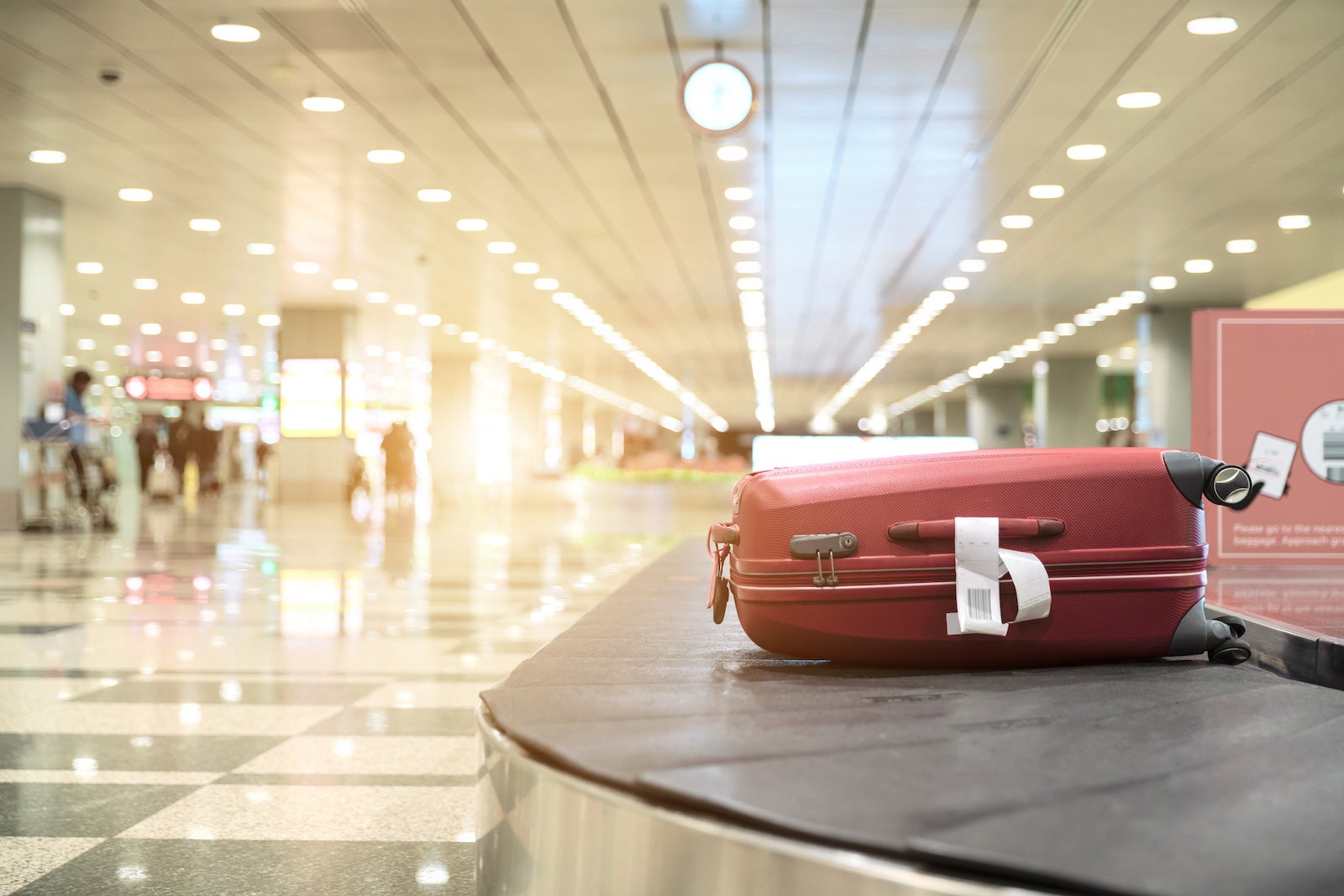
Note that this coverage is in excess of what's provided by your carrier, and you must report the baggage delay to your carrier for the benefit to apply.
Related: Best credit cards that offer delayed baggage insurance
Lost luggage reimbursement
Lost luggage reimbursement can cover the cost of repairing or replacing items that are lost, damaged or stolen. Coverage applies to checked and carry-on baggage during a trip for which you used your card to pay at least part of the cost. Both cards have a maximum benefit of up to $3,000 per covered person per trip.
Note that both cards include a sub-limit of up to $500 for jewelry and watches and a $500 limit for cameras and electronic equipment. You should also be aware that coverage does not extend to items you accidentally forgot or left behind.
If your claim applies to checked luggage, you must report it to the common carrier within the carrier's mandatory time frame. For carry-on baggage, you must report the situation to the carrier as soon as you exit the plane, bus or ship.
Related: Lost vs. delayed baggage: How are they different and how do you protect yourself?
Trip delay reimbursement
Trip delay insurance reimburses you for reasonable expenses resulting from an extended delay with a common carrier. The terms are a bit loose when defining "reasonable expenses," but eligible purchases include:

Here's what each card offers:
- Chase Sapphire Preferred : Up to $500 per ticket (triggers after a twelve-hour or overnight delay)
- Chase Sapphire Reserve : Up to $500 per ticket (triggers after a six-hour or overnight delay)
The Chase Sapphire Reserve wins this category handily. The ability to be reimbursed for $500 in "reasonable" purchases just six hours into a delay is fantastic and one of the most generous travel perks of any card on the market.
Related: Best credit cards for trip delay reimbursement
Purchase protection
Purchase protection covers you from theft, accidental damage or involuntary and accidental parting with your eligible purchase. Your item may be replaced or repaired if at least a portion of your purchase was charged using a card that offers this benefit — such as the Sapphire Reserve or Sapphire Preferred.
- Chase Sapphire Preferred : Up to the cost of the item or up to $500 per claim, up to $50,000 per account (incident must occur within 120 days from the date of purchase)
- Chase Sapphire Reserve : Up to the cost of the item or up to $10,000 per claim, up to $50,000 per year (incident must occur within 120 days from the date of purchase)
You should also note there are items not eligible for coverage, which can be found in your benefits guide.
Again, the Chase Sapphire Reserve wins hands-down. Hopefully, you won't need this perk often, but if you're planning to buy a costly item, the Chase Sapphire Reserve is the way to go.
Related: Best credit cards for purchase protection
Extended warranty protection
Extended warranty protection lengthens the original warranty on eligible products. It does not augment the protection you get; it only extends the expiration of the coverage.
The extended warranty terms from both cards are the same: one additional year on eligible warranties of three years or less, up to a maximum of $10,000 per claim and $50,000 per account.
Certain purchase types are not covered, and you'll need to either register your warranty or keep the original receipt and credit card statement showing the purchase. One of these is required for submitting a claim during the extended warranty period.
Related: Best credit cards for extended warranty protection
Primary rental car insurance
Credit card primary rental car insurance saves you from paying for the in-house insurance offered by the rental car agency.
This insurance, according to the benefit terms, covers you from "theft, damage, valid loss-of-use charges imposed and substantiated by the auto rental company, administrative fees and reasonable and customary towing charges (due to covered theft or damage) to the nearest qualified repair facility." You can simply decline the rental agency's CDW waiver and pay for your rental with your eligible card to enjoy these benefits.

Only rentals of 31 consecutive days or less qualify. Also, not all cars are covered. Examples of some that Chase refuses to cover are:
- High-value vehicles
- Exotic and antique cars
- Cargo vans, vehicles with open cargo beds or trucks other than pick-up trucks
- Motorcycles, mopeds or motorbikes
- Recreational vehicles
- Passenger vans with seating for more than nine people
Both the Chase Sapphire Preferred and Chase Sapphire Reserve offer primary rental car insurance:
- Chase Sapphire Preferred : Up to the actual cash value of most rented cars
- Chase Sapphire Reserve : Up to $75,000
Note that this coverage in no way covers damage to property other than your rental car. If you crash into another car, Chase will not cover damage to the other party's property. Coverage also does not apply to personal liability, loss of personal property in the vehicle or damage that occurred due to wreckless or off-road driving.
However, additional drivers listed on the rental are also covered under this protection.
Related: Best credit cards for primary rental car coverage
Roadside assistance
If you experience problems while driving and need assistance like towing or someone to help you get into the car when you're locked out, Sapphire cardholders can call for these services any time of day on any day of the year. However, the costs involved can be different.
- Chase Sapphire Preferred : Cardholders pay for services they receive, but Roadside Dispatch program can help to coordinate services. Cardholders call 800-847-2869; service is available in the U.S. only
- Chase Sapphire Reserve : Events covered to a maximum of $50 each, up to four events per year. Cardholders can only receive service for the same problem once during a seven-day period. Cardholders can call 866-860-7978 in the U.S. or Canada

Available roadside assistance services include towing, changing tires, jump start, lockout service, fuel delivery and winching to pull your car out of a place where it's stuck. Cardholders do not need to enroll for this benefit in advance.
Travel accident insurance
Should something go wrong during your trip, travel accident insurance provides coverage for a range of accidental losses, including limb, sight, speech or hearing. This benefit can also cover accidental loss of life, paid out to your beneficiary.
- Chase Sapphire Preferred : Up to $500,000 for losses when traveling on a common carrier and up to $100,000 for 24-hour coverage
- Chase Sapphire Reserve : Up to $1 million for losses when traveling on a common carrier and up to $100,000 for 24-hour coverage
It's worth noting that certain high-risk events are not covered. These include training as a pilot, committing any crime, participating in professional sports, racing a car or motorcycle, intentionally self-inflected injuries or parachuting. For trips lasting more than 30 days, coverage ends at 12:01 a.m. on the 31st day.
Sapphire Reserve-specific benefits
There are two additional travel-related benefits that are available on the Sapphire Reserve but not the Sapphire Preferred . These are the emergency evacuation and transportation benefit and the emergency medical and dental coverage.
Emergency evacuation and transportation coverage can cover up to $100,000 in expenses when you or an eligible family member becomes ill or injured during a trip and needs transportation to a suitable medical facility. Note that this benefit requires preapproval from the benefit administrator; otherwise, you will bear the costs of this transportation.
Sapphire Reserve cardholders also enjoy up to $2,500 in emergency medical or dental coverage when traveling. You may also qualify for up to $75 per day for up to five days toward the cost of a hotel room if you must spend more time recuperating after release from the hospital before you are able to travel home. There is a $50 deductible on the emergency medical and dental coverage.
Bottom line
The Chase Sapphire Preferred Card and the Chase Sapphire Reserve offer many of the same travel and purchase insurance protections, though some coverage levels are different. The disparity isn't as vast as you might think, considering their difference in annual fees.
While the Chase Sapphire Reserve is clearly the better card with its superior trip delay insurance and purchase protection, the Chase Sapphire Preferred matches the Reserve in many other categories and is respectable across the board.
Read our post on the Chase Sapphire Preferred vs. Sapphire Reserve to see a concise side-by-side comparison of all other card benefits.
Apply here: Chase Sapphire Preferred with a bonus of 75,000 points after you spend $4,000 on purchases in the first three months from account opening. Apply here: Chase Sapphire Reserve with a bonus of 75,000 bonus points after you spend $4,000 on purchases in the first three months from account opening.
- Search Please fill out this field.
- Manage Your Subscription
- Give a Gift Subscription
- Newsletters
- Sweepstakes
This Is the Most Popular Country to Retire in for U.S. Expats — With Low Taxes, Affordable Housing, and Idyllic Weather
Investopedia ranked the most popular countries for expats, and the data showed that most U.S. citizens chose to settle in Mexico.
:max_bytes(150000):strip_icc():format(webp)/Dobrina-Zhekova-2885480a814f40a2801fda922af4d135.jpeg)
Itzel Garrido/Travel + Leisure
Among the benefits of retiring abroad are the change of scenery, the opportunity to experience new cultures, and the lower cost of living. And many Americans — about half a million, according to the Social Security Administration — choose to pack up and spend their golden years in a different country.
Investopedia ranked the most popular countries for expats , and their data showed that most U.S. citizens chose to settle in our southern neighbor, Mexico, as it offers warm weather, affordable housing, a variety of small towns and cities, and convenient access to the U.S.
Mexico also has a much lower cost of living — about 21 percent, with healthcare a whopping 60 percent cheaper than in our country.
Another benefit to moving south of the border is that housing in certain areas can also come with a much more affordable price tag. While homes in popular vacation destinations like the Riviera Maya and Cabo San Lucas may cost millions, in other areas like Aguascalientes , a city in Central Mexico, retirees need about $900 — and that number includes rent — to cover their monthly expenses. And in San Miguel de Allende , which is famous for its food scene, a couple could live on less than $2,000, according to a recent report by U.S. News .
Of course, retiring abroad also requires careful financial planning, including looking into that country's income tax. (Moving abroad doesn't exclude you from paying taxes in the U.S.) According to Investopedia, Mexico has the lowest personal income tax out of the ten most popular countries for expats — 3.7 percent, compared to the GDP. Property taxes are also just 0.3 percent.
For many, residing legally in Mexico is also an issue. American citizens can stay in the country for up to 180 days with no visa, and those who plan to live there full-time can apply for a Mexican Retirement Visa or Mexican Permanent Resident Card, which requires a monthly income of at least $1,415. Expats who reside in Mexico for five or more years are also eligible for citizenship.
Canada and the United Kingdom are the second and third most popular countries for expats on Investopedia's list. However, in Canada, housing prices are slightly higher than in the U.S., while in the U.K., home values are almost 20 percent lower. Healthcare costs are also much lower in Canada and the U.K. However, income tax in both countries is only slightly lower than in the U.S.
You can see the full list of countries on investopedia.com .
Related Articles

IMAGES
VIDEO
COMMENTS
International travelers visiting the United States can apply for or retrieve their I-94 admission number/record (which is proof of legal visitor status) as well as retrieve a limited travel history of their U.S. arrivals and departures. Apply For New I-94 (Land Border/Selected Ferry. Travelers Only) Get Most Recent I-94. View Travel History.
Release Date. Wed, 04/30/2014. Customs and Border Protection launched a new webpage on May 1 that offers nonimmigrant U.S. visitors access to their I-94 arrival/departure record and their arrival/departure history. The new CBP webpage allows nonimmigrant travelers to access arrival/departure records going back five years from the request date.
Here are 7 tips to help you do so: 1. Visit visa-free countries or those that offer evisas or a visa on arrival. A good first step to building a strong travel history is to invest in travel to visa-free countries or those that give you a visa on arrival or an evisa. It is even better when the country places a visa sticker in your passport ...
Foreign visitors to the U.S. no longer need to complete paper Customs and Border Protection Form I-94 Arrival/Departure Record or Form I-94W Nonimmigrant Visa Waiver Arrival/Departure Record. Those who need to prove their legal-visitor status—to employers, schools/universities or government agencies—can access their CBP arrival/departure record information online.
Extending their stay. The purpose of Form I-94 is to communicate the terms of a foreign national's visit to the United States. It indicates information such as admission category and the expected departure date. But it also serves as proof of a non-citizen's lawful entry to the U.S.
Obtaining a copy of your I-94 travel record is also free if you entered the United States after April 2013. For earlier records, you can request a copy by submitting Form I-102 (officially called the "Application for Replacement/Initial Nonimmigrant Arrival-Departure Document") and paying a $560 filing fee. While an I-94 travel record is ...
The visitor must exit the U.S. on or before the departure date stamped on the Form I-94. This is the "Admit Until Date" on the electronic Form I-94. The Form I-94 number also is known as the Departure Number or Admission Record Number. As of April 30, 2013, most Arrival and/or Departure records are created electronically upon arrival.
CBP Mobile App Directory. If you are a lawful permanent resident, you may be eligible to become a U.S. citizen after five years of becoming a lawful permanent resident, or three years if you are married to a U.S. citizen. More information on the naturalization process and available citizenship materials can be found at the Citizenship Resource ...
Travel entails wishful thinking. It demands a leap of faith, and of imagination, to board a plane for some faraway land, hoping, wishing, for a taste of the ineffable. Travel is one of the few ...
Global Entry can help you clear customs in a matter of minutes — sometimes before even physically reentering the U.S., if you're departing from pre-clearance locations in places like Canada. The process of becoming a Global Entry member can be cumbersome due to the difficulty of securing an in-person appointment.
Getting away from home and stepping outside of your usual routine is beneficial for both mind and body. The long-lasting personal benefits of visiting a foreign country far outweigh the costs and time to get there. The great travel writer Pico Lyer said: "Travel is not really about leaving our homes, but leaving our habits."
3. Travel Helps Reduce Stress and Anxiety. In a recent study, researchers found that travel can help to reduce stress and anxiety. During the study, a group of middle managers was sent on a short vacation (4 nights) in a hotel. This had an immediate effect on their reported levels of stress levels.
A Smithsonian Magazine Contributing Writer, Tony Perrottet is the author of five travel and history books, including Pagan Holiday: On the Trail of Ancient Roman Tourists and The Sinner's Grand ...
Men who do not take an annual vacation show a 20 percent higher risk of death and 30 percent greater risk of heart disease. 2. Travel Relieves Stress. Although missing a connecting flight or ...
In a 2018 Harris Poll of 1,300 business travelers, 87 percent said that business trips helped them to be more empathetic to others, reports Quartz. And in a 2010 study, Columbia Business School ...
Benefits of Slow Travel. There are many benefits to slow travel, both for the individual traveler and the destination they're visiting. Let's have a look: Benefits for the Traveler. Deeper Cultural Understanding: Slow travel allows you to immerse yourself in your destination's culture and lifestyle in a way that's not usually possible ...
The Health Benefits of Travelling: Travelling Improves Your Health and Mind. Improving your well-being is one of the fundamental benefits of travelling. Travelling helps to decrease the risks of heart attack and anxiety, while developing our brain health. There have been studies proving that travel can place a positive impact on our heart health.
1952: a golden age of air travel is born as BOAC goes commercial. By the 1950s, aviation had come a long way from The Wright Brothers' Flying Machine. The British Overseas Airways Corporation made another world first: a commercial jet service, designed by British engineer Geoffrey de Havilland. Enter a golden age of air travel.
Travel history tells about all the recent visits of passport holder such as where he/she travel or when he/she travel. A good travel history helps a lot to get visa approvals for developed countries like as USA, Canada and, United Kingdom. Travel history is not an essential or required document/condition for obtaining a visa, but if you made a ...
Benefits of booking travel in Chase's portal Let's say you have a premium card like Chase Sapphire Reserve® . It earns 5x points per $1 when booking flights through the portal.
Plus, travel can provide an opportunity for self-discovery and personal growth, leading to increased self-esteem and confidence. 3. Increased Appreciation. Appreciation is one of the top benefits of travel. Traveling can create memories and experiences that enhance one's recognization and enjoyment of life and foster a deeper sense of gratitude.
Our top picks for the best senior travel insurance. Best overall: Allianz Travel Insurance. Best for expensive trips: John Hancock Travel Insurance. Best for exotic trips: World Nomads Travel ...
She described ecotourism as, "Responsible travel to natural areas that conserves the environment and improves the well-being of local people.". In simple words, the meaning of ecotourism is travel that makes a positive impact on both the ECO logy and ECO nomy of a given destination. One mistake many people make is assuming that ecotourism ...
Travel accident insurance: accidental death or dismemberment coverage of up to $100,000 (up to $1,000,000 for common carrier travel). Emergency medical and dental benefits: up to $2,500 for ...
The Chase Sapphire Preferred® Card is one of the most popular travel rewards cards out there and comes with several well-known benefits, as well as a 75,000-point bonus when you spend $4,000 on purchases within the first three months of account opening — all for a $95 annual fee. But what are some of the lesser-known benefits of the super ...
But many of their benefits are very different. And they should be. The Chase Sapphire Preferred comes with a $95 annual fee, while the Chase Sapphire Reserve has a $550 annual fee. Let's compare some of the most important perks of these two cards: travel and purchase protections.
With plans that include high-speed data and unlimited texting. Calls, including over Wi-Fi, are $.25/min. (no charge for Wi-Fi calls to U.S., Mexico, and Canada). Go5G plans: Up to 5GB high-speed data in 11 Central European countries; otherwise, standard speeds approximately 256Kbps.
Families choose their level of coverage when they purchase a travel insurance policy. A comprehensive policy is the safest option for all kinds of family travel because it provides well-rounded ...
International benefits and discounts on standard car rentals**. Book Hertz Now. AAA members can get discounted rates and benefits when renting with Dollar.^. Save up to 15% off the base rate on all Dollar rentals. Free AAA additional driver. Free use of one child safety seat. 10% off Prepaid Fuel. Book Dollar Now.
Investopedia ranked the most popular countries for expats, and the data showed that most U.S. citizens chose to settle in Mexico. Among the benefits of retiring abroad are the change of scenery ...